With hot springs, heritage attractions and honey stone Palladian architecture, Bath in the south west of England has been a magnet for visitors over the centuries. We bring you the best things to do in Bath, a UNESCO World Heritage Site, with Roman Baths, elegant Georgian buildings and many fine museums, parks and restaurants.
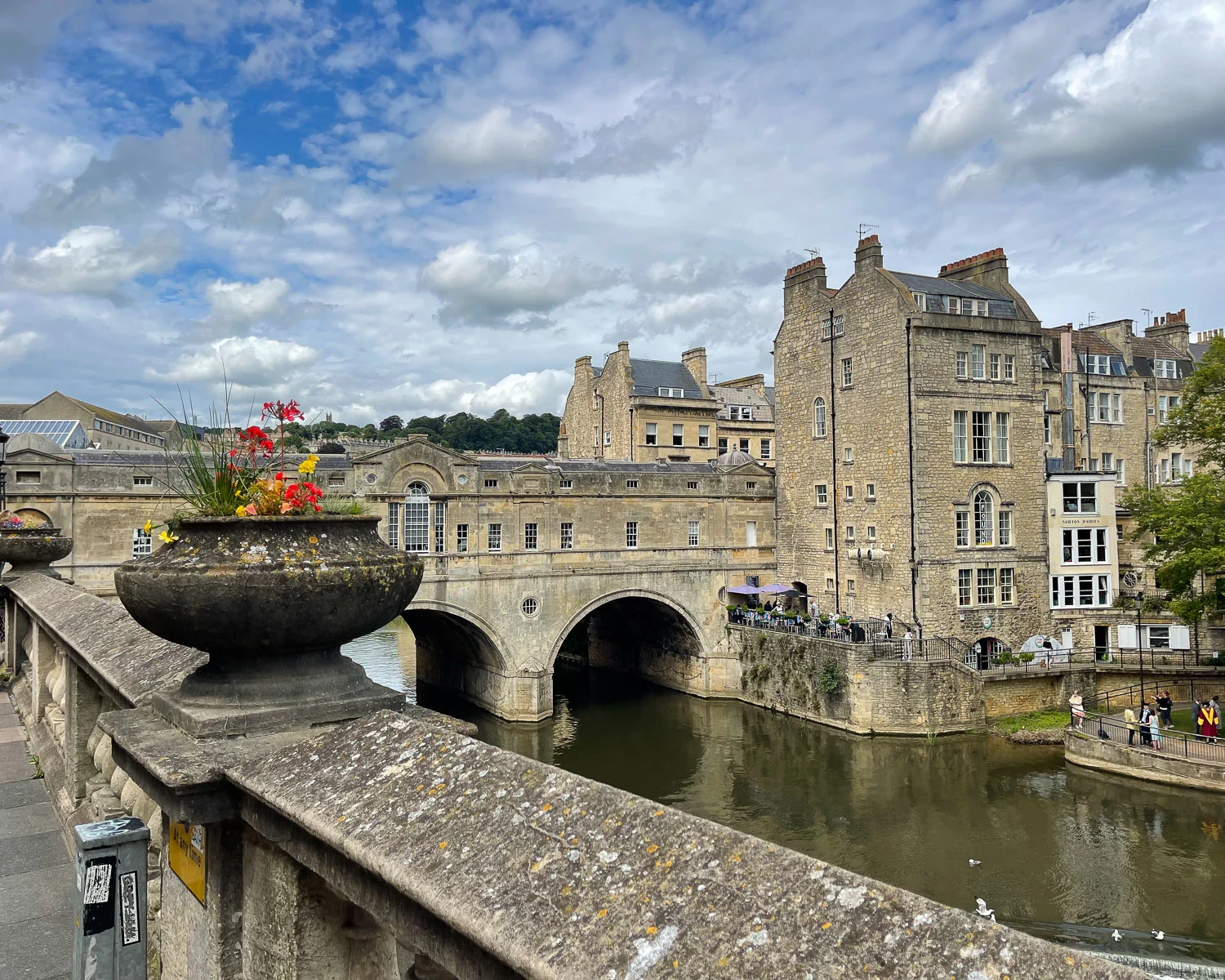
If it was good enough for the Romans pilgrims to Aquae Sulis or Georgian high society as depicted by Jane Austen and Bridgerton, there must be plenty to enjoy for any culture lover!
Since I live in nearby Bristol, I’ve visited this gorgeous heritage city on numerous occasions, to bring you the latest and most fun things to do in Bath.
This article may contain affiliate links that provide commission on purchases you make at no extra cost to you. As an Amazon Associate I earn from qualifying purchases.
Top things to do in Bath
While there’s plenty to keep you busy for a few days, here are the top places to visit in Bath if you’re short of time.
- Visit the Roman Baths and museum that bring alive the city in Roman times.
- Bathe in the waters of the thermal springs during a 2 hour session at the Thermae Bath Spa.
- Visit Bath Abbey, founded in Medieval time and climb the tower for views over the city.
- Dip into Georgian society portrayed in Jane Austen and Bridgerton at No 1 Royal Crescent, the Circus and other locations like the Assembly Rooms, Holburne Museum and Jane Austen Centre.
- Wander over Pulteney Bridge where you can take a boat tour on the River Avon or have a picnic by the river in the Parade Gardens.
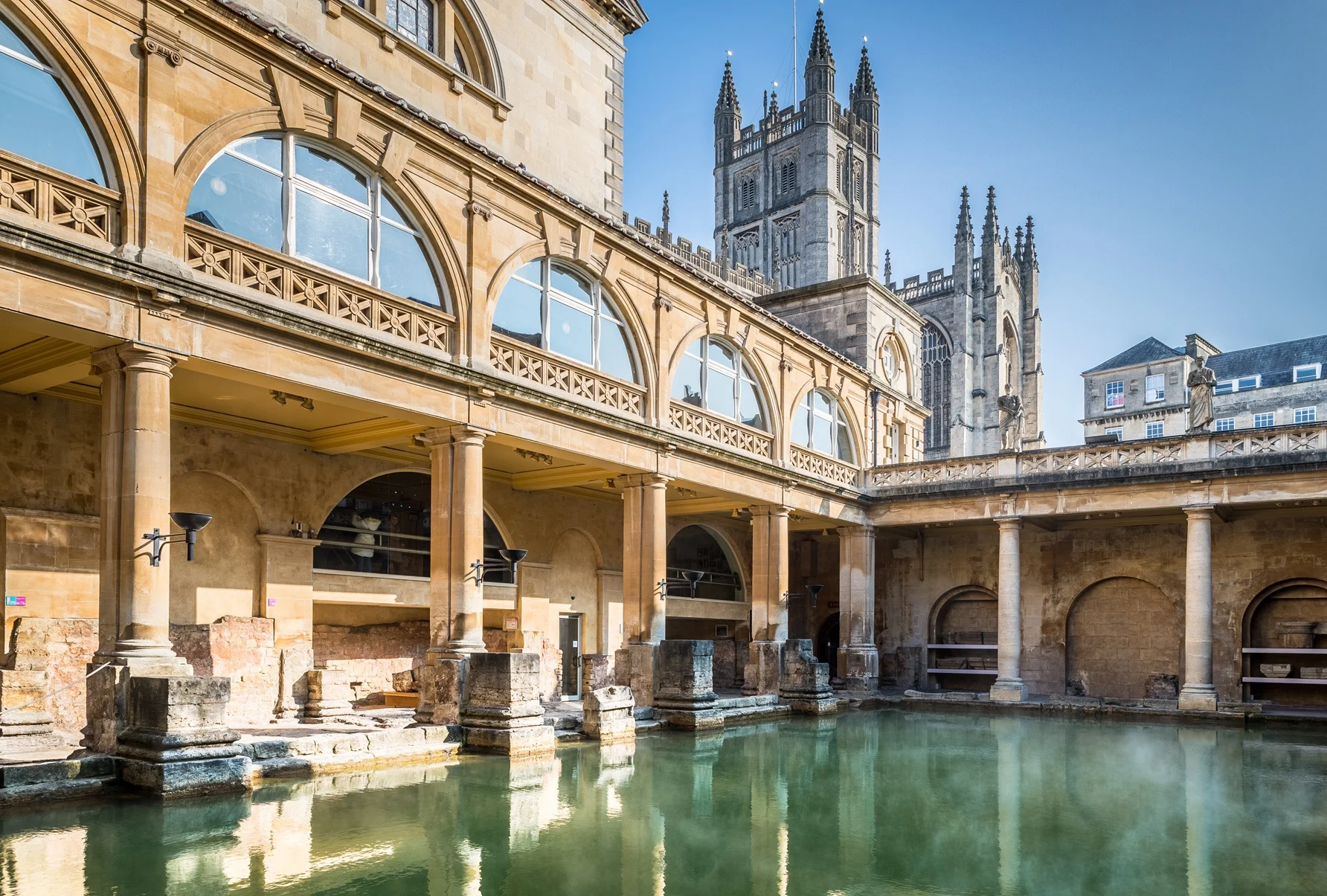
1. Roman Baths
The Roman Baths are Bath’s top tourist attraction, combining a re-creation of the original Roman bathing pools, with a museum that covers 2000 years of history.
During Roman times, the baths fed by hot springs were a cross between a public leisure centre and a place of devotion at the temple of the Goddess Sulis Minerva.
While the Roman Baths are now enclosed by Bath Abbey and rows of shops, they originally stretched over a much larger area beyond the surrounding buildings.
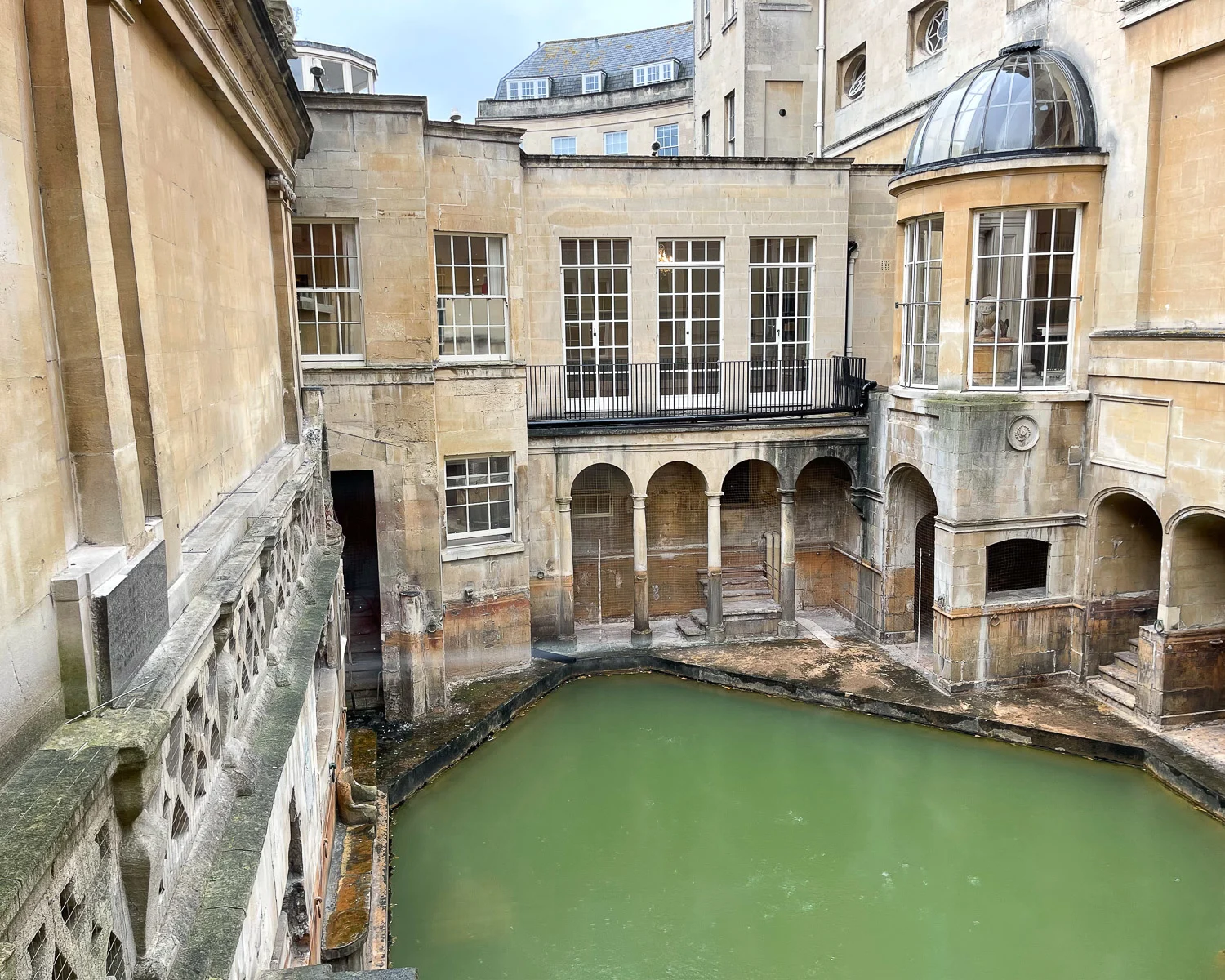
An audioguide is available to walk you round the baths and museum at your own pace, with explanations for children as well as adults.
You’ll see the spring water bubbling up in the original King’s Bath and the Great Baths, which were built in 1897 to show what the Roman Baths would have looked like.
Also on display are the archaeological remains of Roman changing rooms, plunge pools and gym, with video illustrations of what might have happened in each part of the baths.
Where to stay in Bath – discover the best hotels and neighbourhoods
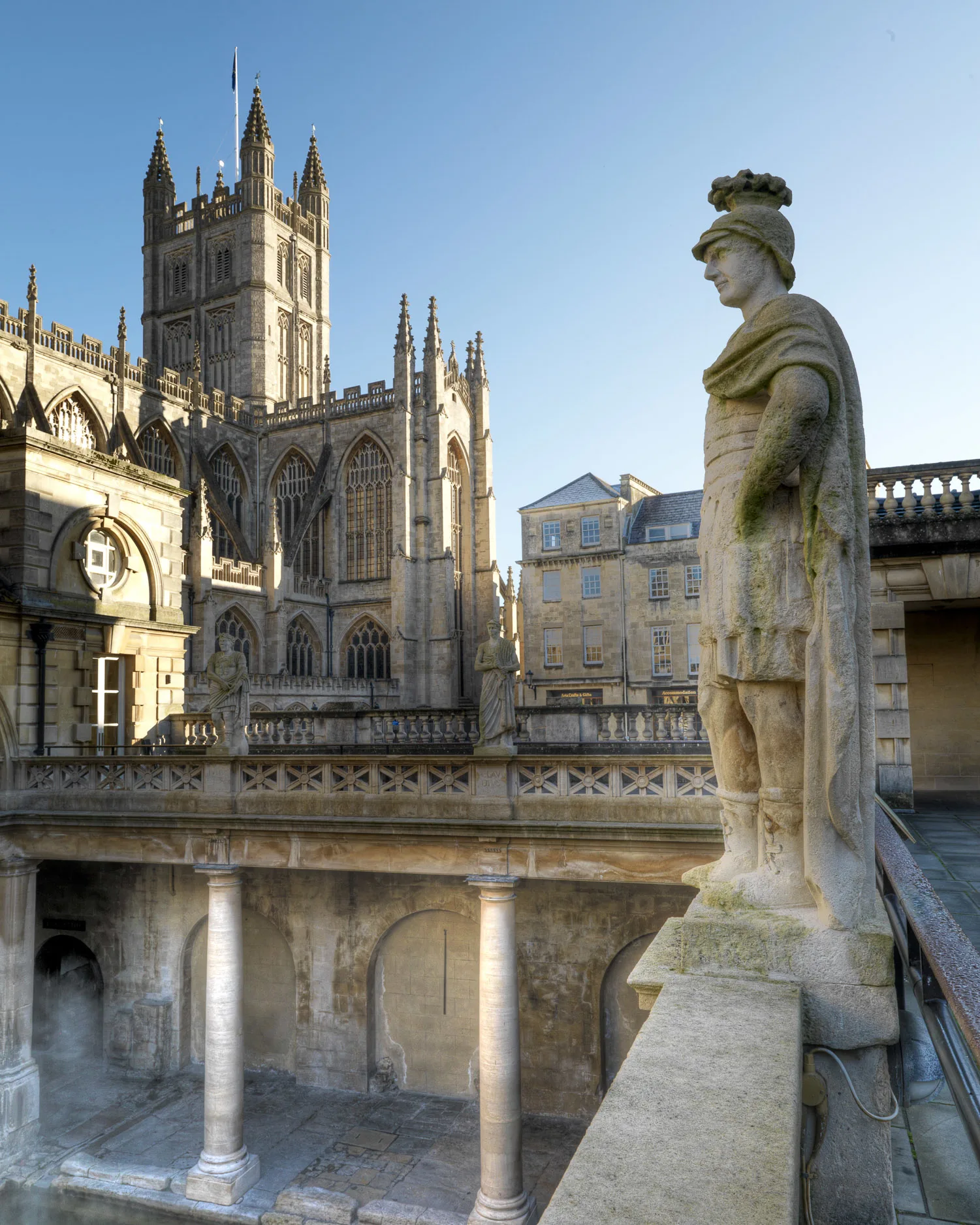
The Museum of the Roman Baths
Through the museum displays you can learn about life in the Roman town of Bath at the temple of the Goddess Sulis Minerva, whose golden head is on display. See the models of the temple and bath complex, with its impressive stone pediment and Gorgon’s head.
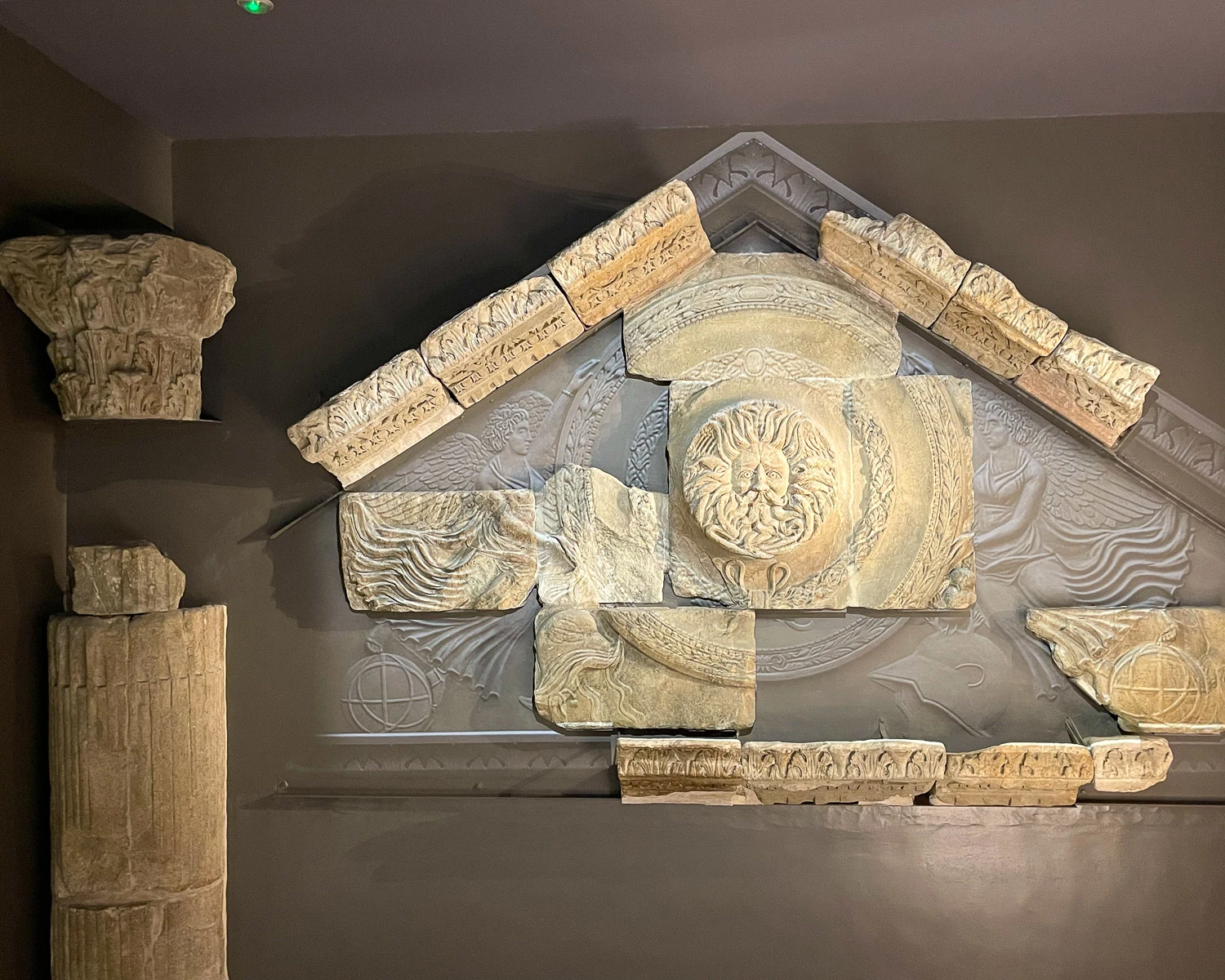
Walk around the spaces where everyday Romans bathed and threw their prayers to the Goddess into the spring, inscribed on clay tablets.
The museum and Roman Baths are presented in an interactive way, with different Roman characters projected onto the walls, and real life re-enactors sitting around to tell you their stories.
This is a world class attraction for all ages and one that you shouldn’t miss on your visit to Bath. At the end of your visit you can drink a cup of the mineral laden spa water, that fashionable Georgian society hoped would cure all their ills.
Why not book for lunch or afternoon tea at the elegant Pump Room restaurant, with classical music from a string ensemble?
This is Bath’s most popular attraction, so at holiday times and weekends it’s advisable to book tickets online in advance. This Bath City walking tour includes the option of entry to the Roman Baths, enabling you to skip the line (which can be quite long!).
Read my article: The Roman Baths in Bath – what to see when you visit
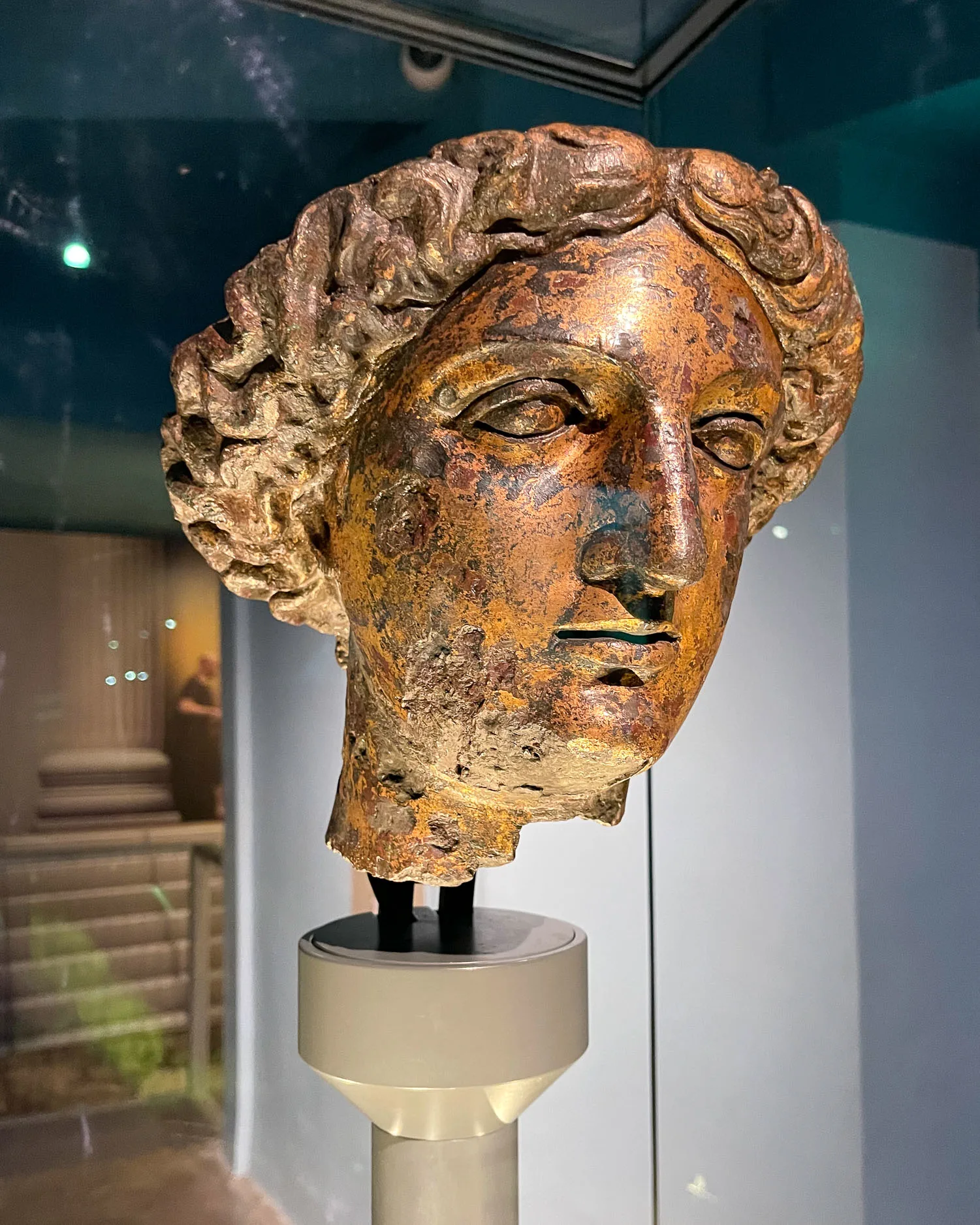
Open: Daily all year round. Opening hours: 9am – 6pm (variable with day and season)
Ticket Price: Standard adult ticket from £21.50
Website: Romanbaths.co.uk Address: Abbey Church Yard, Bath, BA1 1LZ
2. Bath Abbey
Bath Abbey, the city’s imposing cathedral, is located right beside the Roman Baths. The courtyard in front of the Abbey and Roman Baths is tourist central, with performances by musicians and street entertainers. There was a monastery on this spot from the 1st century AD, with the Abbey as we see it today being completed in the 15th century.
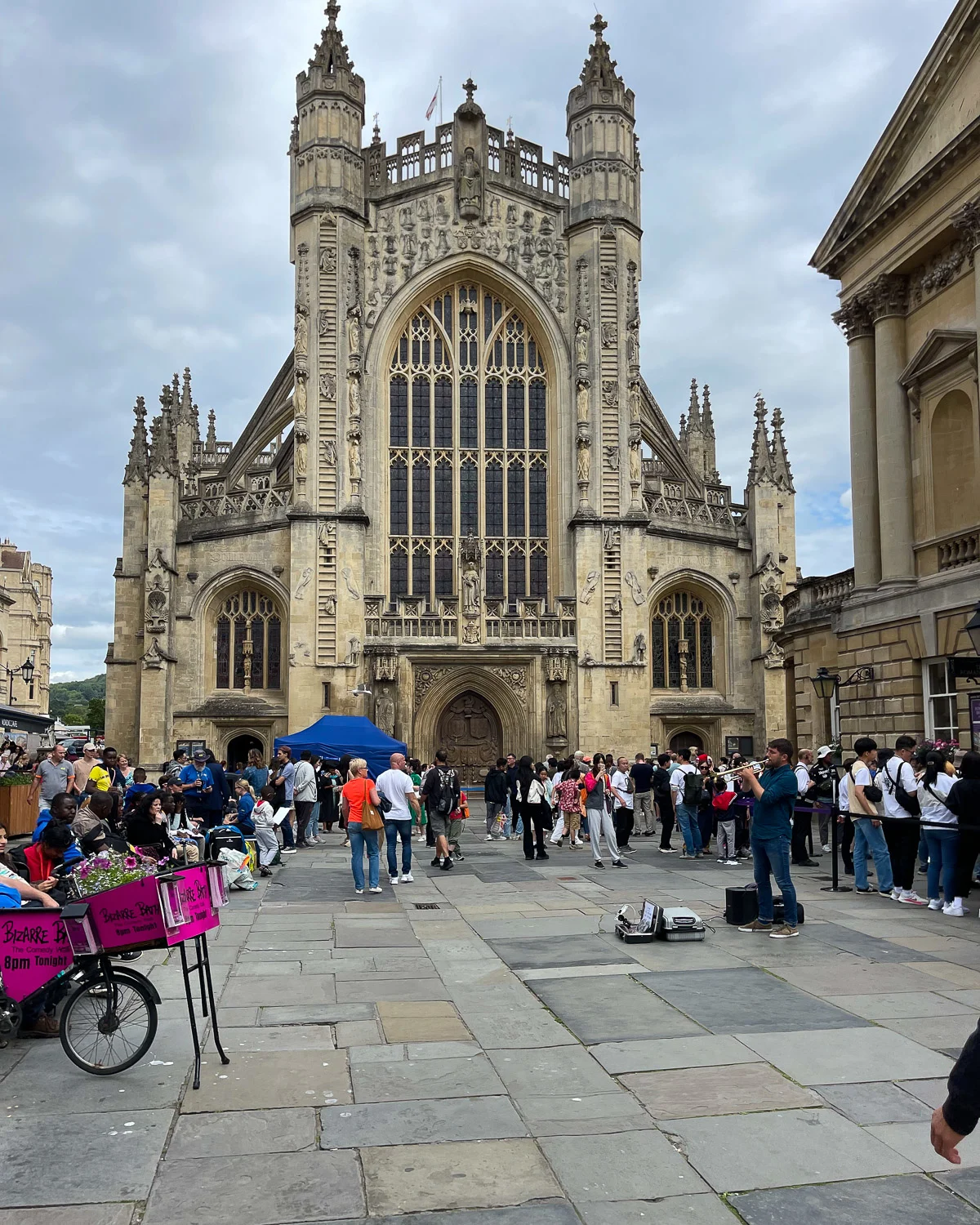
As one of the leading attractions in Bath, you’ll want to take a look at the beautiful stained glass, vaulted stone ceiling and tombs dating back to the 15th century. You could also join a tour to climb to the top of the tower and see the clock, bell tower and city views.
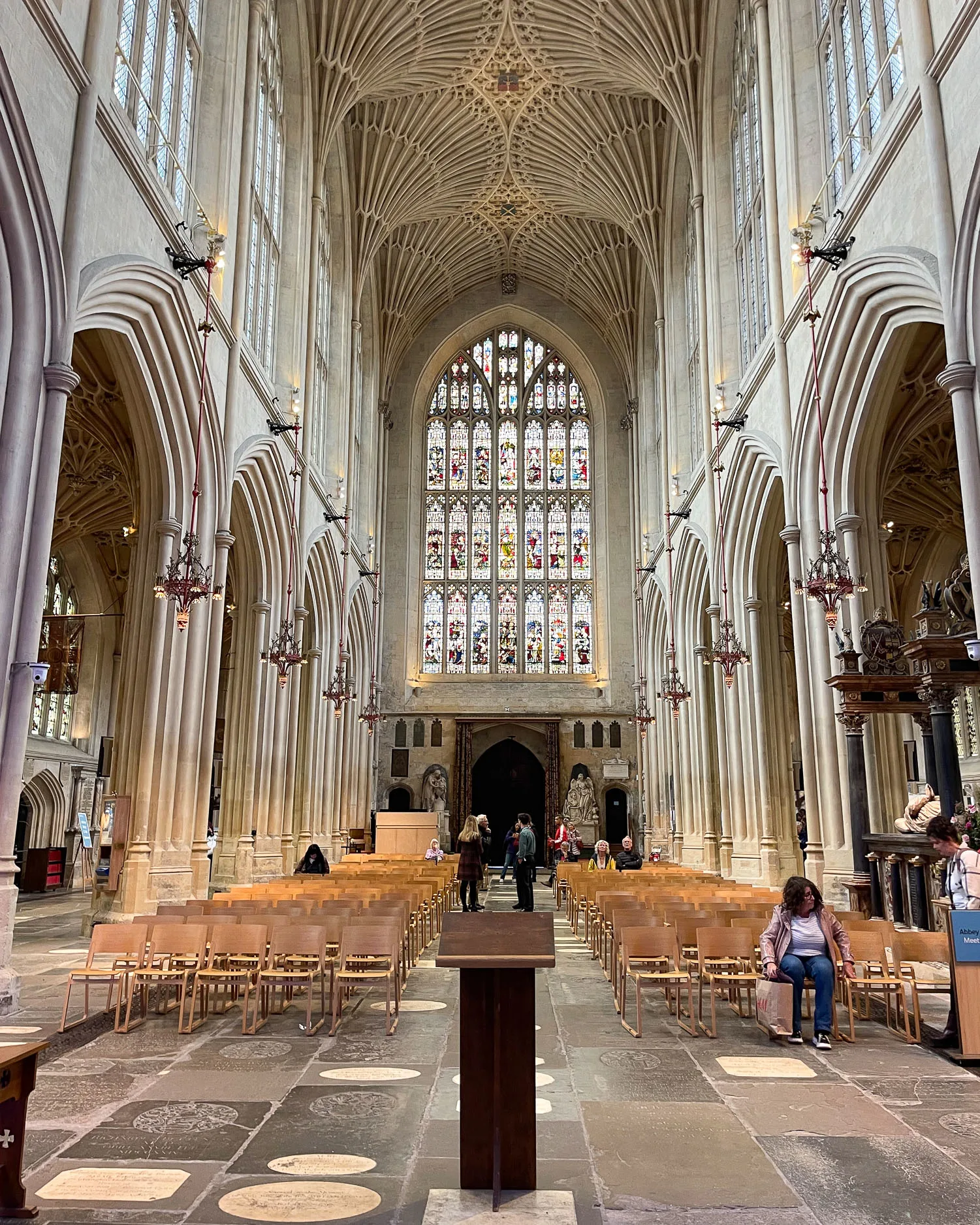
The Discovery Centre at Bath Abbey
Once you’ve visited the main church, head downstairs to the Discovery Centre, located in the crypt of Bath Abbey. On display are artefacts discovered in the Abbey that bring to life the history of the Medieval monastery. The Discovery Centre is family friendly, with plenty of videos, interactive exhibits and costumes, if you fancy dressing up as a monk.
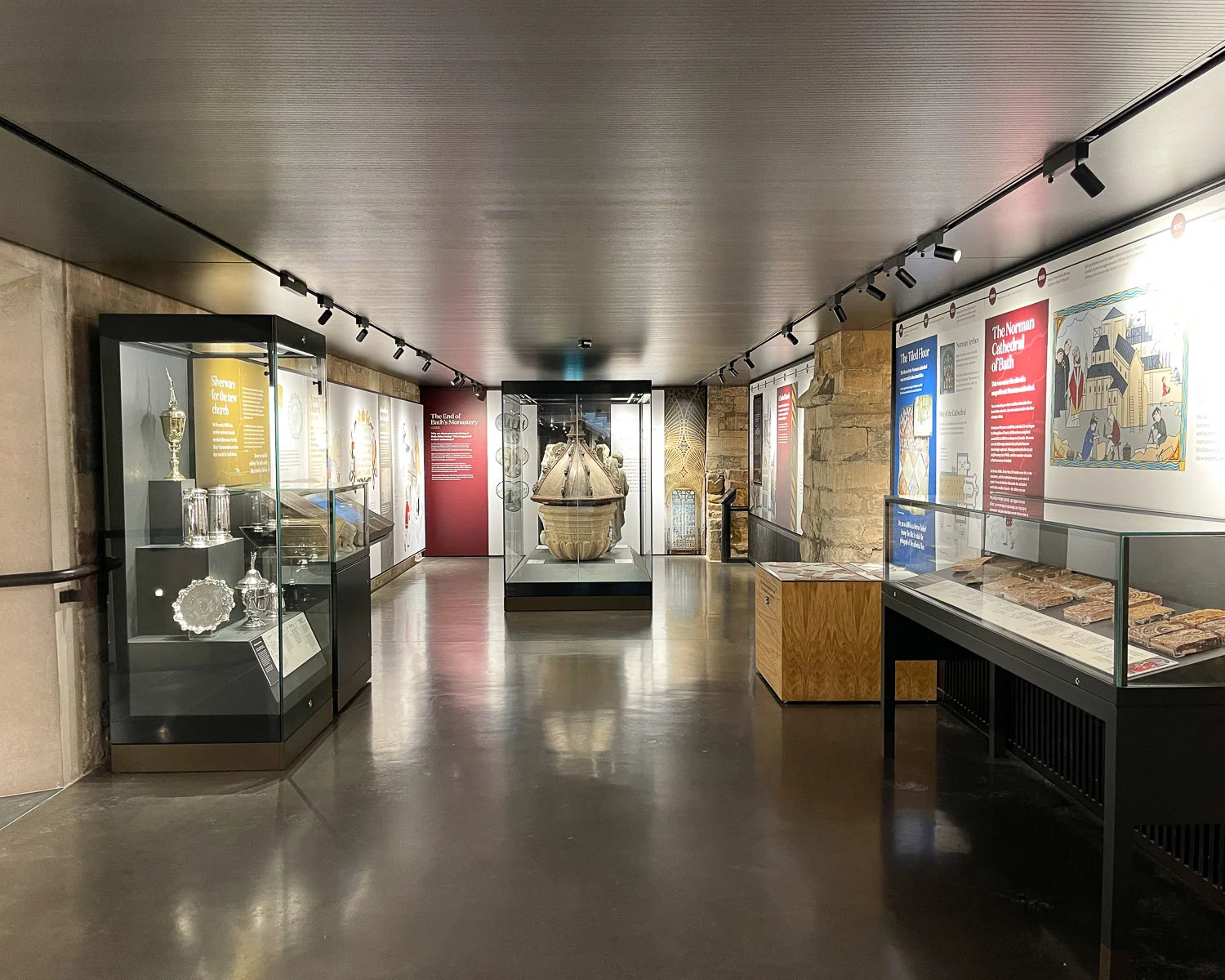
Open: Daily all year round. Opening hours: 10am – 5.30pm (closed during services and special events)
Ticket Price: Standard adult ticket from £7.50 (includes Abbey and Discovery Centre). You can buy your ticket in advance here.
Website: Bathabbey.org Address: Bath Abbey, Bath, BA1 1LT
Tip: Right beside the Abbey is the Bath World Heritage Centre, which is free to visit for information, city maps and self guided walking tours.
If you are short of time, you may enjoy this 2 hour guided walking tour of Bath, with explanations of the city’s history and major sights.
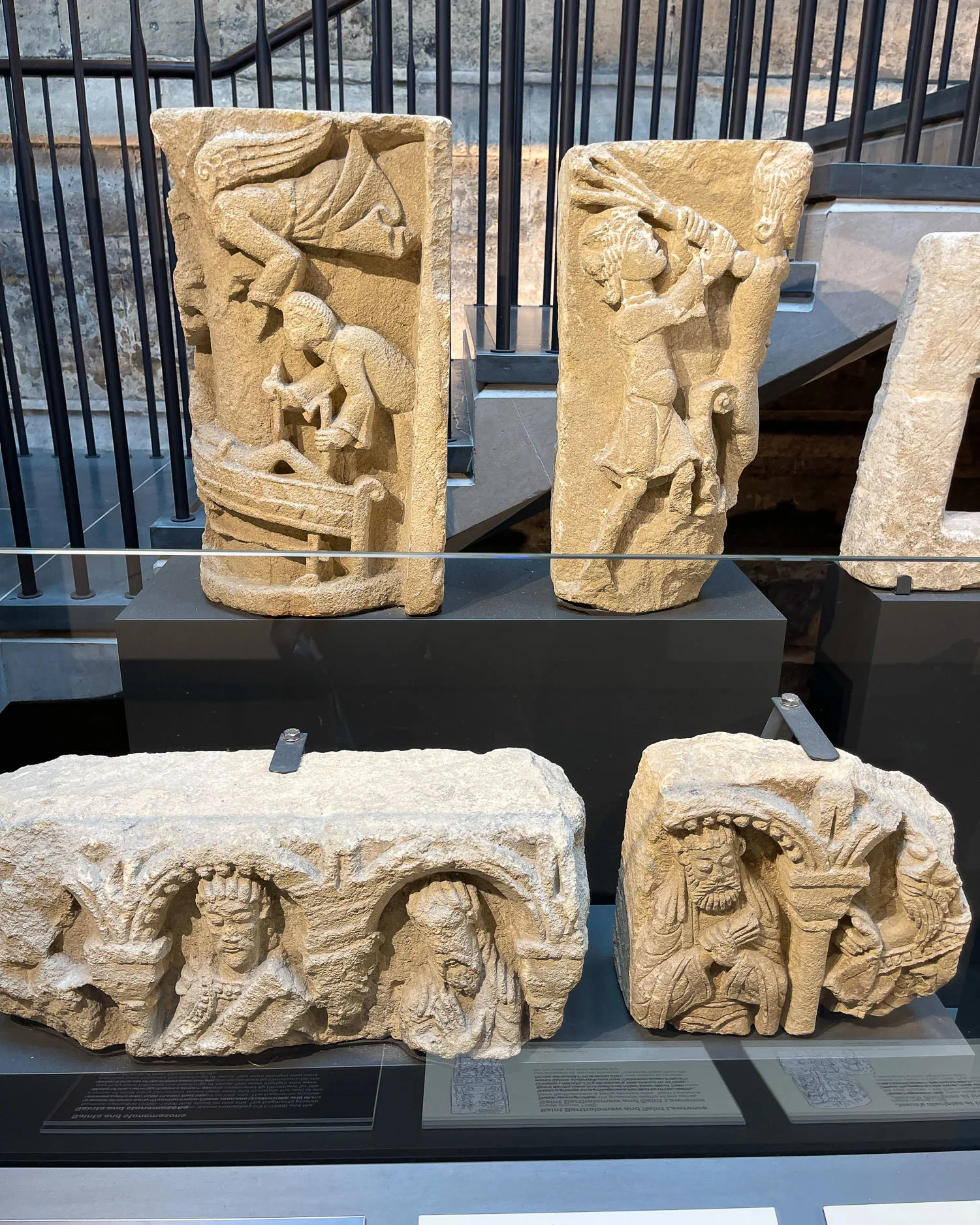
3. Thermae Bath Spa
This unique spa enables visitors to Bath to bathe in mineral waters fed from the original hot springs, that were considered by the Georgians to have healing properties.
The Thermae Bath Spa opened in 2006 after a complex redevelopment that included archaeological investigations, restoration of Georgian listed buildings and the construction of a modern glass spa building.
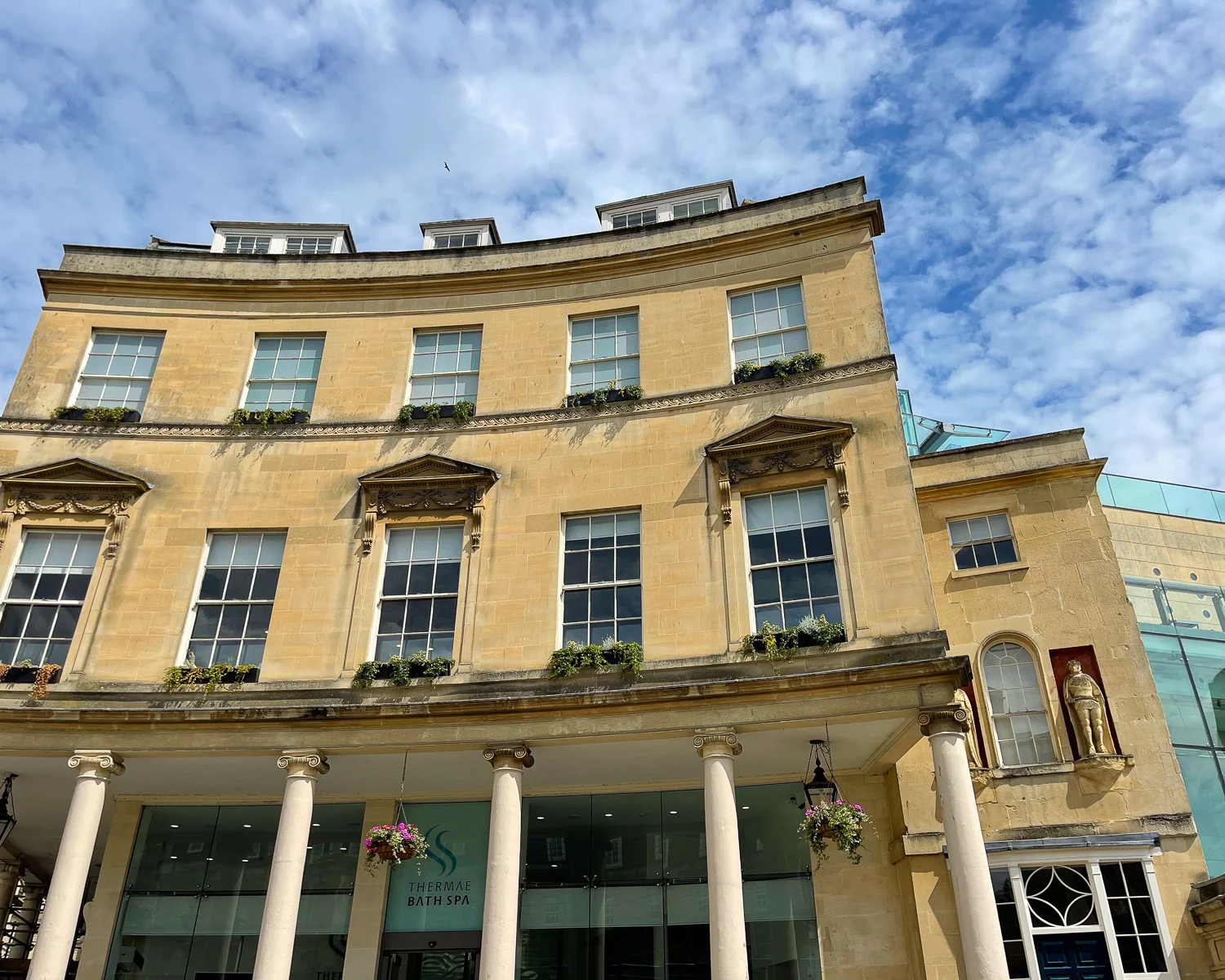
Highlights of the spa include:
- The Minerva Bath, a curving pool fed by the thermal waters, with whirlpool and jets
- A multi-sensory Wellness suite with ice chamber, infrared room, aroma steam rooms and relaxation areas
- Rooftop pool, with warm mineral waters where you can waft in the fresh air, with views over Bath’s rooftops
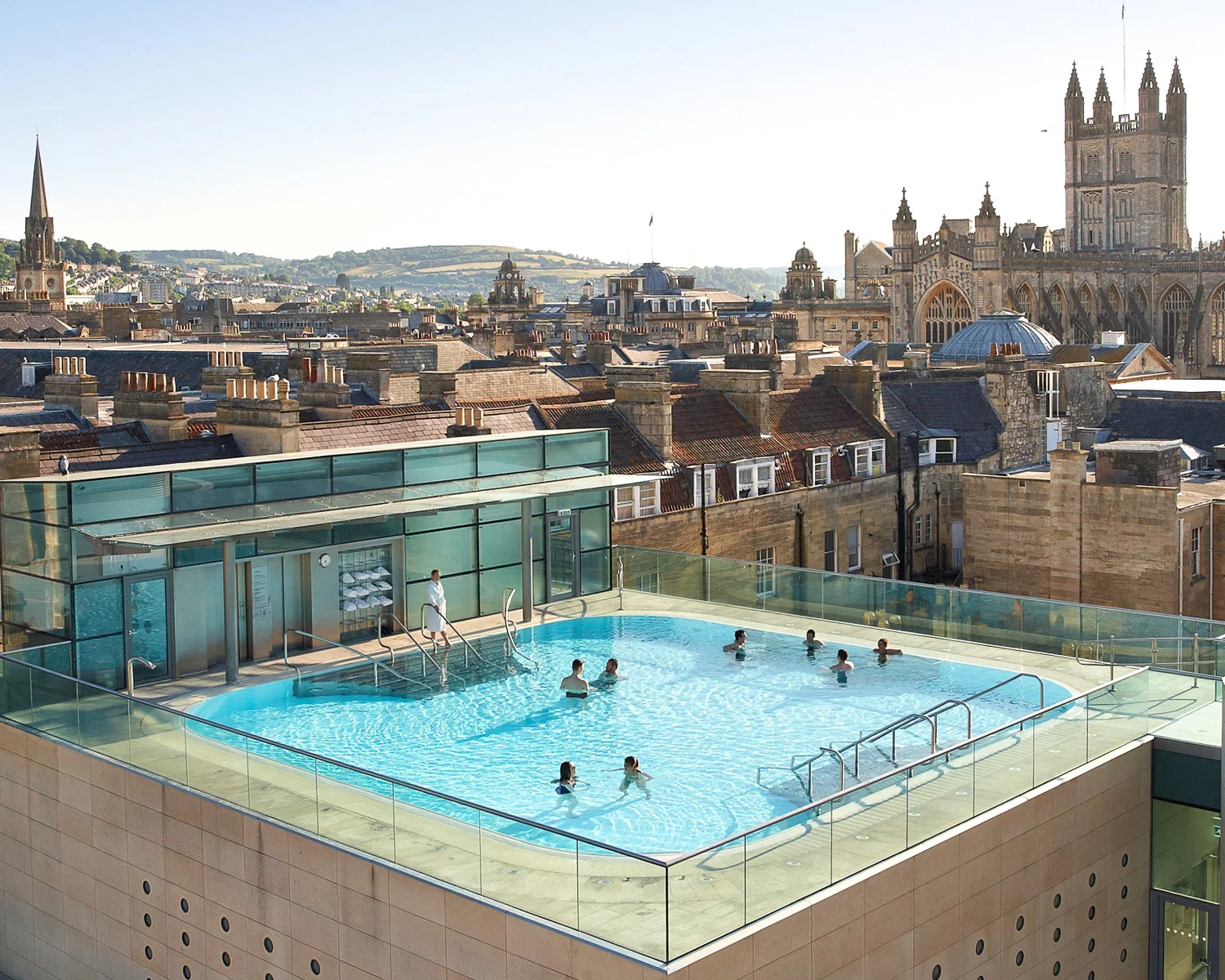
Visits to the Thermae Bath Spa are normally for a 2 hour session, with opportunity to book additional treatments if you wish. While the session is timed using your electronic wrist band, extra time allowed for changing, treatments and use of the cafe.
As the spa is very popular, it’s better to book your session online in advance, although some walk in sessions are available each day. There is also a small cafe, open for drinks and light dishes.
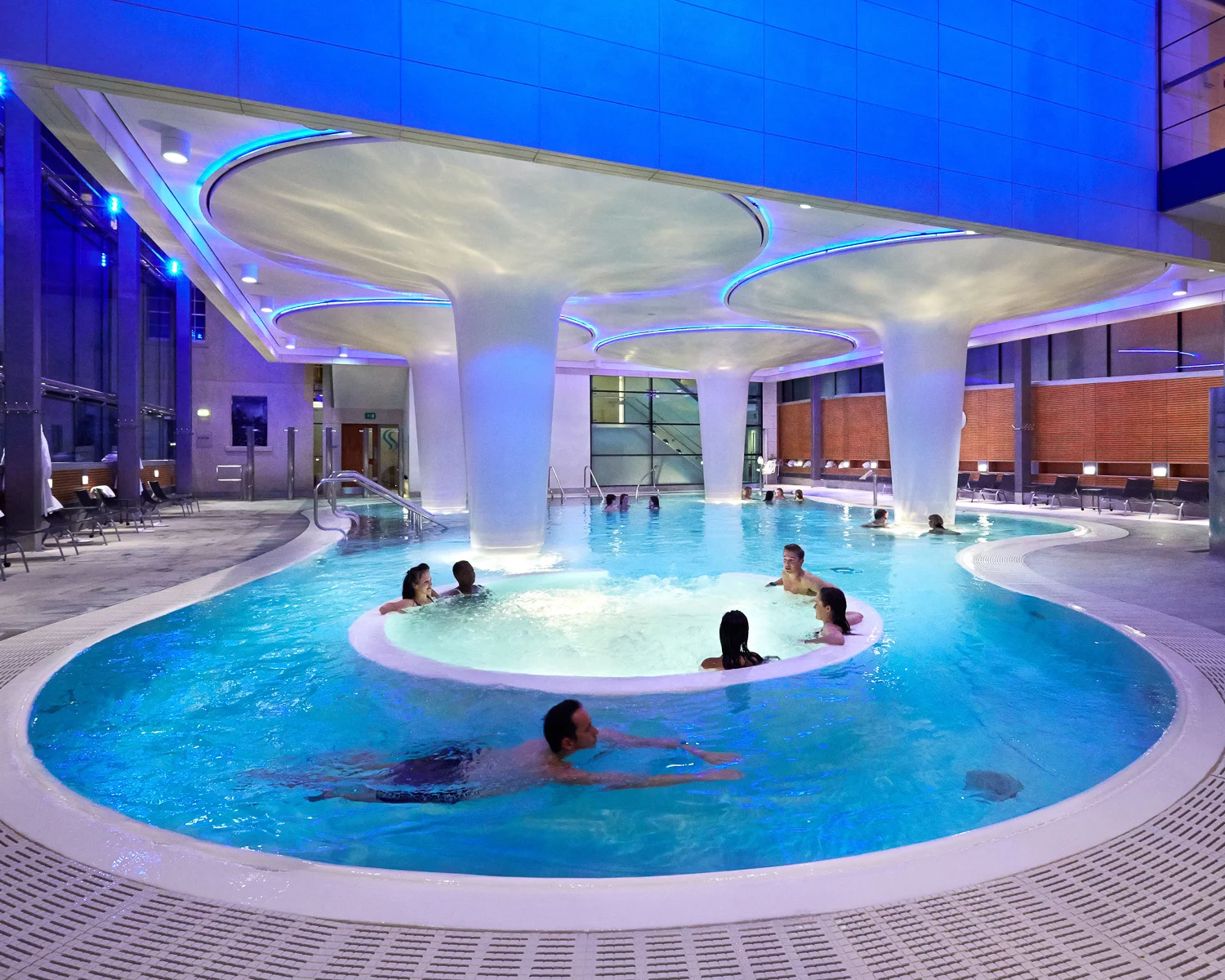
The Cross Bath
In a separate location near the Thermae Bath Spa is the Cross Bath. It’s a small enclosed open-air bath that’s also fed from the thermal spring water, and is one of the original Georgian baths.
You can book a session in the Cross Bath on the Thermae Bath Spa website and it is available for exclusive hire by small groups. The Cross Bath is located at the end of Bath Street, where you can glimpse the bath through a glass window.
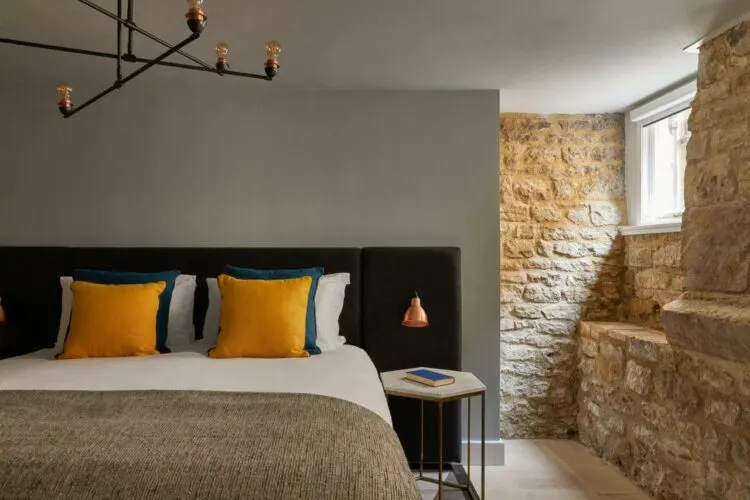
Hotel Indigo in Bath is a boutique style mid range hotel close to the sights
4. The Royal Crescent and Georgian Bath
Built in the 1770s, the Royal Crescent is a sweeping terrace of Georgian townhouses, overlooking Victoria Park. When first built, these houses would have overlooked parkland, so a haha or concealed ditch was built to keep sheep away from the houses.
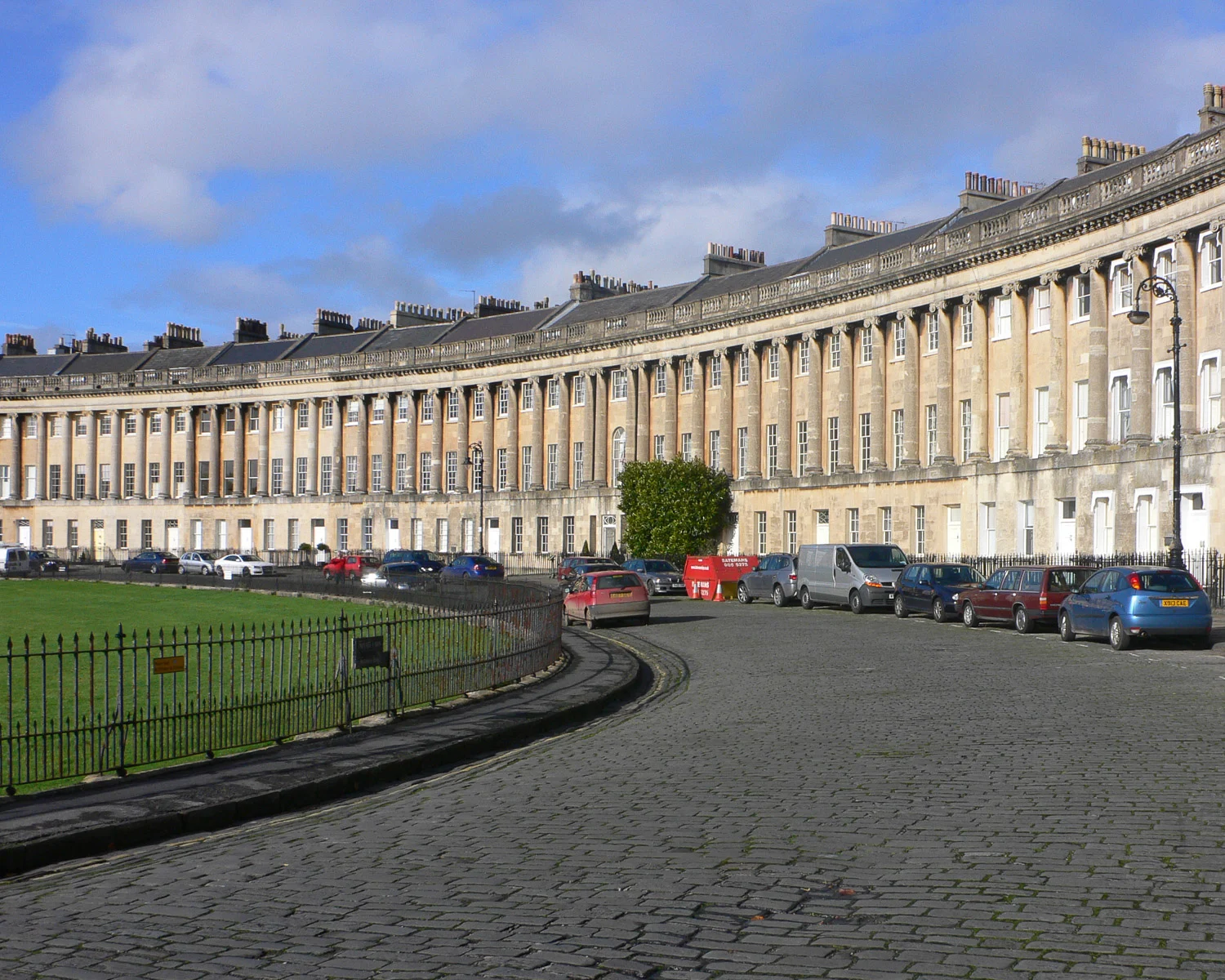
The idea behind Bath’s Palladian building style, was that wealthy visitors could rent somewhere just as grand as their own country mansions, while being a practical location to spend a social season in Bath.
Most of the houses on Royal Crescent are privately owned, but you may like to visit or even stay at the 5 star Royal Crescent Hotel & Spa at No 15, which offers lunch or afternoon tea in their gardens.
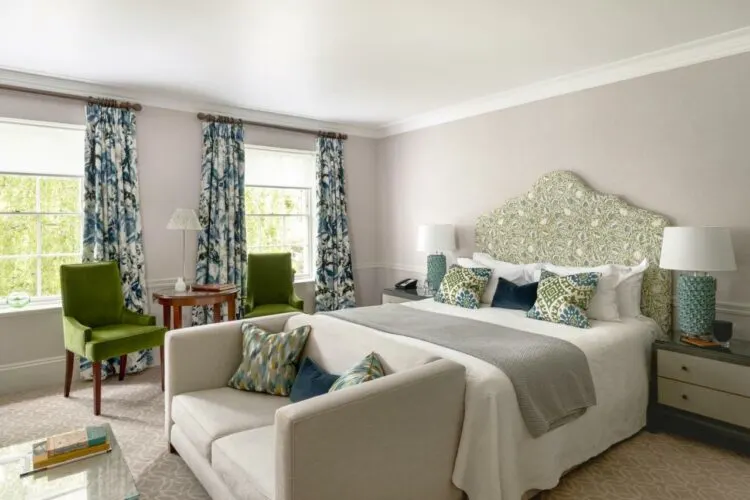
The Royal Crescent Hotel & Spa is Bath’s ultimate 5 star luxury stay in the heart of the Georgian Royal Crescent
It’s also worth walking down Brock Street to The Circus, which is a similarly grand ring of Palladian style houses, built around a circle with a large plane tree in the centre.
From here, continue your walk to see the nearby Assembly Rooms (open by the National Trust for pre-booked tours), used as a place for balls and parties in Georgian times.
No 1 Royal Crescent
At one end of the Royal Crescent, is a museum designed to show how the wealthy visitor to Bath would have lived. No 1 Royal Crescent is furnished as it might have been at the end of the 18th century, when Bath was the destination for fashionable society. The front of the house is featured in the series Bridgerton, doubling for the London residence of the Featherington family.
Bridgerton fans can also take this tour of all the Bridgerton filming locations in Bath.
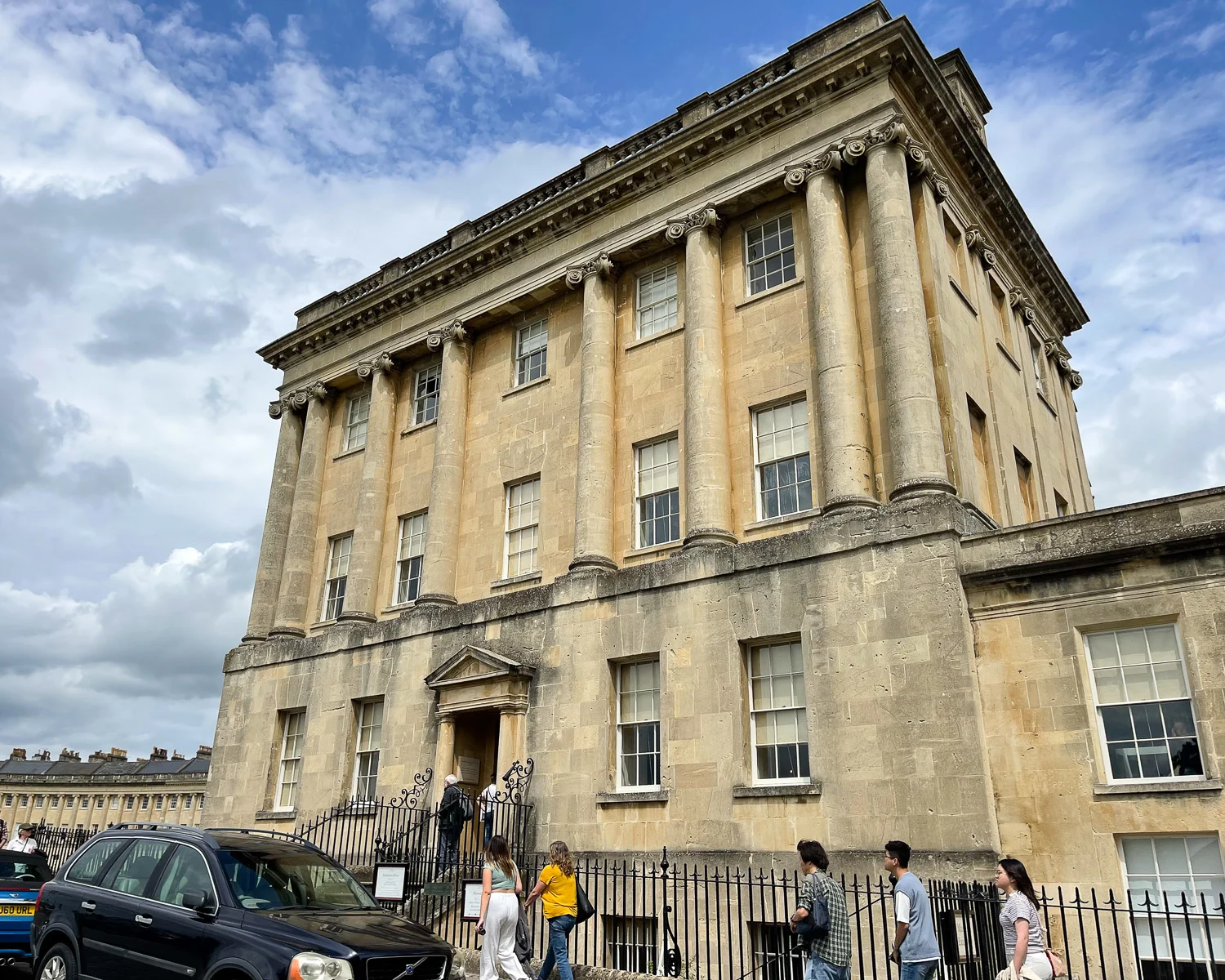
As you move around the house on a self guided tour, the rooms are brought to life in an immersive experience, through the voices of a wealthy family who have rented the house for the season.
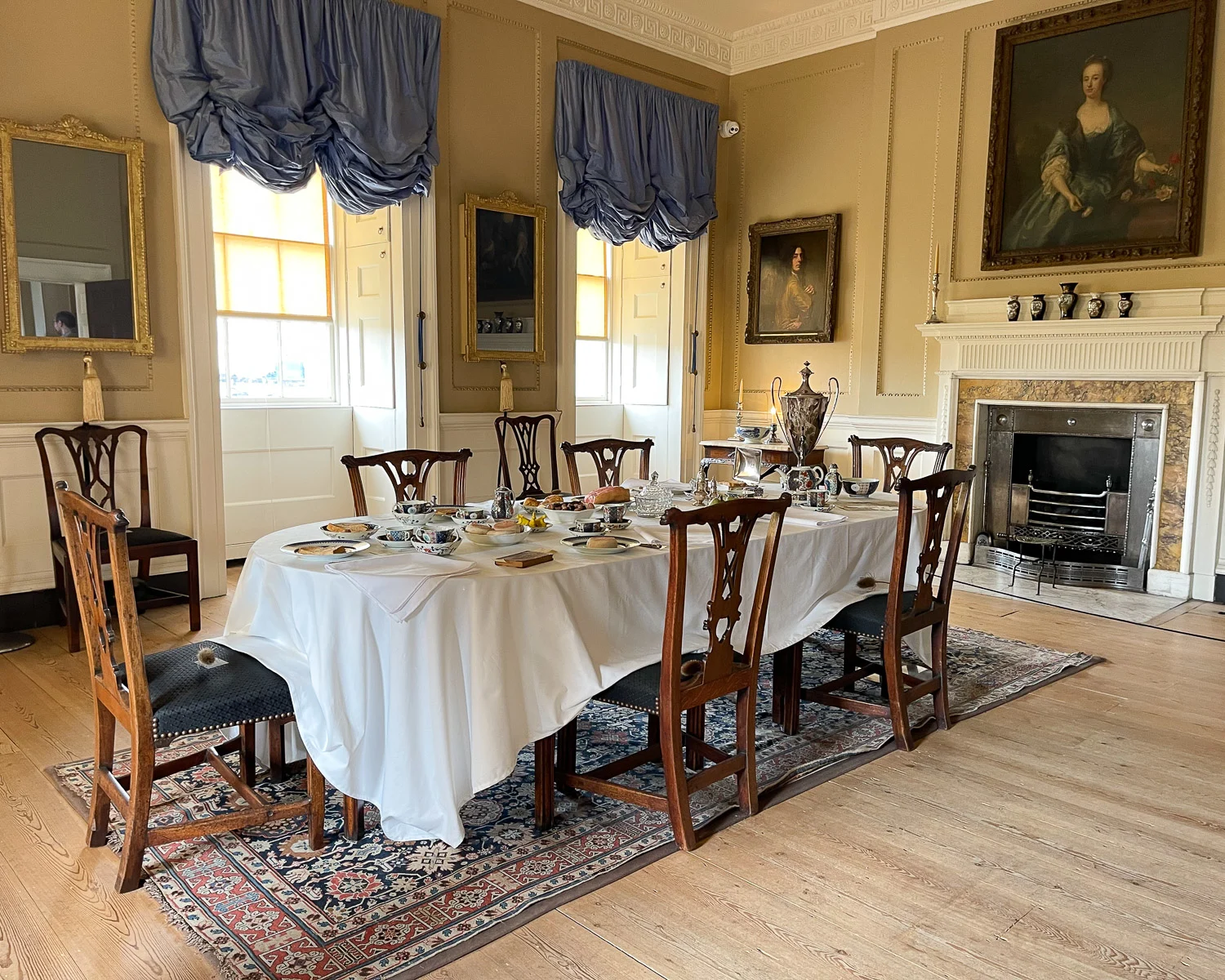
In each room the pictures and mirrors come to life, as different characters from the family talk about their daily life during a season in Bath. We eavesdrop as they gossip about the balls and parties they plan to attend and their hopes to improve their social standing.
Below stairs, in the kitchen and housekeeper’s rooms, we hear the voices of the household servants, and something of their lives. The final room in the exhibition tells us about the real family on whom the characters we hear from are based.
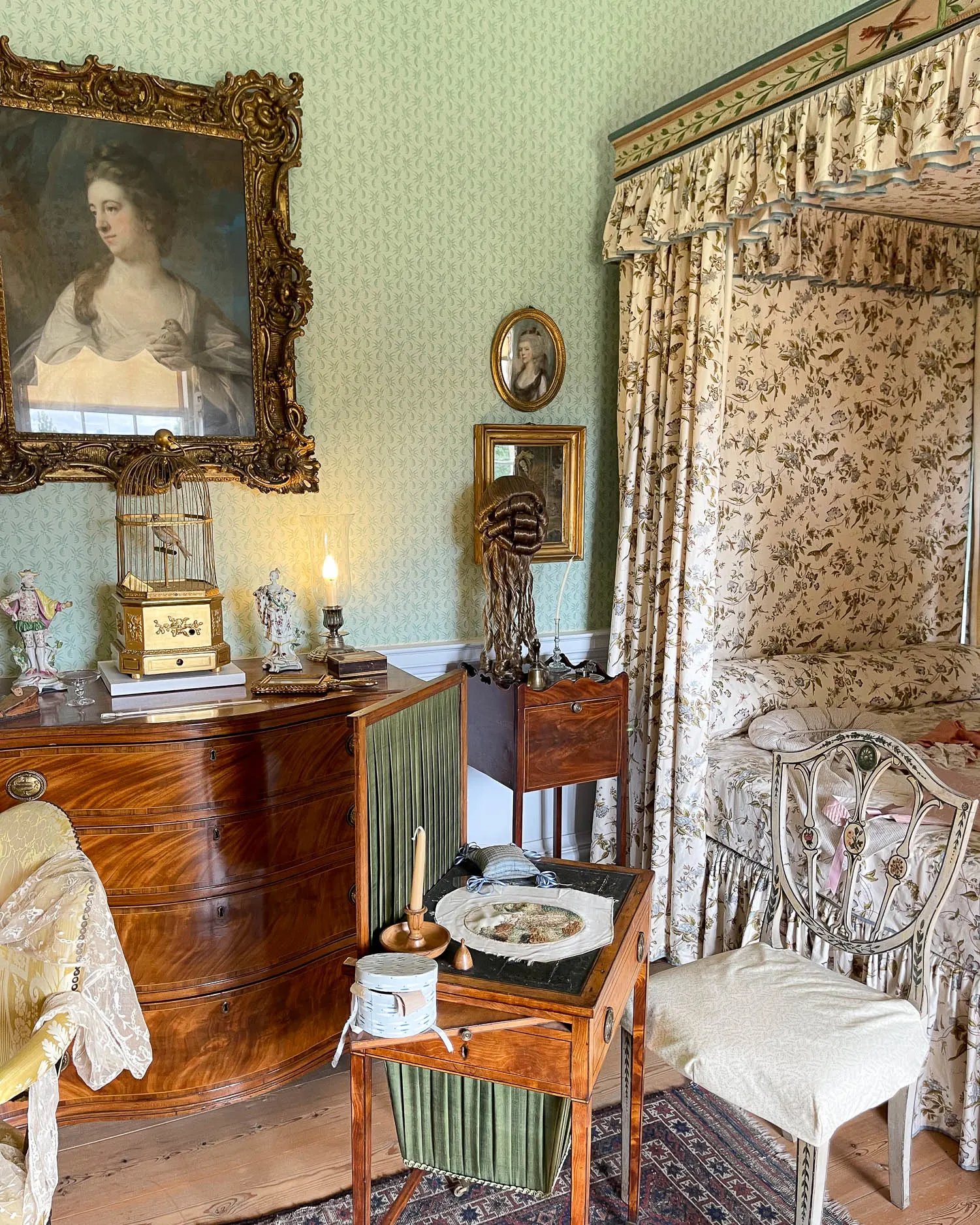
Open: Tuesday – Sunday (Closed in January) Opening hours: 10am – 5.30pm
Ticket Price: Standard adult ticket from £15.50
Website: No1royalcrescent.org.uk Address: 1 Royal Crescent, Bath, BA1 2LR
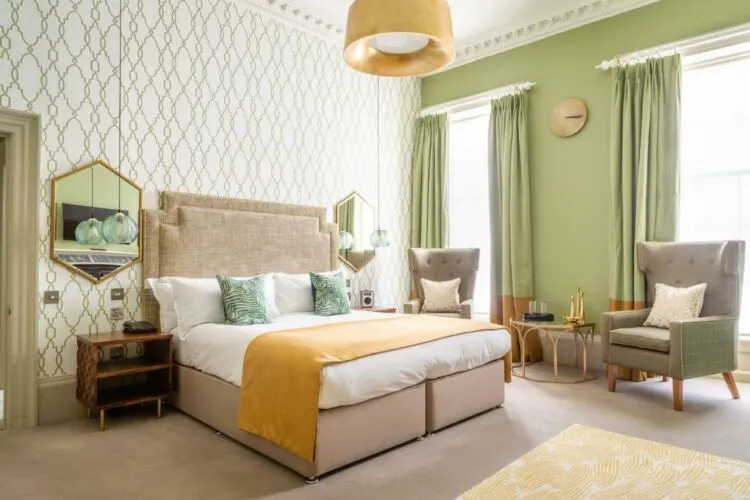
The Queensberry Hotel is a luxury boutique hotel in a Georgian townhouse with award winning restaurant
5. Pulteney Bridge
This picturesque stone bridge over the River Avon is one of the most photographed spots in Bath. Pulteney Bridge is unusual for being built with shops on top of the bridge itself, hence it’s often compared to the Ponte Vecchio in Florence.
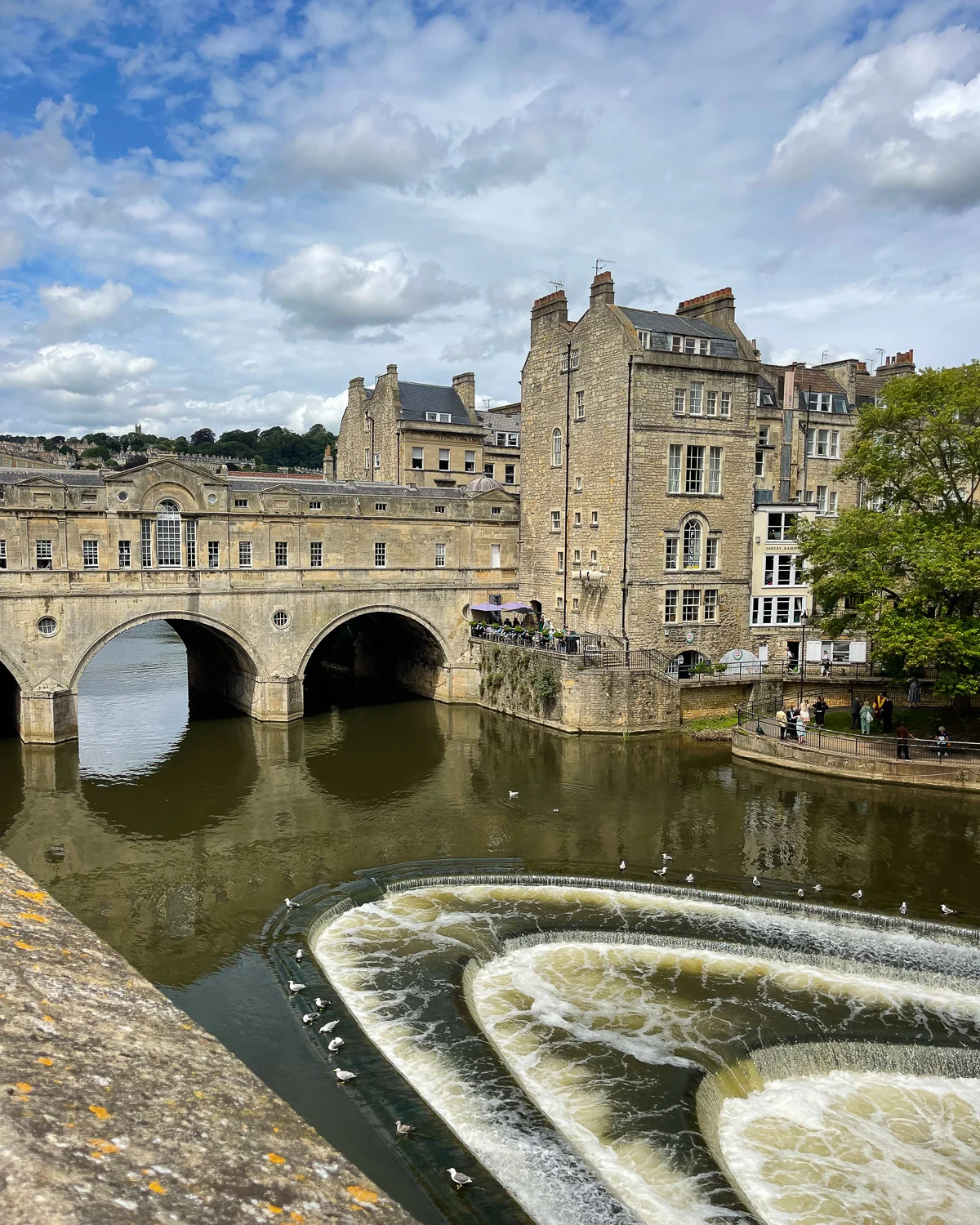
The bridge was completed in 1774 by William Johnstone Pulteney, a wealthy landowner who wanted to promote the area of Bath on the other side of the river, that he was developing. He commissioned architect Robert Adam to create a grand Palladian design that would encourage high society to cross the river.
Pulteney Bridge leads the visitor up Great Pulteney Street to the Sydney Gardens and Holburne Museum, which in Georgian times was a fashionable hotel. It was in this neighbourhood at 4 Sydney Place, that Jane Austen resided with her family for 3 years between 1801 and 1804.
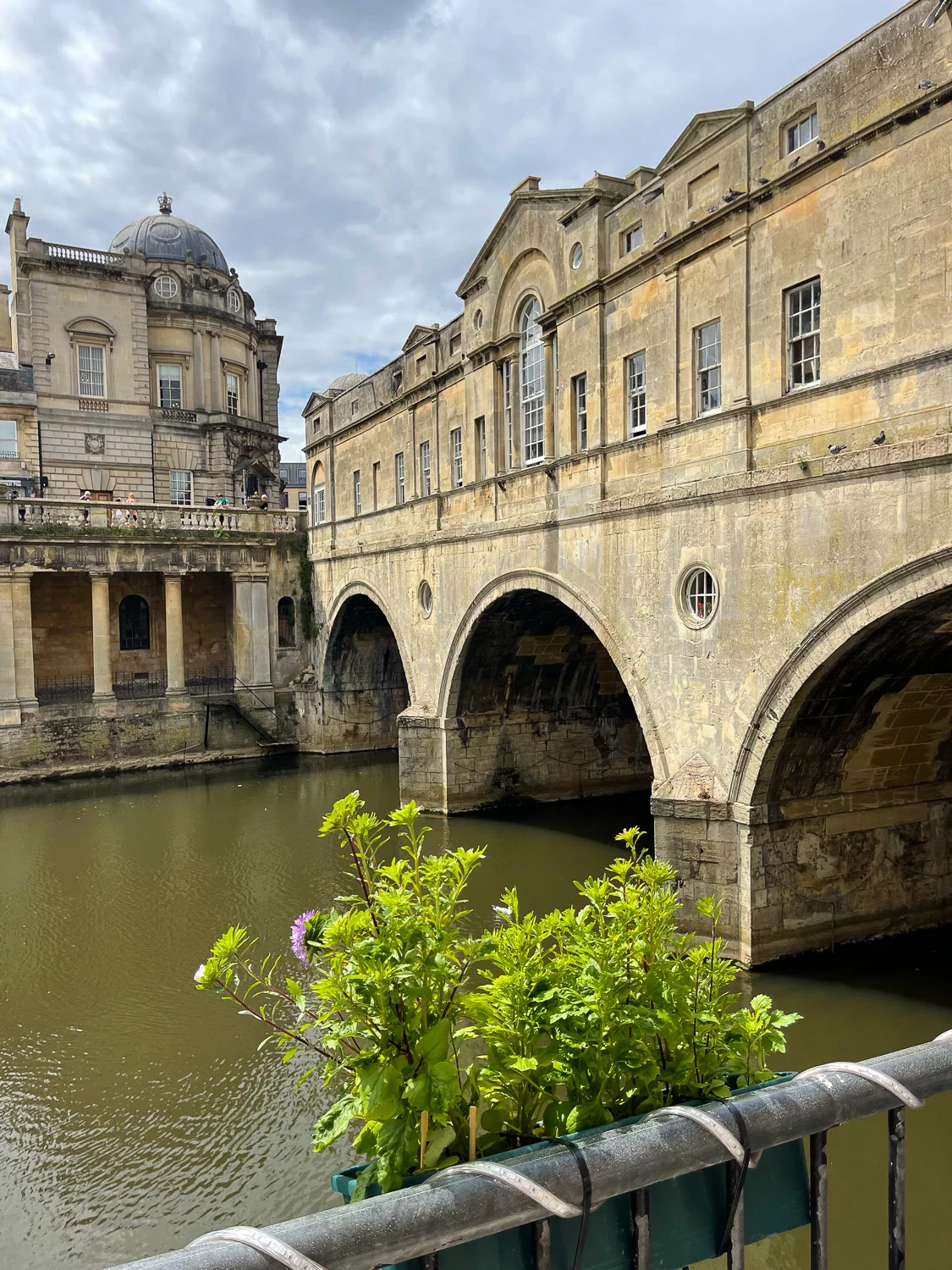
As you cross the bridge, you can browse or window shop in the small independent shops on either side. There are a couple of cafes on the bridge, where you may be able to bag a coveted window table, overlooking the river.
To take one of the popular river boat tours, you should cross the bridge to the Great Pulteney Street side and then head down the steps, to the river bank at Pulteney Weir.
Tip: In fine weather we can recommend lunch on the terrace of the Thai Weir restaurant. The food is good value and it’s located right under Pulteney Bridge, so you’ll get the best river views.
6. Take a Bath boat trip on the river Avon
With the River Avon flowing through Bath, a boat trip is a chance to relax and see the city from a different angle. These boat trips are especially popular in summer and as well as buying individual tickets, you can arrange a boat trip just for your group of friends.
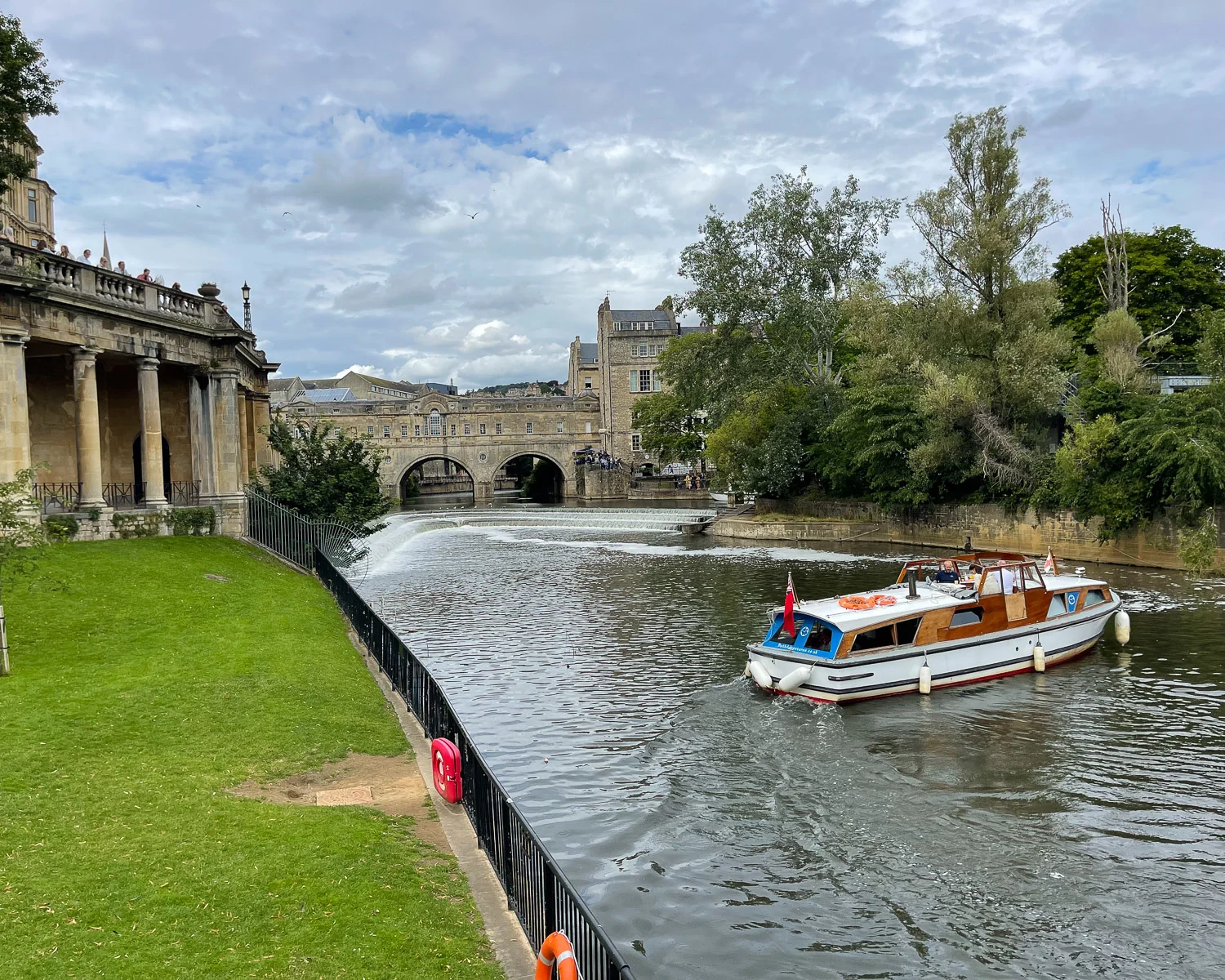
Pulteney Cruisers – 1 hour trip to Bathampton
This 1 hour boat trip leaves from Pulteney Weir just below Pulteney Bridge and heads upstream to Bathampton. On the way you can relax and look out for wildlife on the River Avon, including swans, herons and kingfishers.
They don’t take pre-bookings, so just turn up and take the next trip, with boats holding up to 70 people on a lower and upper deck. There are normally several sailing a day starting from 10am.
The schedule may change depending on weather conditions and river levels, so check the website or social media in advance for latest information. With adult tickets costing from £12, this is the most affordable way to see the river.
Book a private boat trip for your group
If you are arranging a group trip such as a hen party, there are boat tours available from Sir John Knill Boat Trips.
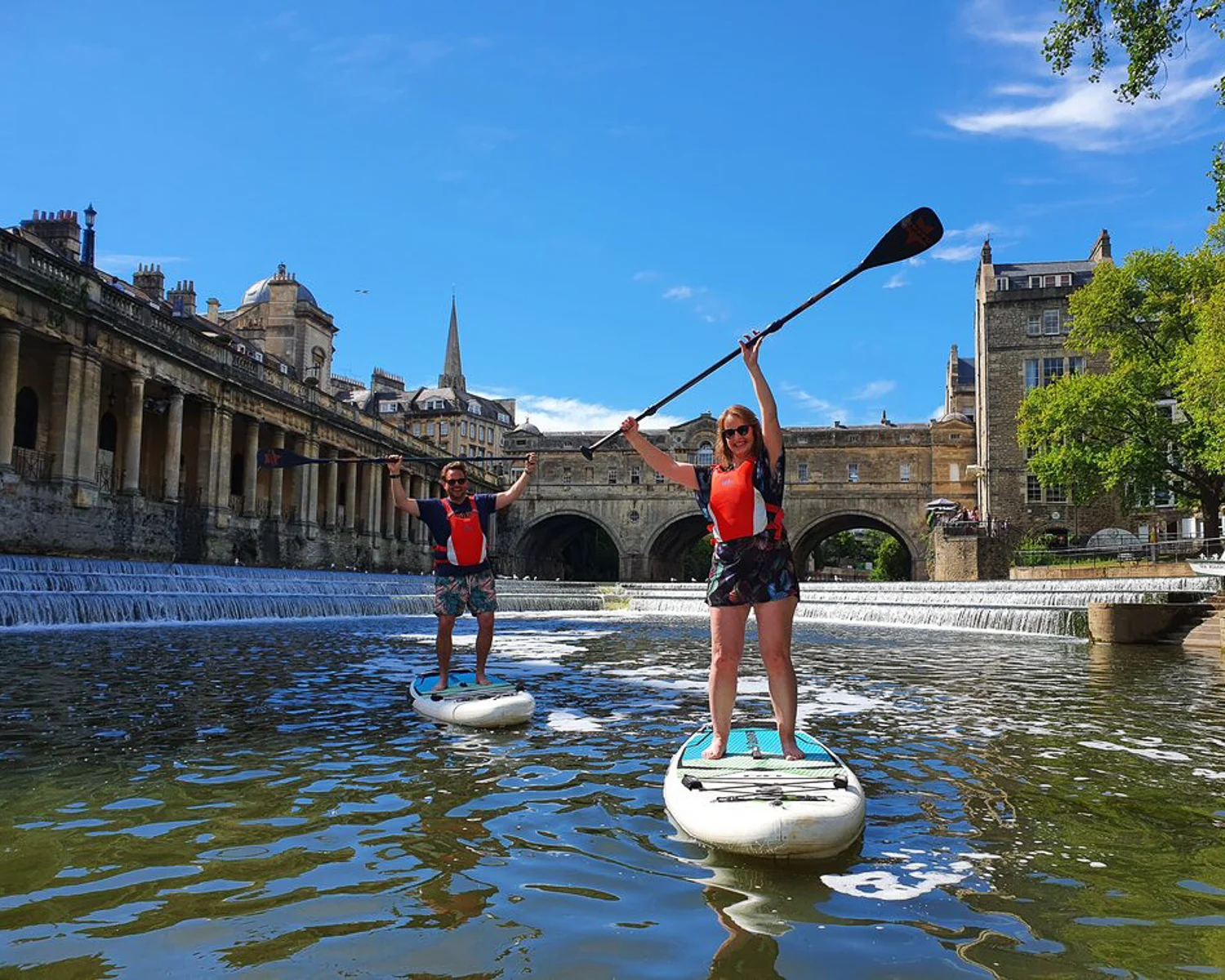
Kayak and SUP tours in Bath
If you fancy something a bit more adventurous, you can also take a kayak or stand up paddle-board experience on the River Avon at Bath.
Original Wild offer both kayak and SUP tours for groups of 10 + people. These 2 hour tours with an instructor take you from the lower part of the Avon up to Pulteney Bridge and back.
CK SUP & Paddle hire kayaks and SUP for a 2 hour self guided tour from The Boathouse at Newbridge, just outside Bath.
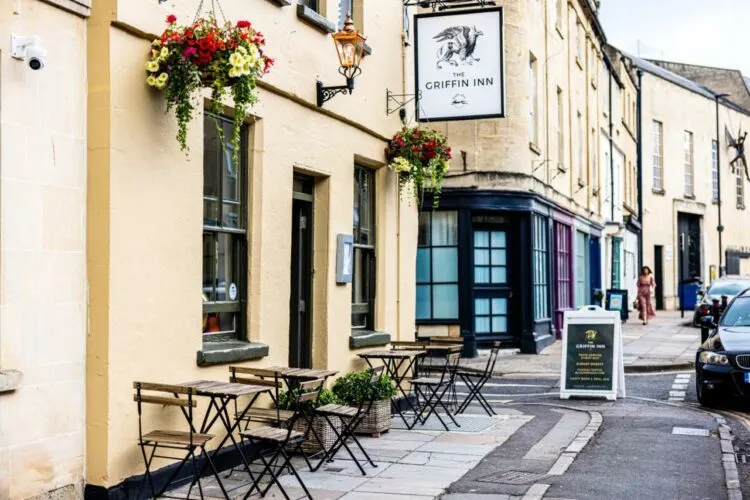
The Griffin Inn in Bath features affordable bedrooms above a comfortable and stylish Georgian pub
7. Take a sightseeing bus tour
Hop-on-hop-off bus tours are ideal for first time visitors to Bath, to get a quick overview of the top things to see. These sightseeing tours are especially valuable for those with limited time, or for those who don’t want to walk a lot.
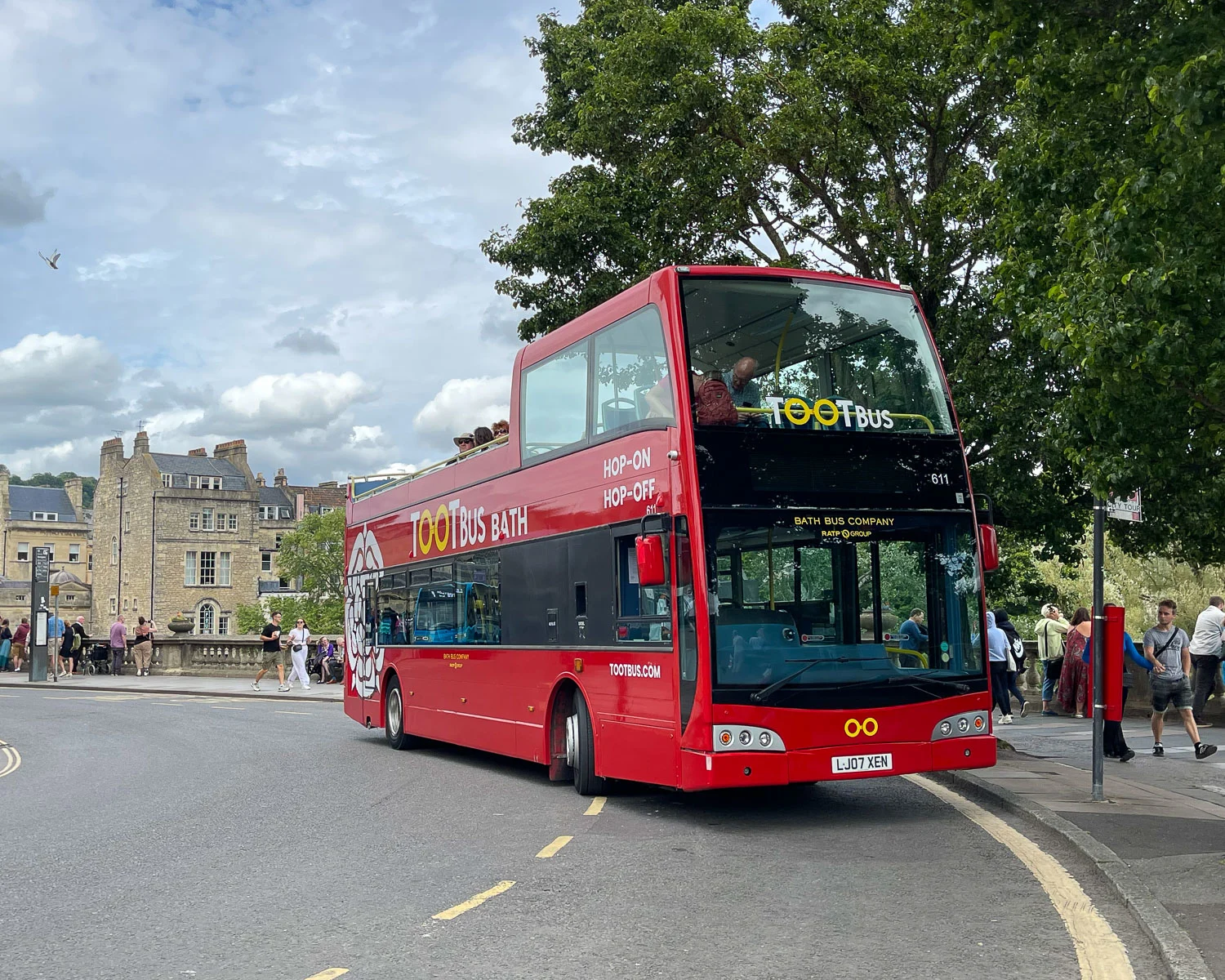
There are two Hop on Hop off bus companies operating in Bath: Tootbus and City Sightseeing. Both offer similar tours on the same two routes. The City Tour runs around the main sites of interest in Bath city centre, while the Skyline tour covers the countryside areas and attractions just outside Bath.
With both companies, you can use your ticket for both the City and Skyline tour. The tours operate daily, with the exceptions of a couple of public holidays, audioguides are available in multiple languages and tickets can be purchased online in advance or on the bus. Cost is around £24 for a 1 day ticket.
Tip: Before booking check both providers tickets below as they sometimes offer online discounts on their normal rates, making one cheaper than the other.
Tootbus
Other benefits: You can download the Tootbus App for live bus times. The app includes 2 Tootwalk audio tours that cover Pride and Promenade: Jane Austen locations or Bath: home of film and TV
More information on Tootbus Website
City Sightseeing
Other benefits: Free booklet with deals and discounts for museums, restaurants, and local attractions
More information on City Sightseeing Website
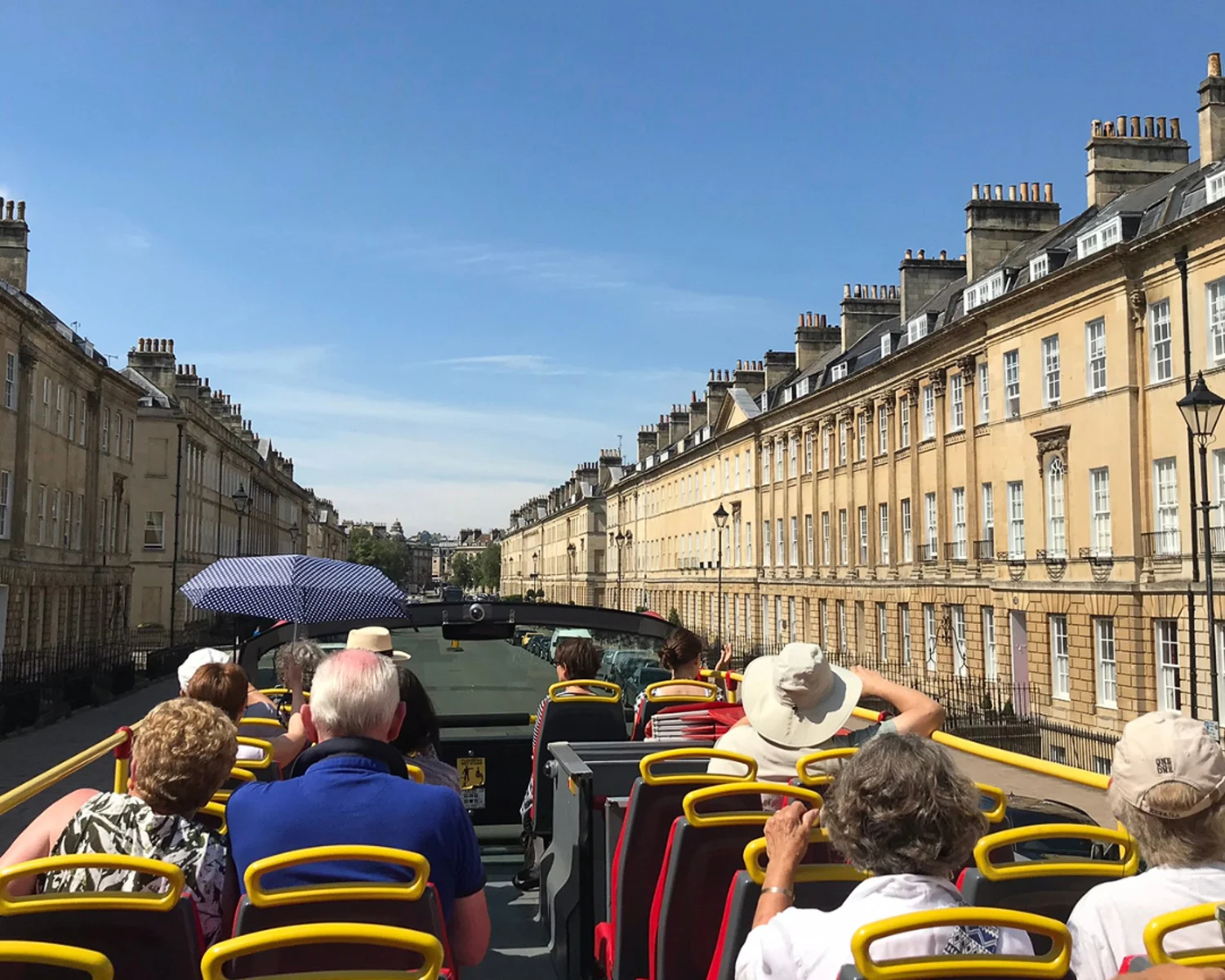
Stops on the Bath City Tour
There are around 16 stops on the City Tour. The main places stops on this route are: The Roman Baths, Bath Abbey, The Royal Crescent, The Assembly Rooms, The Guildhall, Grand Parade, Pulteney Weir, Parade Gardens, Royal Victoria Park, Jane Austen Centre, Mary Shelley “House of Frankenstein”.
City Tour is ideal for: First time visitors to Bath who want to get an overview of the sights, or those who have mobility issues and want an easy way to get around.
Frequency: Every 15 mins Duration for uninterrupted tour: 50 mins
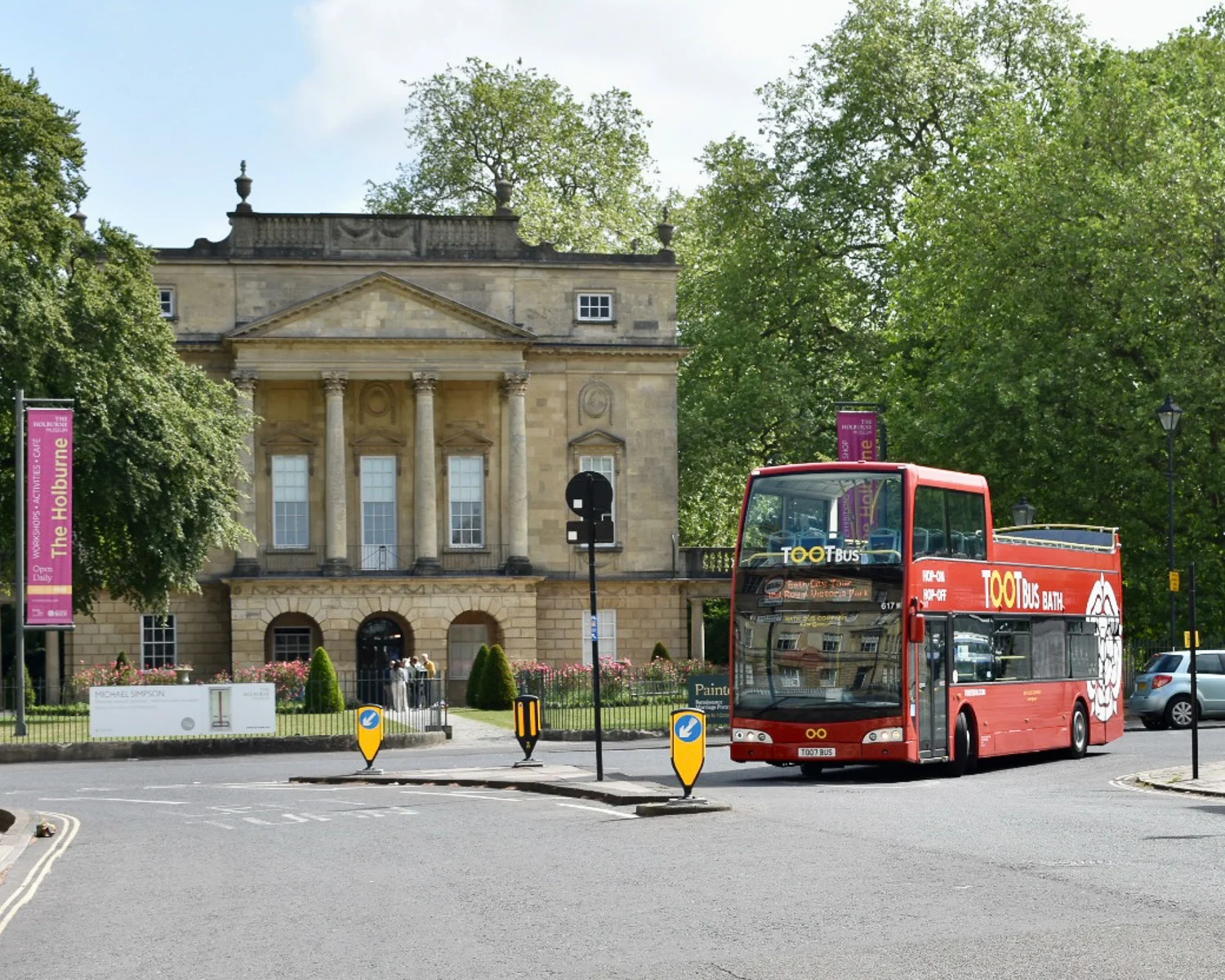
Stops on the Bath Skyline Tour
There are around 21 stops on the Skyline Tour. The main places to go in Bath on the Skyline tour are: Prior Park and Landscape Gardens, The American Museum, The University of Bath, Rainbow Woods, Holburne Museum, Skyline Walk.
Skyline Tour is ideal for: Visitors who want a car free way to visit some of the sites just outside Bath, or who want to relax and enjoy countryside views.
Frequency: 30 mins Duration for uninterrupted tour: 45 mins
8. Jane Austen Centre
For Jane Austen fans, the Jane Austen Centre is an excellent place to learn more about the celebrated author’s writings and visits to Bath. Your visit starts with a video about Georgian life in Bath and a short talk from one of the costumed characters from Jane’s novels.
Exhibitions continue on the lower ground floors, with more information about the places Jane lived in Bath and costumes that her characters might have worn.
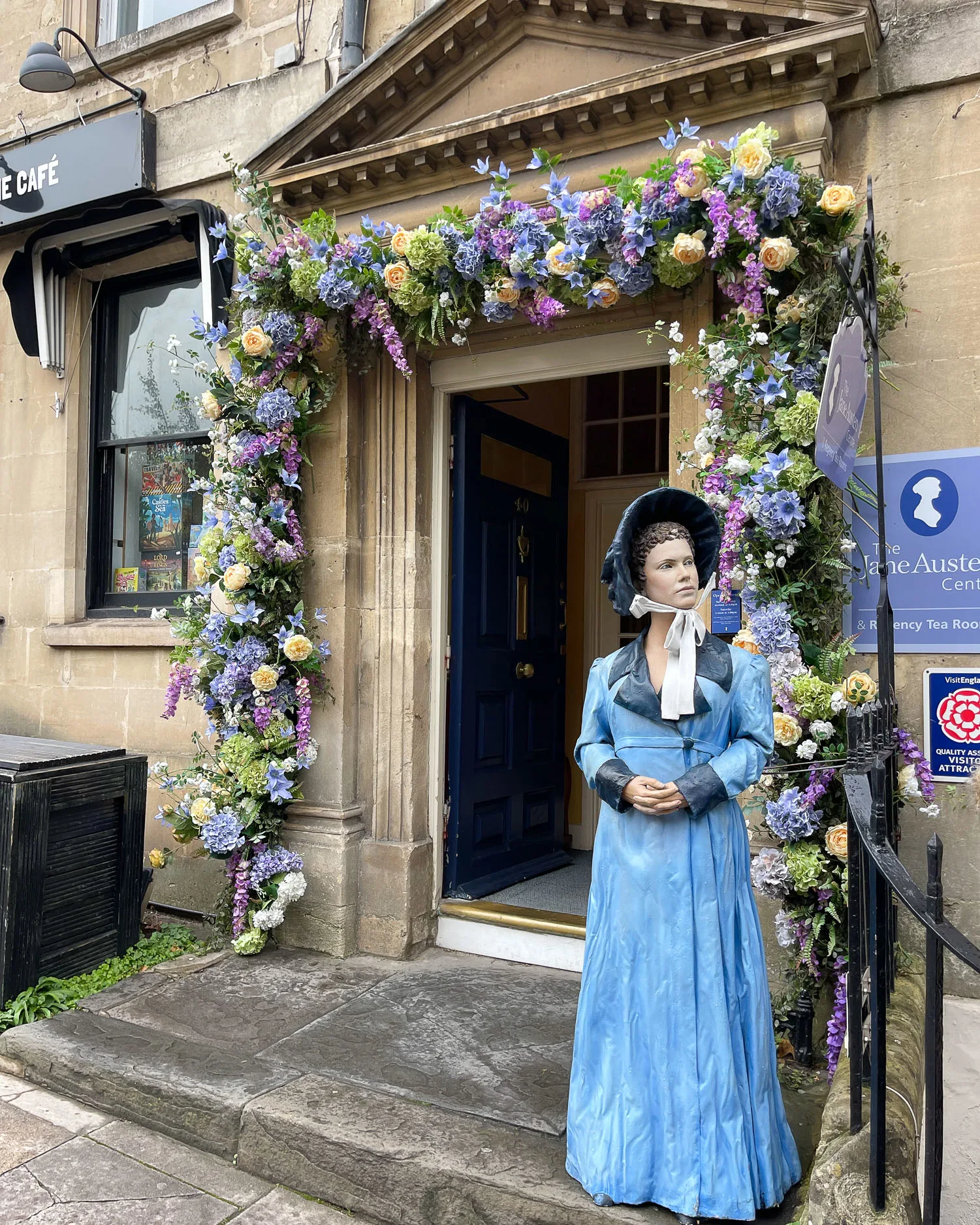
We had fun dressing up as a Regency lady for a photo, in the famous film scene where actor Colin Firth as Mr Darcy, emerges wet from a swim in the lake.
Or try your hand at writing with a quill pen in Mr Bennet’s study. There’s a life size wax model on display, that gives the best impression of what Jane Austen might have looked like.
In the small top floor Regency tea room, you can enjoy formal afternoon teas, with menu options named after Jane Austen characters, such as Mr Darcy, Lady Catherine and Miss Dashwood.
The centre organises the Jane Austen festival held in September, with Jane Austen themed events, a costumed ball and promenade through the city.
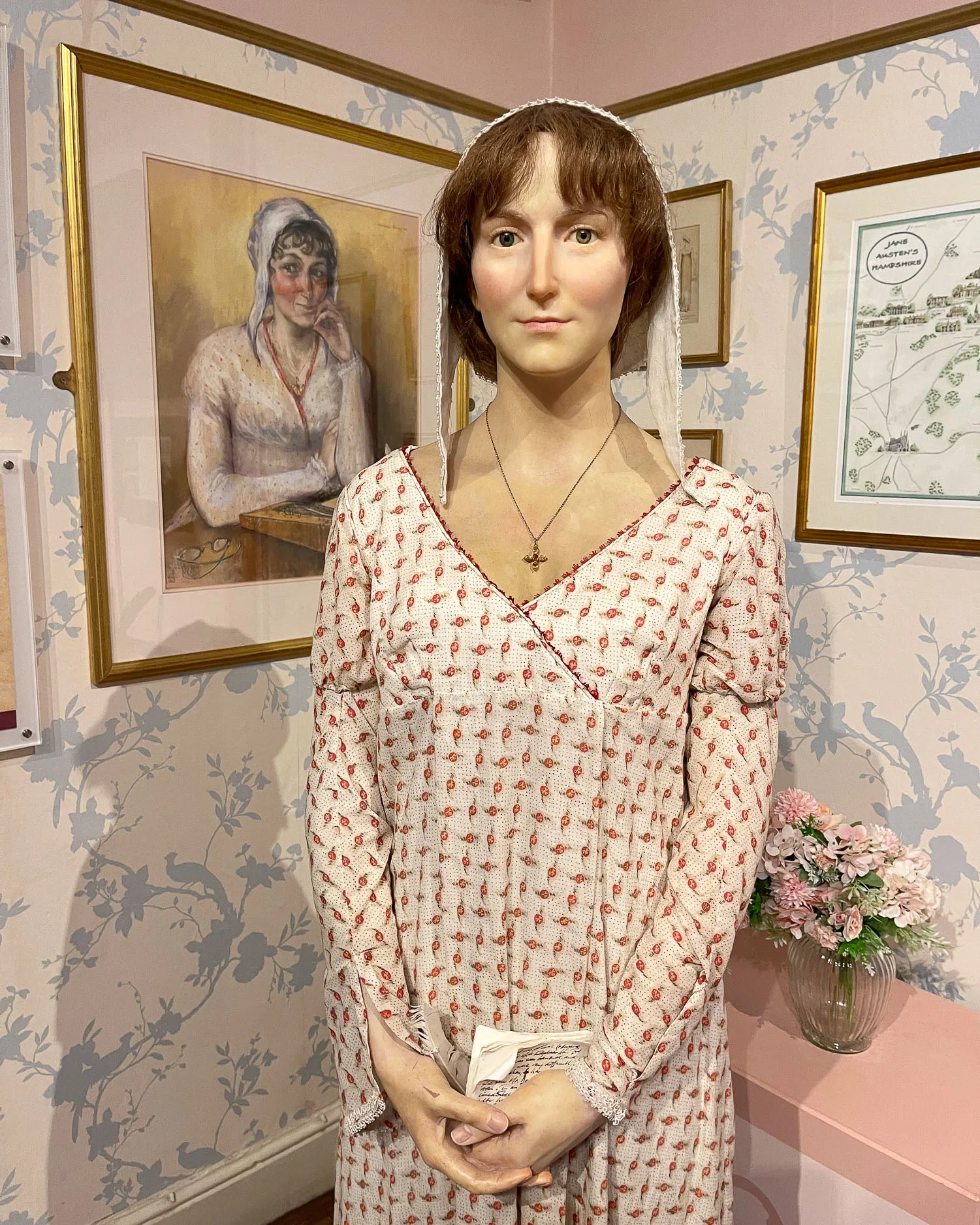
Open: Daily all year round Opening hours: 9.45am – 6pm (Shorter hours in winter)
Ticket Price: Standard adult ticket from £15.75. Buy your Jane Austen Centre ticket in advance here.
Website: Janeausten.co.uk Address: 40 Gay Street, Bath, BA1 2NT
9. Sally Lunn tea house
The picturesque Sally Lunn tea house is home to the famous Sally Lunn bun. The large brioche style roll is served here at lunch or teatime with sweet or savoury toppings. It’s named after a French Huguenot baker, Sally Lunn, who set up a bakery here in the 17th century.
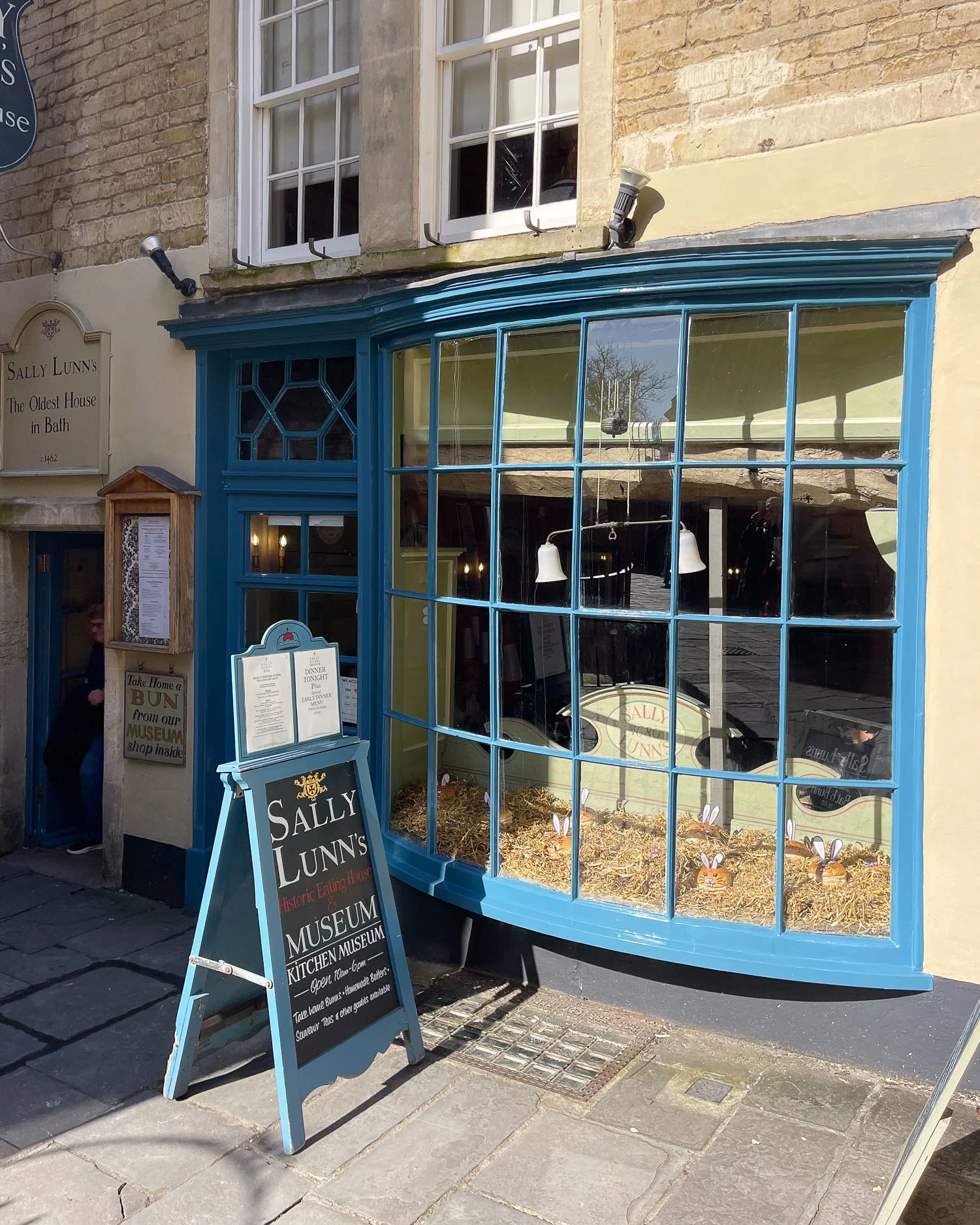
She built a reputation for her Bath buns and the teahouse still bakes to the bakery’s original recipe, which they keep a closely guarded secret. Jane Austen wrote mischievously in a letter about “disordering my stomach with Bath Bunns”, since they were often served at breakfast parties in Georgian Bath.

Sally Lunn’s claims to be one of the oldest houses in Bath and there is evidence of a food premises on this site in Roman times. Perhaps the bakery served visitors to the nearby Temple of Sulis Minerva and Roman baths?
The Sally Lunn tea house has tables on three floors and does not take bookings during the day. It’s a popular visitor spot but although you may have to queue a little in the hall before being seated, there’s normally a table to be found before too long.
In the evenings, bookings are taken and the menu has some more substantial dishes, although a slice of the Sally Lunn Bath bun is included with the meal.
The Sally Lunn Museum
To visit the small Sally Lunn museum, pass by anyone queuing for a table and head straight downstairs to the cellar. Here you’ll find a couple of small rooms, to show how the original bakery would have looked, with its wood fired oven.
On the other side of the cellar is an excavated area, with some sections that show there was a building here in Roman times, as well as a later Medieval monastery complex. The museum can be visited by anyone and is free for anyone who takes refreshments, but otherwise you may be charged 30p. More information on the Sally Lunn website.
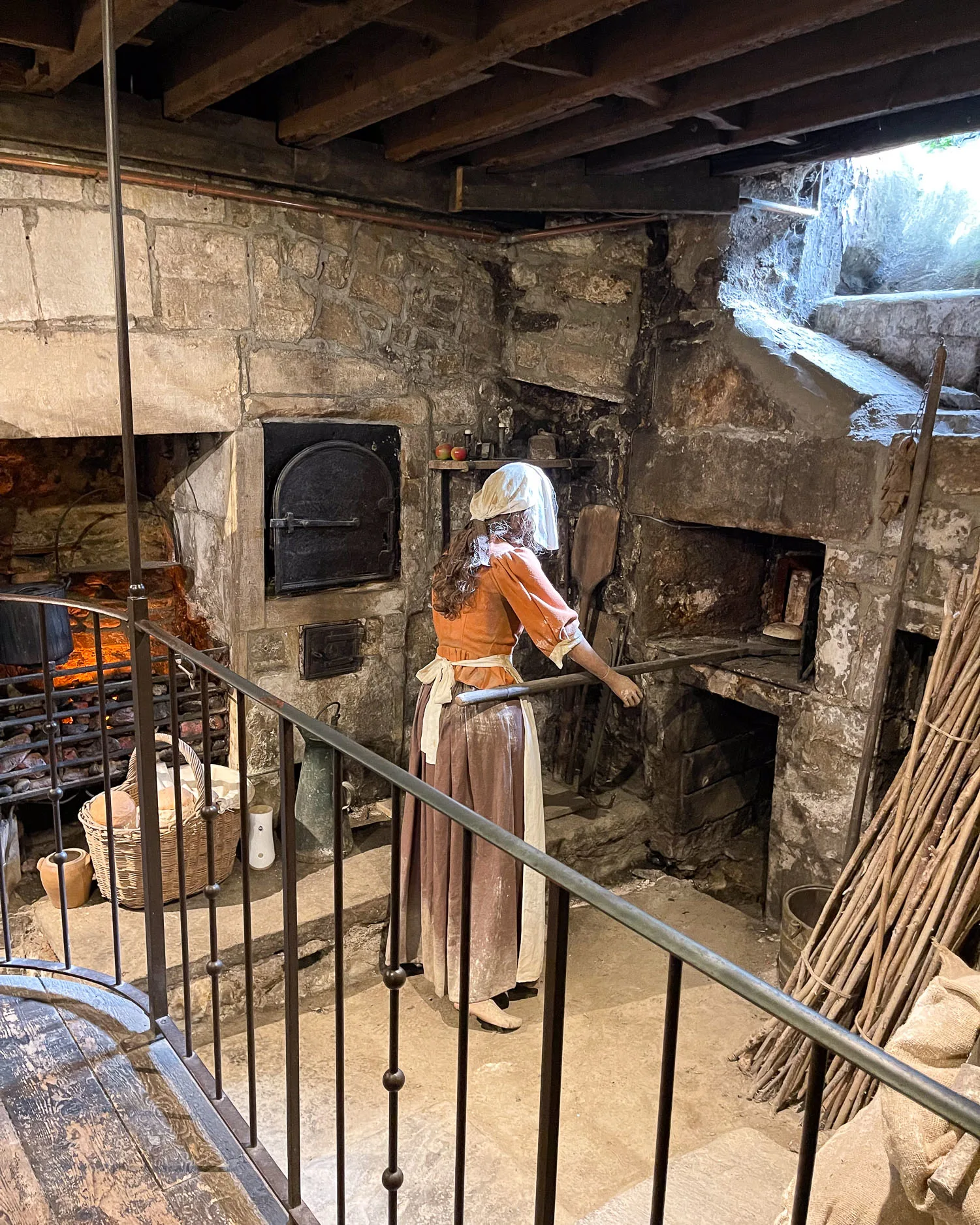
10. Bath Guildhall Market
Tucked away between Bath Abbey and Pulteney Bridge, it’s easy to miss Bath Guildhall Market. This covered market has an old fashioned feel and houses around 20 different stalls and cafes.
Some of the stalls are craft oriented, others offering refreshingly normal products (think hardware and pet supplies), giving the market a local feel.
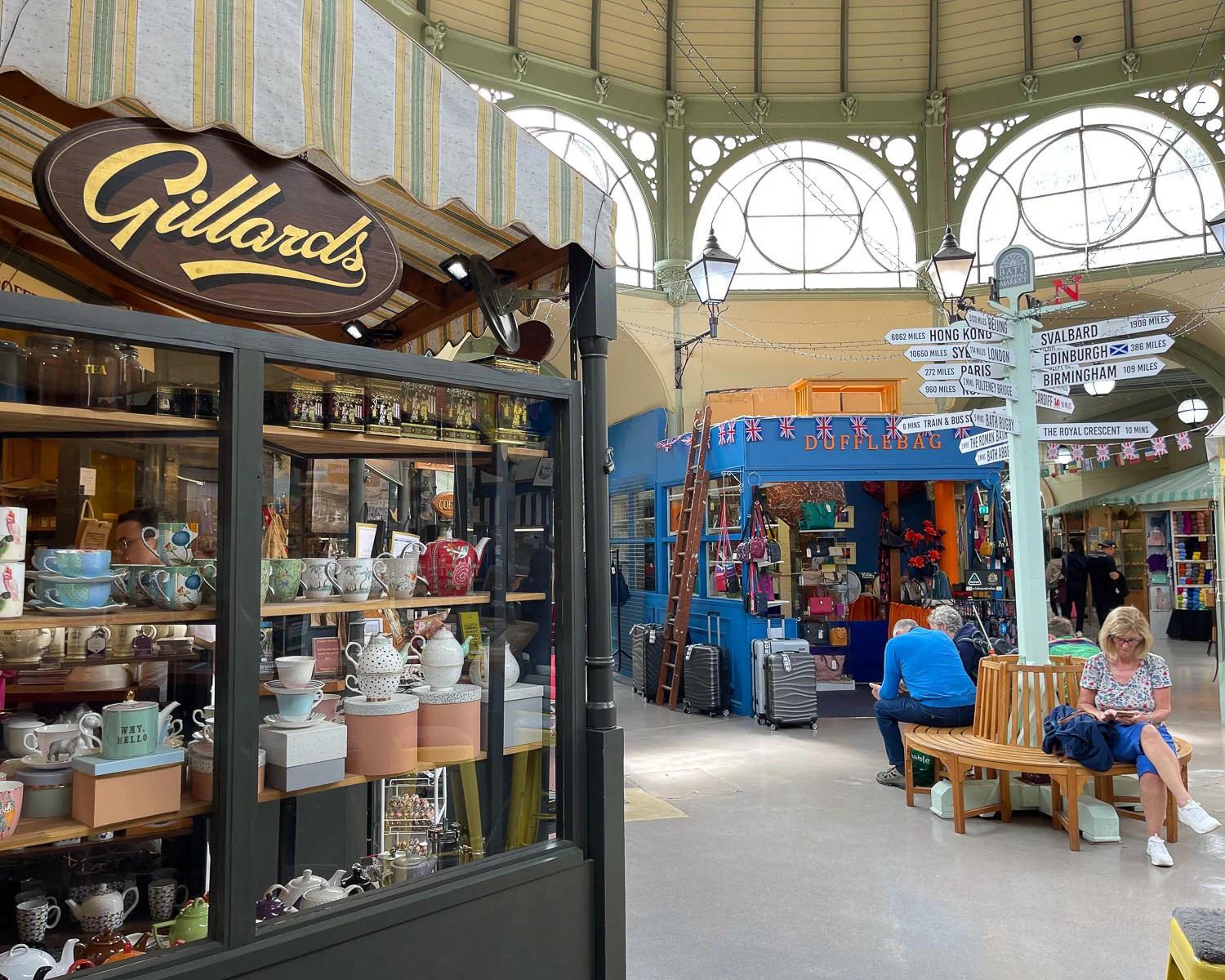
This is Bath’s oldest market, with trading taking place on this spot over many centuries, although the current building dates back to the 19th century. The market takes its name from the impressive Guildhall next door and has a pretty ironwork dome at its centre.
Enter from either of the two different entrances, from the Grand Parade opposite Pulteney Bridge or the High Street by the Guildhall.
Our favourite stalls in Bath Guildhall Market
- Guildhall Delicatessen and Nibbles cheese – good places to pick up picnic items to eat in the Parade Gardens overlooking the river.
- Guildhall Market Cafe – a well priced traditional cafe serving English breakfasts, jacket potatoes and a fine cup of tea with home made cake.
- Bath humbug – selling traditional sweets in jars like the ones I used to spend my pocket money on as a child.
- Not Cartiers – affordable vintage costume jewellery, for when you need a bit of bling!
- Bath leather goods – hand made leather belts, journals and bags, made in a local workshop.
- Guillards – an emporium of specialty tea blends, freshly roasted coffee beans and pretty china tea cups and pots.
Tip: Look out for the 18th century market pillar, a stone table known as “The Nail” which is said to have given rise to the saying “to pay on the nail”.
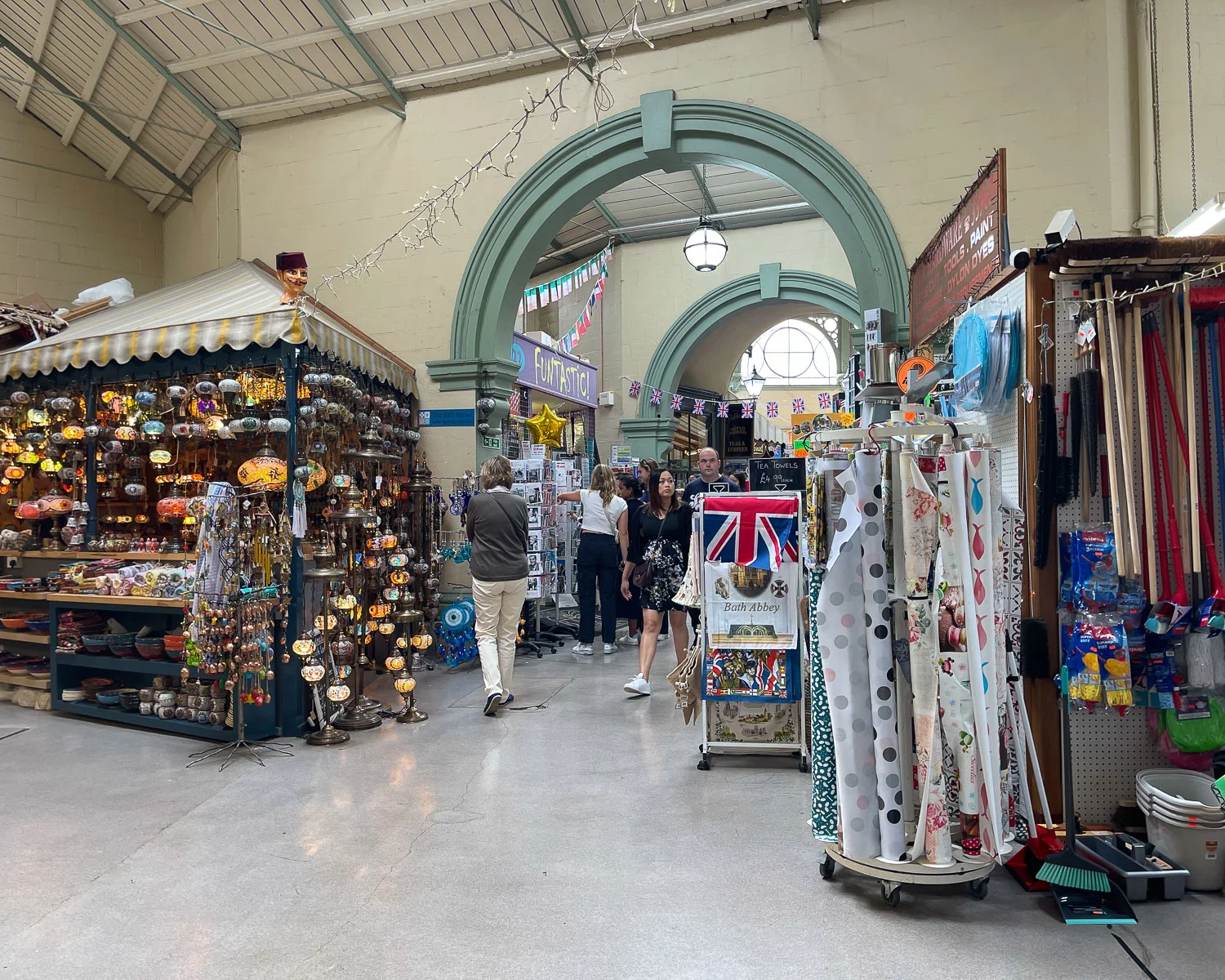
Open: Monday – Saturday Opening hours: 8am – 5.30pm (shops may have their own opening hours) Free entry
Website: Bathguildhallmarket.co.uk Address: 32 High Street, Bath, BA2 4AW
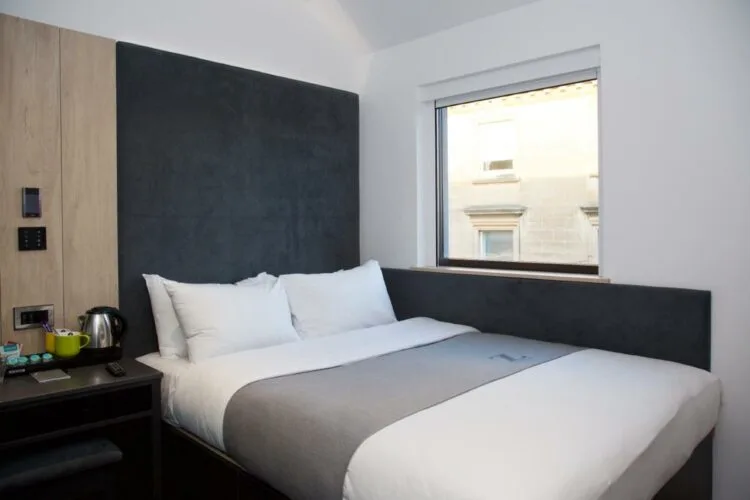
The Z Hotel in Bath is a modern budget hotel with compact rooms but central location
11. Picnic in the Parade Gardens
This small park has a prime position near Bath Abbey and overlooking the river, making it the ideal spot for a picnic lunch in fine weather. The Parade Gardens are run by the local council, who charge a small fee for entry, which is well worth paying for access to this lovely spot.
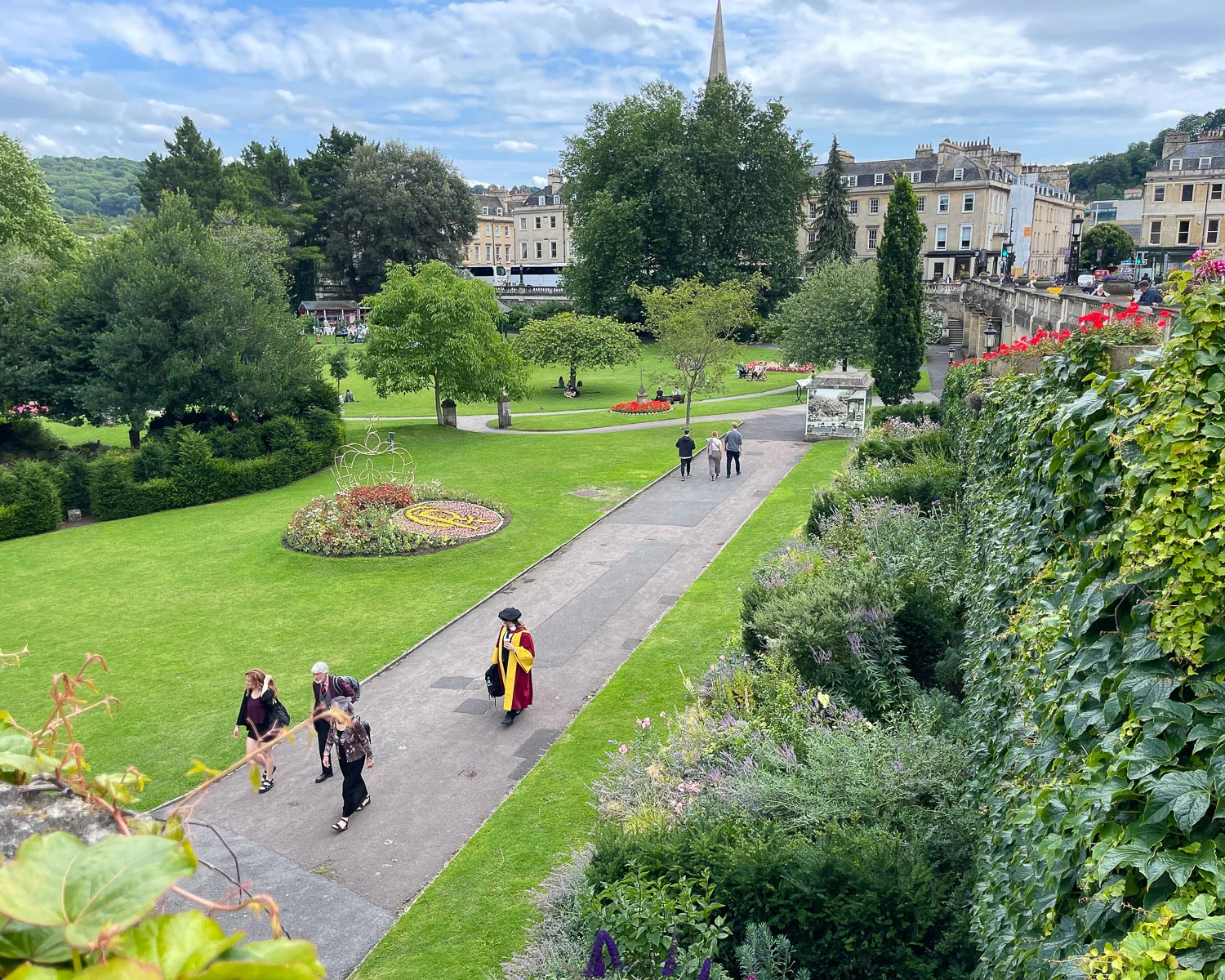
The pleasure gardens, originally known as St James’s Park, were laid out in 1709 for the use of visitors to Bath. After visiting the nearby pump rooms, Georgian society could come here to promenade and socialise.
The colourful bedding displays and floral sculptures are much admired, with a bandstand where concerts and children’s entertainment take place in summer.
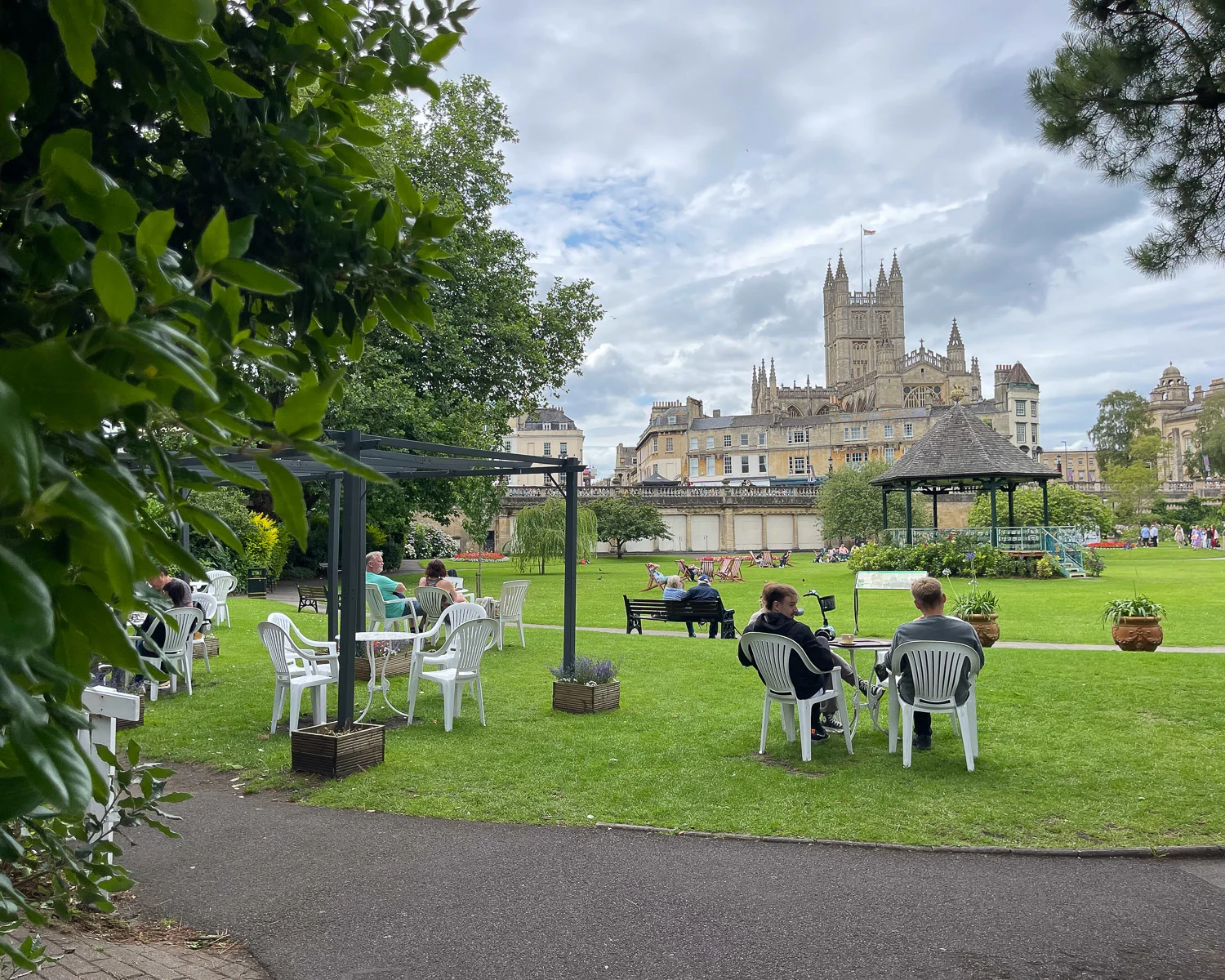
Visitors can wander round the well kept paths, admire the herbaceous borders and bedding displays, or sit on the clipped lawns to take in the river views towards Pulteney Bridge. Facilities include a small cafe with open air seating, toilets and wheelchair/pushchair access via a ramp.
Open: Daily, subject to weather conditions Opening hours: 10am – 6pm
Ticket Price: Adults £2.50, Child aged 5-16 £1.50 (under 5 free)
Website: Parade Gardens Address: Grand Parade, Bath, BA2 4DF
12. Shopping in the Lanes
Bath is the ideal place to combine sightseeing with shopping, with a wide range of upscale fashion boutiques and smaller independent shops. It’s great fun exploring some of the narrow lanes, where you can imagine bumping into a Jane Austen or Bridgerton heroine, out shopping to look her best for the social season.
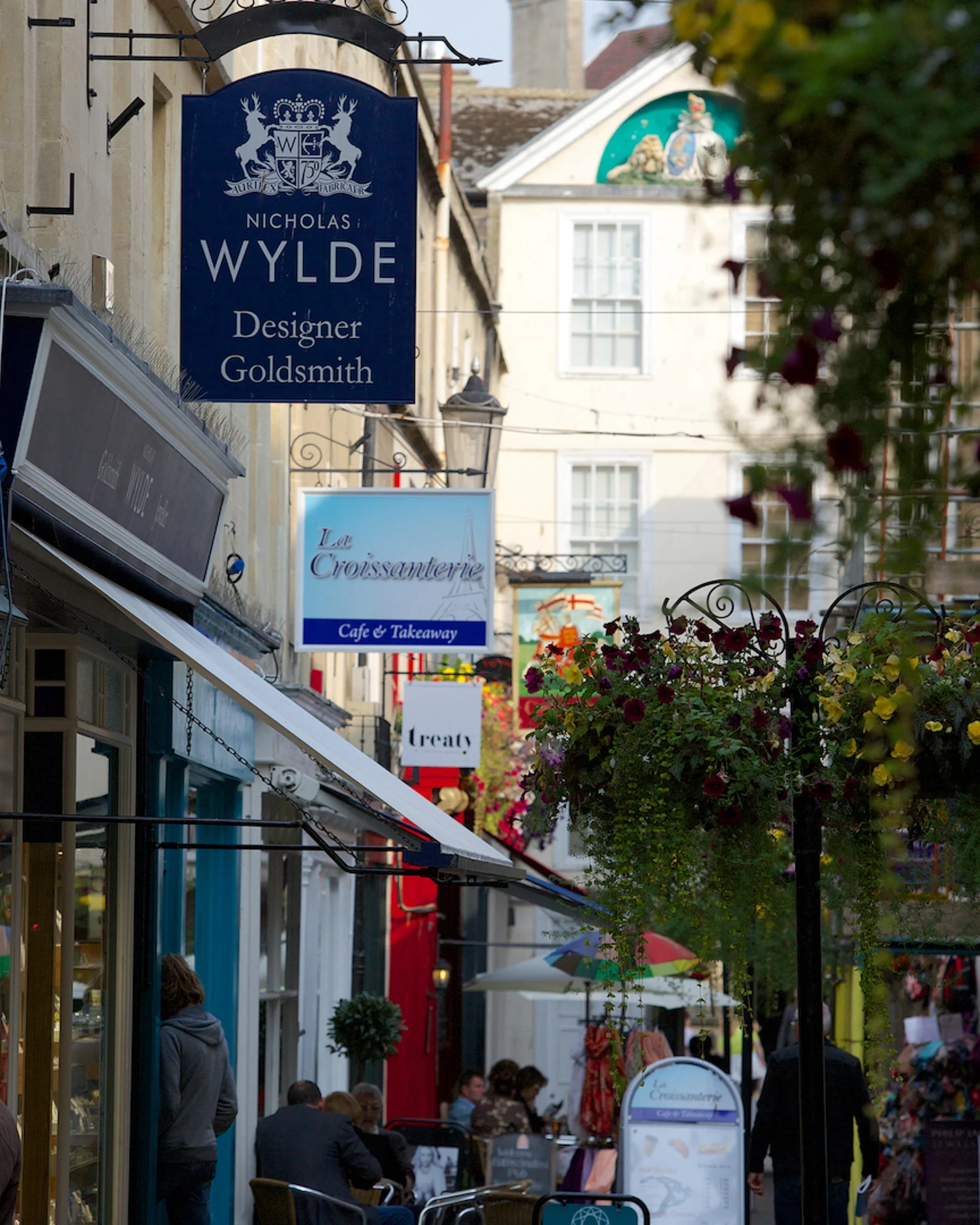
Our favourite lanes to soak up the atmosphere are:
Northumberland Place – this lane is especially atmospheric at the Broad street end, where you’ll find the friendly Rosario’s Italian coffee shop and traditional Coeur de Lyon pub, both good spots for lunch.
The Corridor – running parallel to Northumberland Place, this covered arcade is worth walking through to admire its attractive Victoria glazed roof and traditional shopfronts.
North Parade Passage, Abbey Street, Abbey Green – in the heart of Bath’s Medieval city, this is where you’ll find the Sally Lunn teashop to try their famous Bath Buns. Abbey Green is a charming cobbled square with a plane tree at its centre, used in many Bridgerton scenes, where the characters visit the Modiste dress shop (in real life the Abbey Deli).
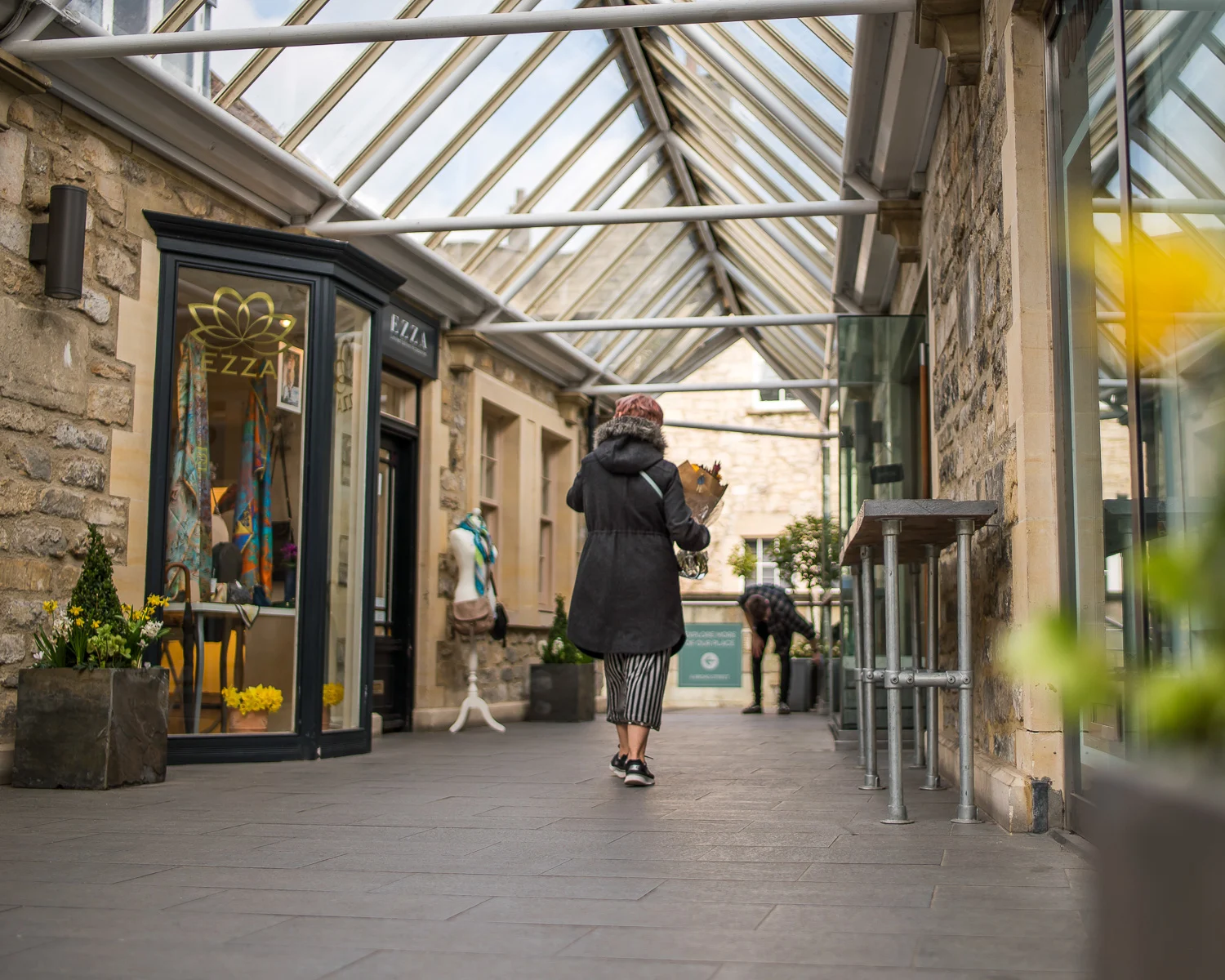
Milsom Place – a large complex of independent shops and cafes, set around a series of internal courtyards. You can enter from either Milsom Street or Broad Street. Check out the Milsom Place website for more information.
13. Discover the Bridgerton Film locations
Since the Bridgerton film series is set in a colourful and stylised version of Georgian England, Bath’s elegant architecture makes the ideal backdrop, doubling for scenes that are set in London.
Bridgerton fans might like to take this tour of all the Bridgerton filming locations in Bath. The 1.5 hour tour covers all the places to see in Bath that were used as Bridgerton film locations, using a headset so that you can not only hear the guide’s commentary, but listen to music from the Bridgerton series.
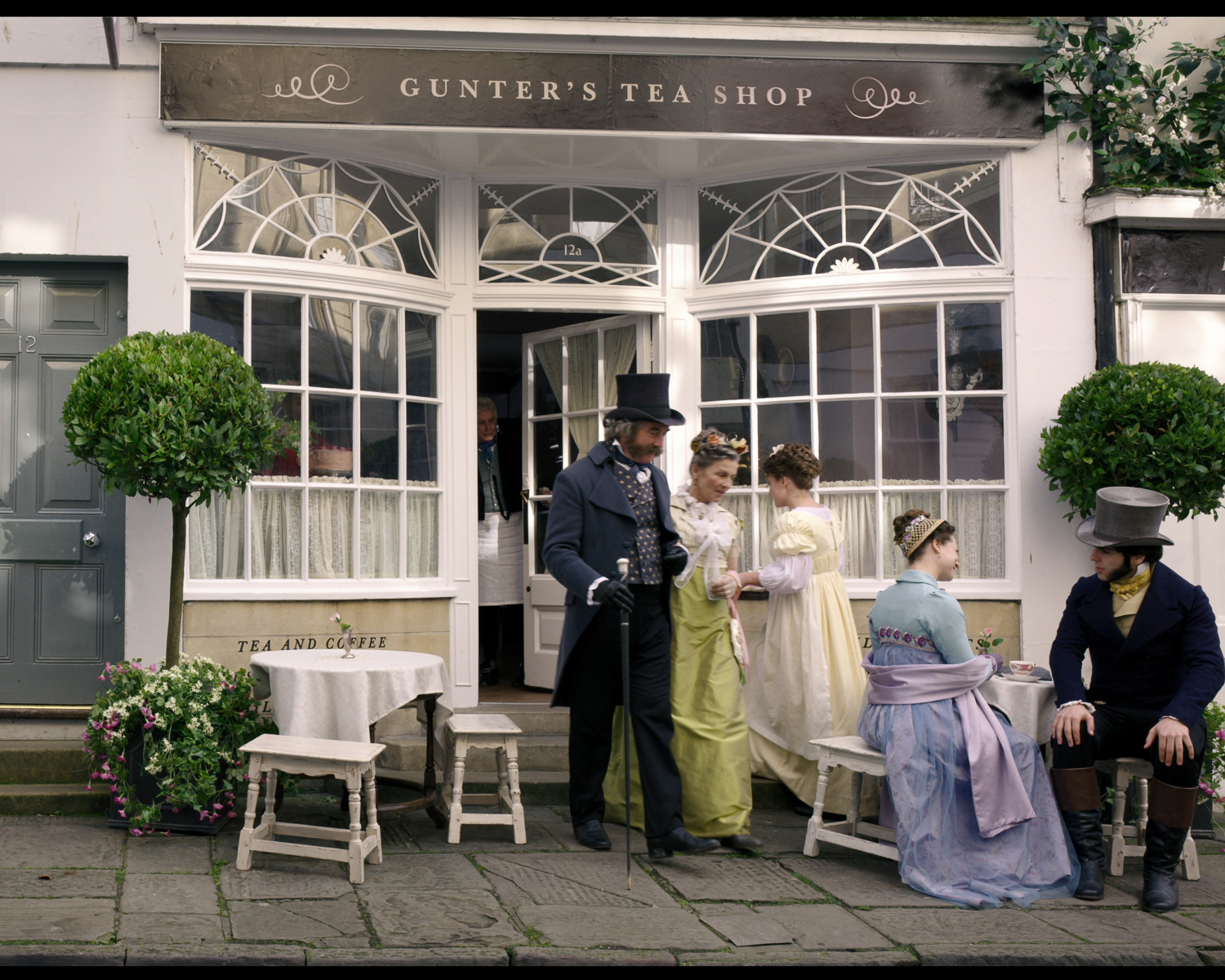
Top Bridgerton locations from Season 1 and 2 include:
- At the end of the Royal Crescent is No 1 Royal Crescent, a Georgian museum that doubles as the London home of the Featherington family in the series.
- The picturesque cobbled square of Abbey Green was used in Bridgerton for several street scenes and the Abbey Deli was transformed into the fashionable Modiste dress shop.
- The Assembly Rooms was used in a Bridgerton ballroom scene, where visitors in Georgian times would gather to dance, play cards and socialise.
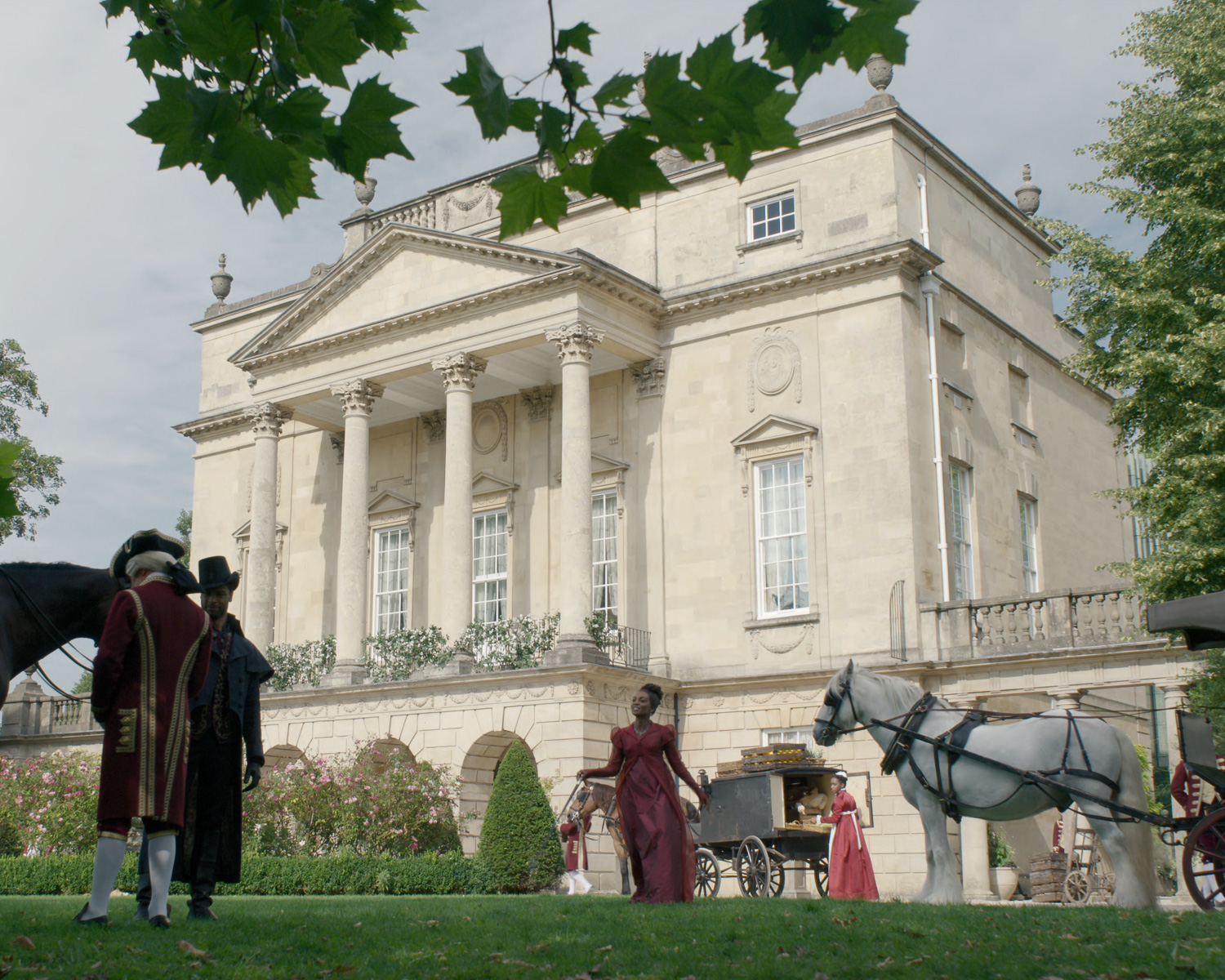
- The Holburne Museum features as the grand home of Lady Danbury, society leader and friend of Queen Charlotte.
- The colonnaded Bath Street is the location of the original Georgian Cross Bath, where the Duke of Hastings first arrives on horseback.
- For Bridgerton Season 3, filming took place in Bath in January 2023. More scenes were shot around Great Pulteney Street and Edward Street near the Holburne Museum, as well as at the Royal Crescent.
14. Royal Victoria Park
Bath’s largest public park starts close to the city centre and extends for some 57 acres to the west. The park is named after Princess (later Queen) Victoria, who visited in 1830 to open the park as a child of 11 years old. If you enter the park along Royal Avenue from the Queen’s Square end, here are a few things to look out for.
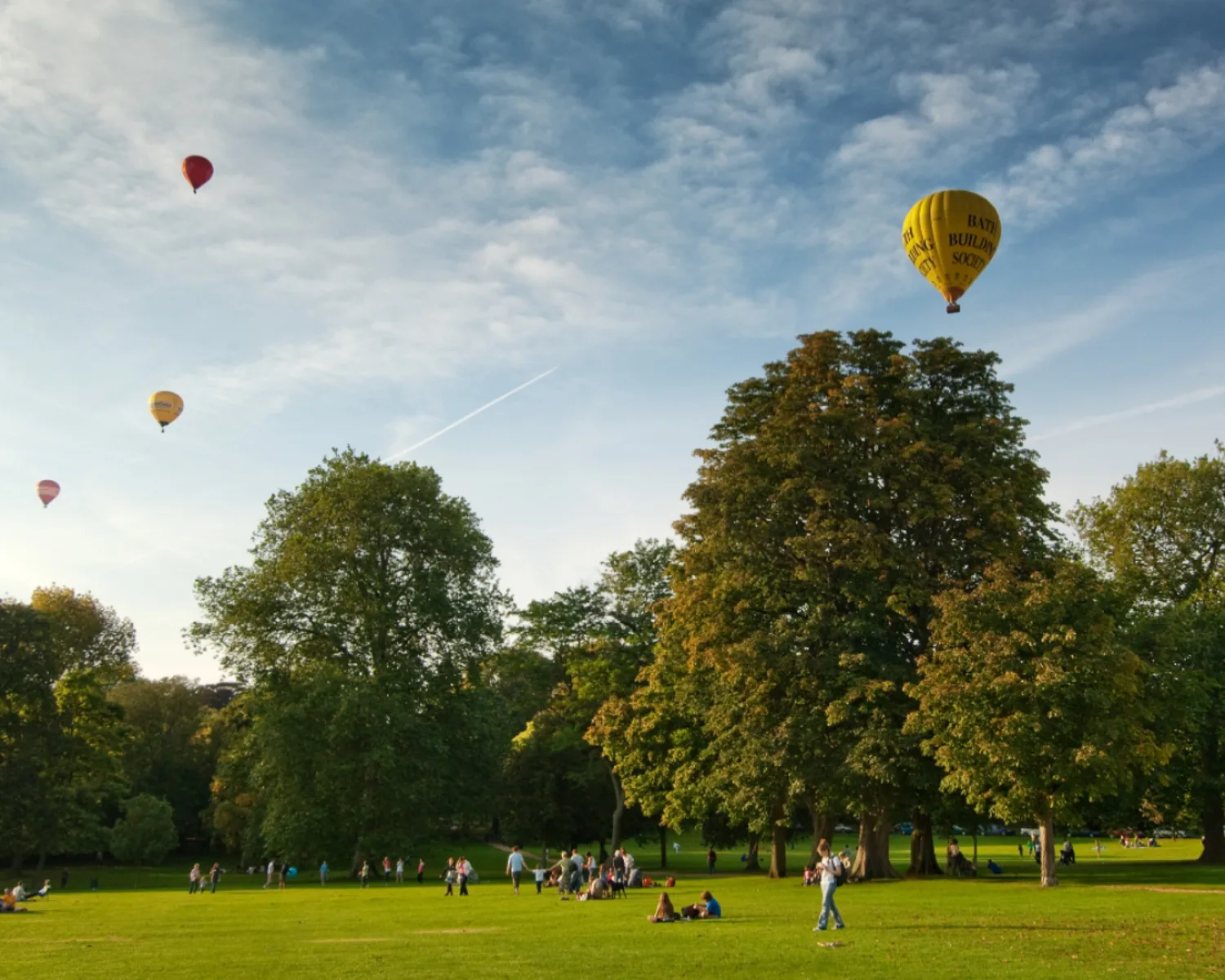
- On the left is a large area, which is often used for festivals, such as the Bath food festival, Oktoberfest and Bath on Ice at Christmas. Check for events on the Bath Council website.
- Just beyond the festival area is the Victoria Park Crazy golf and tennis courts, which can be booked on the Excel website. Look out for the floral bedding displays on the other side of Royal Avenue, below Brock Street.
- The path opens up past a Victoria bandstand, with views up to the Royal Crescent on the slope above. There’s a grassy area here that is ideal for a picnic, and in summer hot air balloons take off below the Royal Crescent.
- Crossing Marlborough Lane, you’ll pass The Urban Garden, a social enterprise garden centre set in a glasshouse and selling everything you need for your indoor and outdoor garden.
- On the other side of Marlborough Lane, the park continues with a large children’s playground and skatepark that will keep families happy for hours. On the slopes above the playground is a large duckpond.
- Also in this part of Royal Victoria Park are the Botanical Gardens, which are free to visit and include ornamental trees, sculptures and a pond.
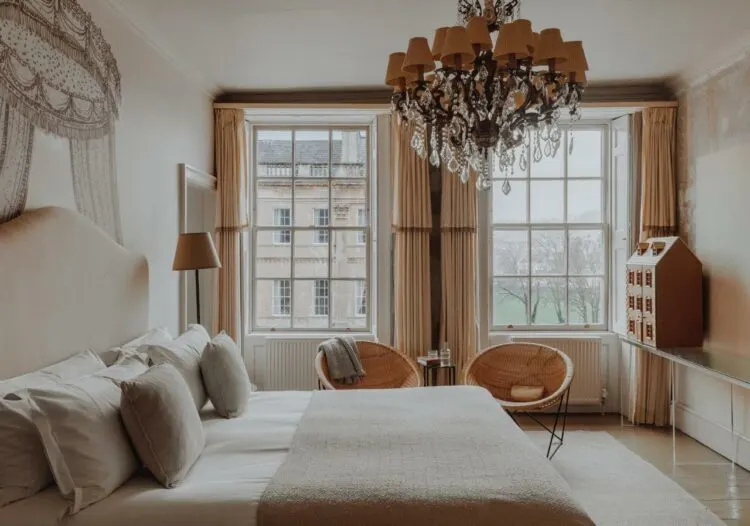
No 15 by GuestHouse in Bath is a luxury boutique hotel with spa perfect for romantic getaways
15. Holburne Museum
Without realising it, you may have admired the Holburne Museum featuring as Lady Danbury’s flower covered townhouse in the series of Bridgerton. Fans can take this tour of all the Bridgerton filming locations in Bath.
This elegant Georgian mansion was built in 1799 as the Sydney Hotel, surrounded by the Sydney Gardens, where visitors to Bath could promenade, take refreshments and attend dances in the hotel’s first floor ballroom.
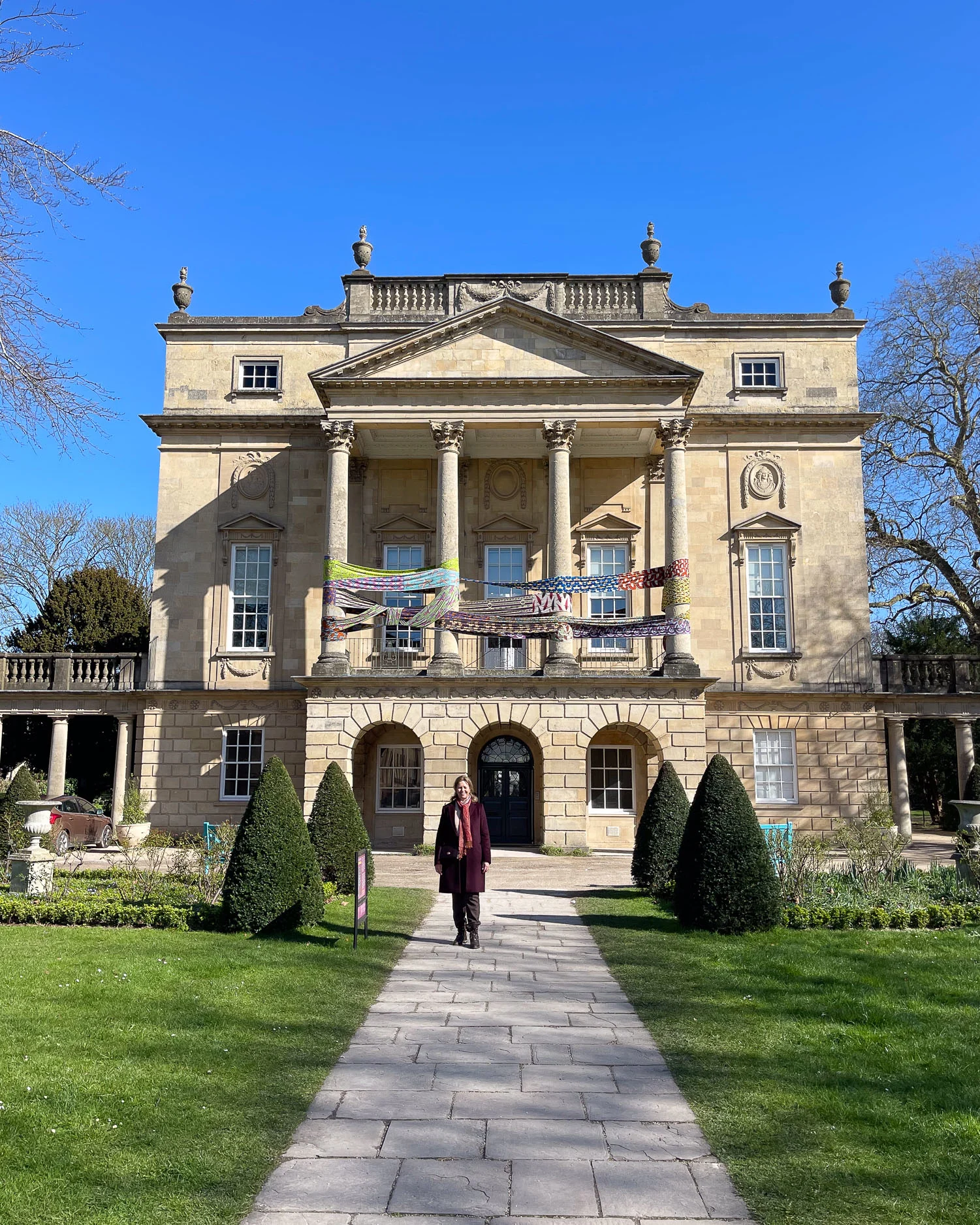
The heart of the museum’s collection came from Sir William Holburne, after whom the museum is named. Living in Bath, he amassed a large collection of objects, artworks and books, which were bequeathed on his death to the City of Bath.
The Museum has reopened after a long renovation, including a modern glass extension at the rear. It’s designed to reflect the surrounding mature garden and houses a ground floor cafe and 1st floor exhibition space.
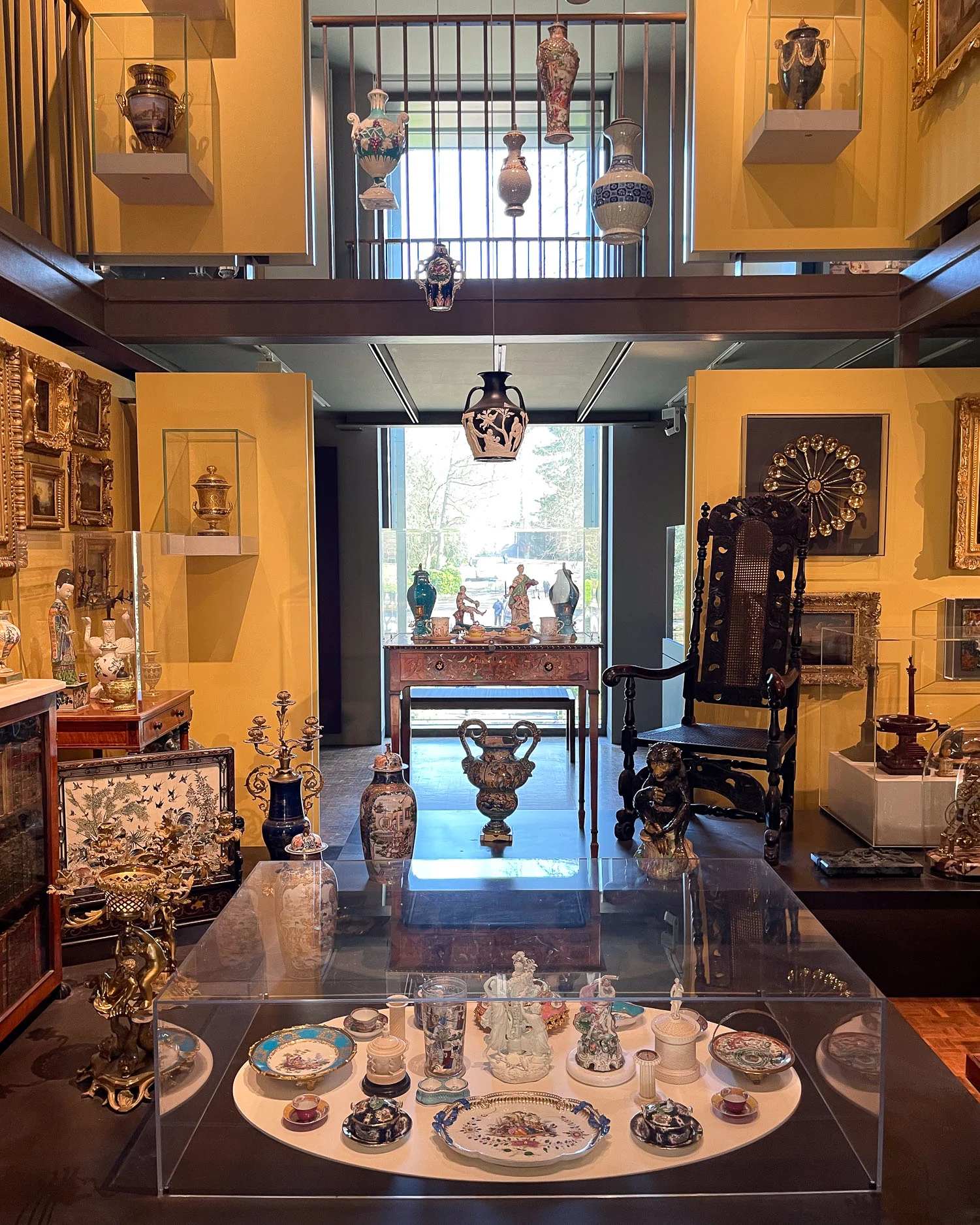
In the new extension is Sir William’s ‘cabinet of curiosities,’ with a selection of small objects he collected and information about his life. At the front of the mansion is the spacious ballroom, while the top floor is used for temporary exhibitions from contemporary and past artists.
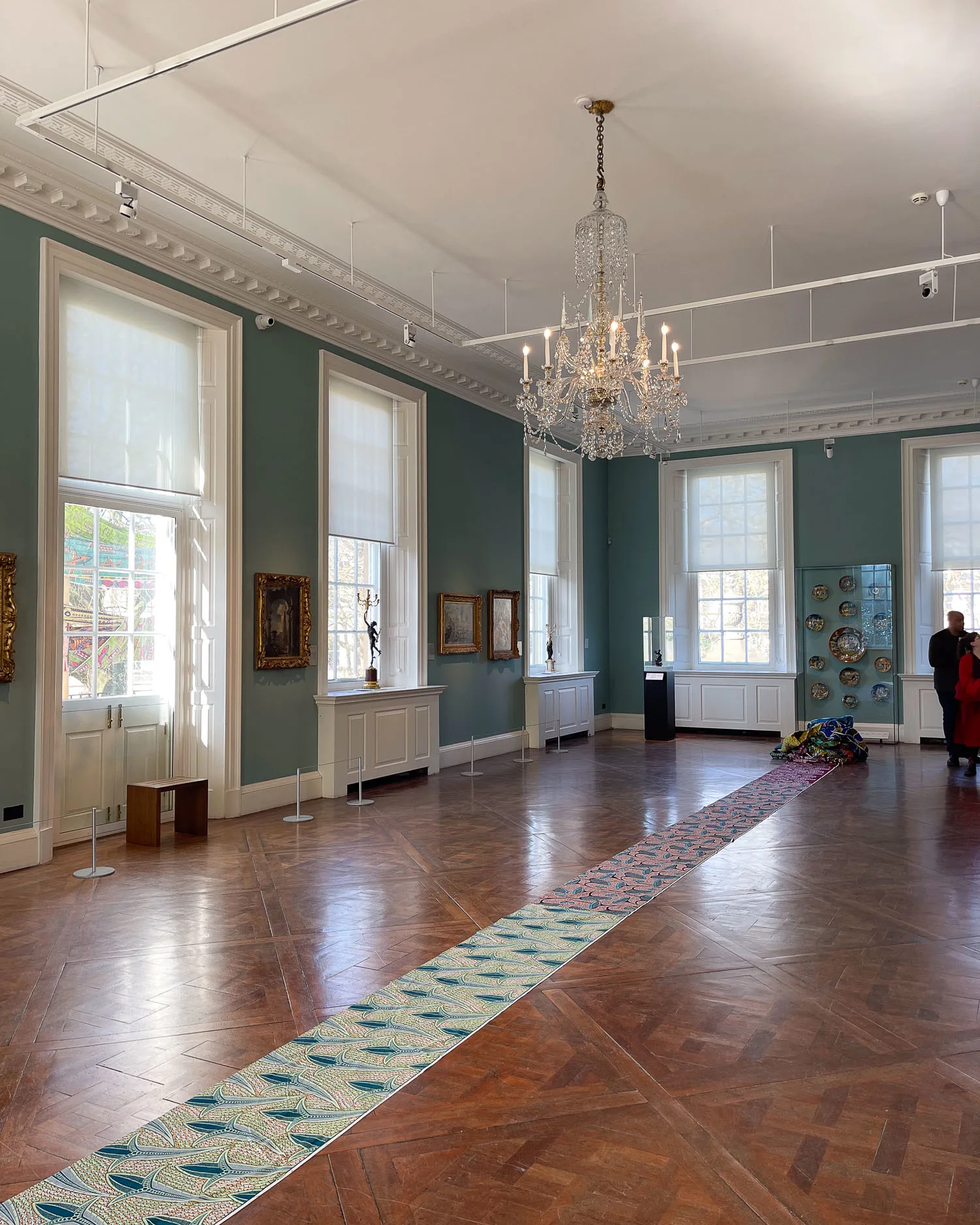
This is one of the most beautiful art galleries in Bath, with elegant portraits hung up the stairs, hosting regular musical and art events.
Tip: The ground floor cafe has a pretty outdoor terrace in the Sydney Gardens, which can be visited independently of the museum.
Open: Daily all year round Opening hours: 10am – 5pm
Ticket Price: Standard adult ticket from £11
Website: Holburne.org Address: Great Pulteney Street, Bath, BA2 4DB
16. Mary Shelley’s House of Frankenstein
Located in a Georgian townhouse, the Mary Shelley’s House of Frankenstein is dedicated to the life of Mary Shelley, author of the novel Frankenstein. The museum’s decor echoes the Frankenstein story’s dark Gothic horror theme.
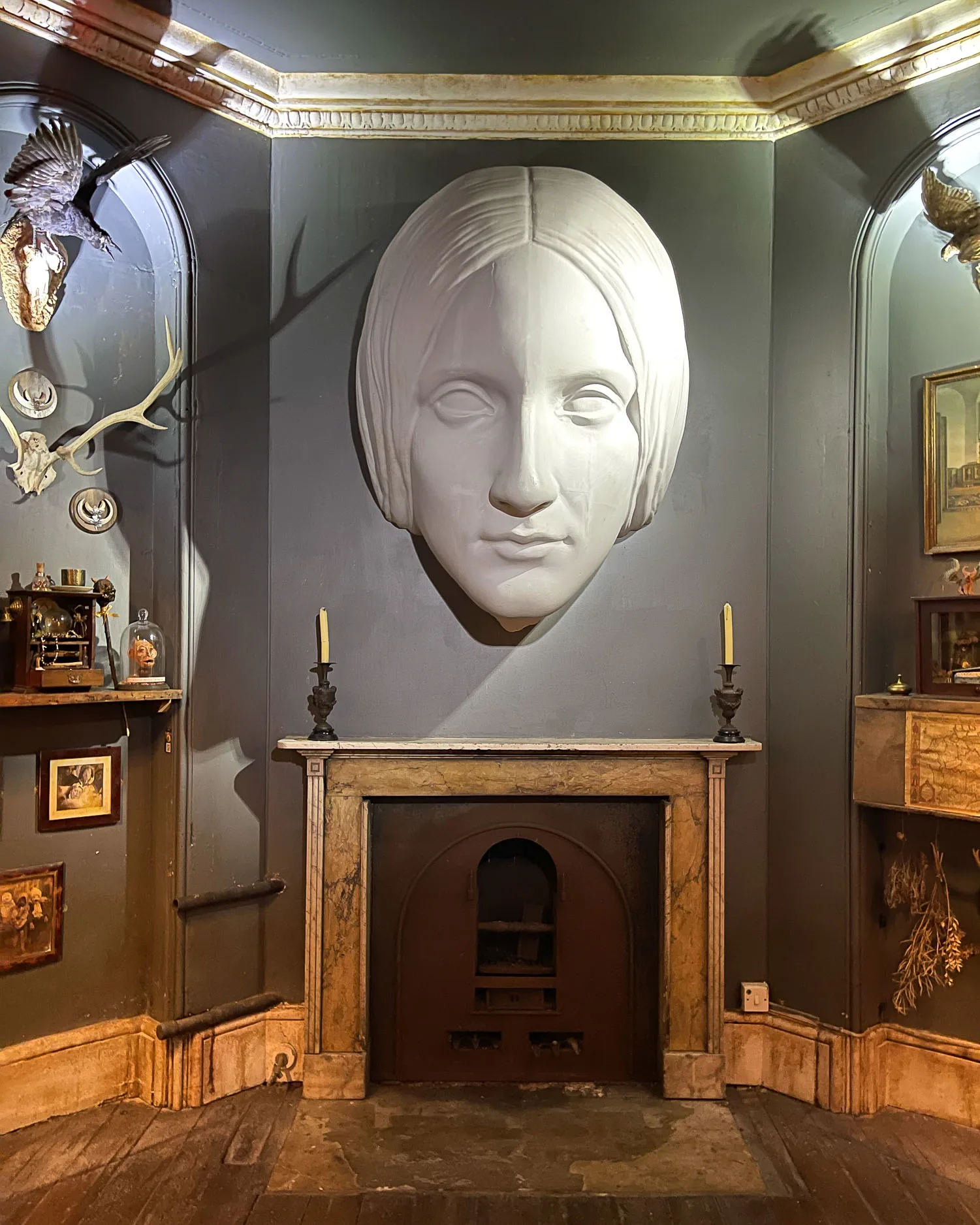
Mary Shelley wrote her novel in 1816, while resident in Bath, based on ghost stories that she and her friends told each other on a rainy holiday in Switzerland.
Each room of the museum is dedicated to a different part of Mary Shelley’s tragic life, with the loss of her young children and the death by drowning of her husband, the poet Percy Shelley.
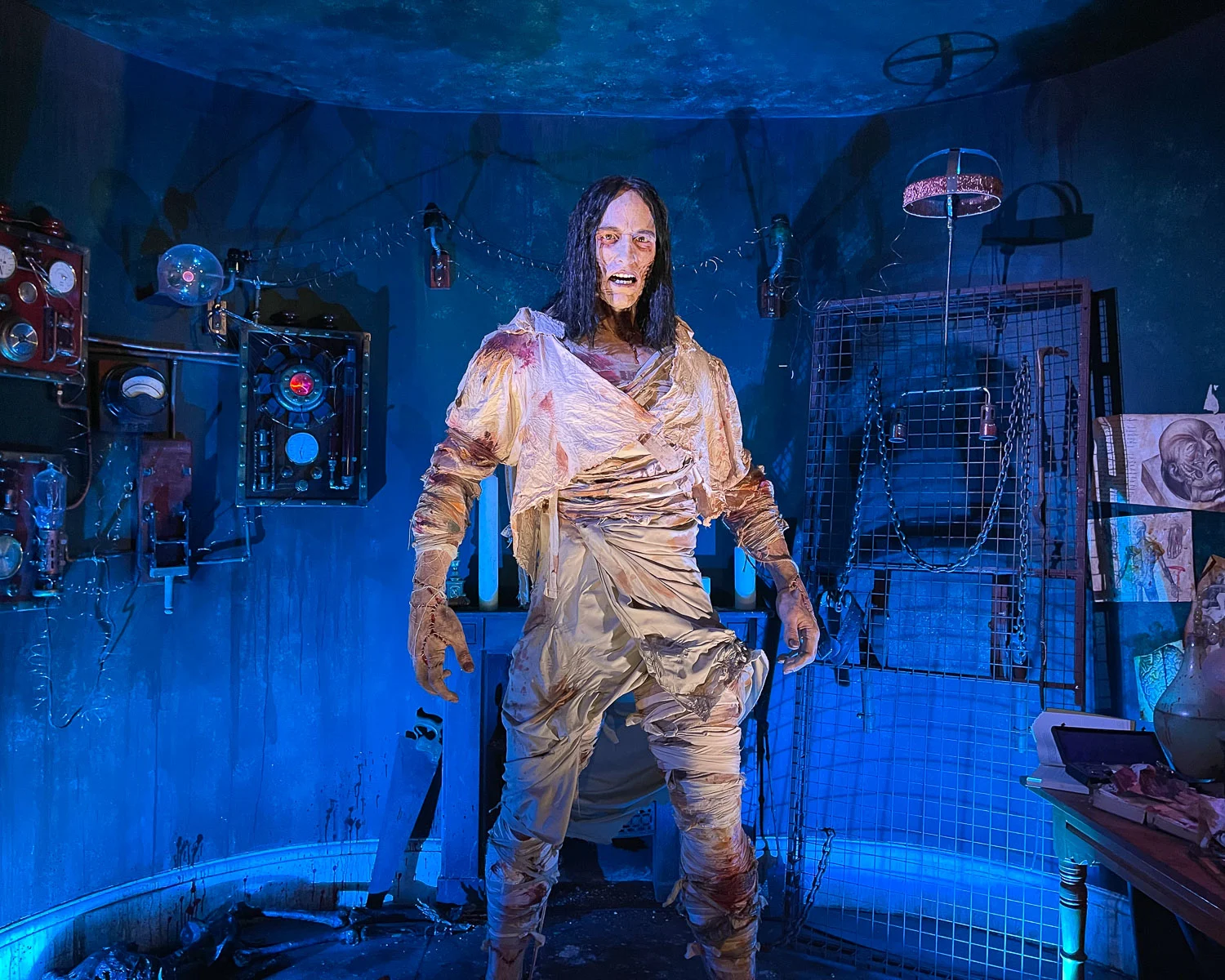
Mary Shelley’s imaginary creature, who was named after its creator Dr Frankenstein, breathes and moves in an eerie way within the museum’s walls.
The attic rooms display memorabilia from stage plays and films, showing the cartoon like monster of Frankenstein that we would recognise from old movie posters.
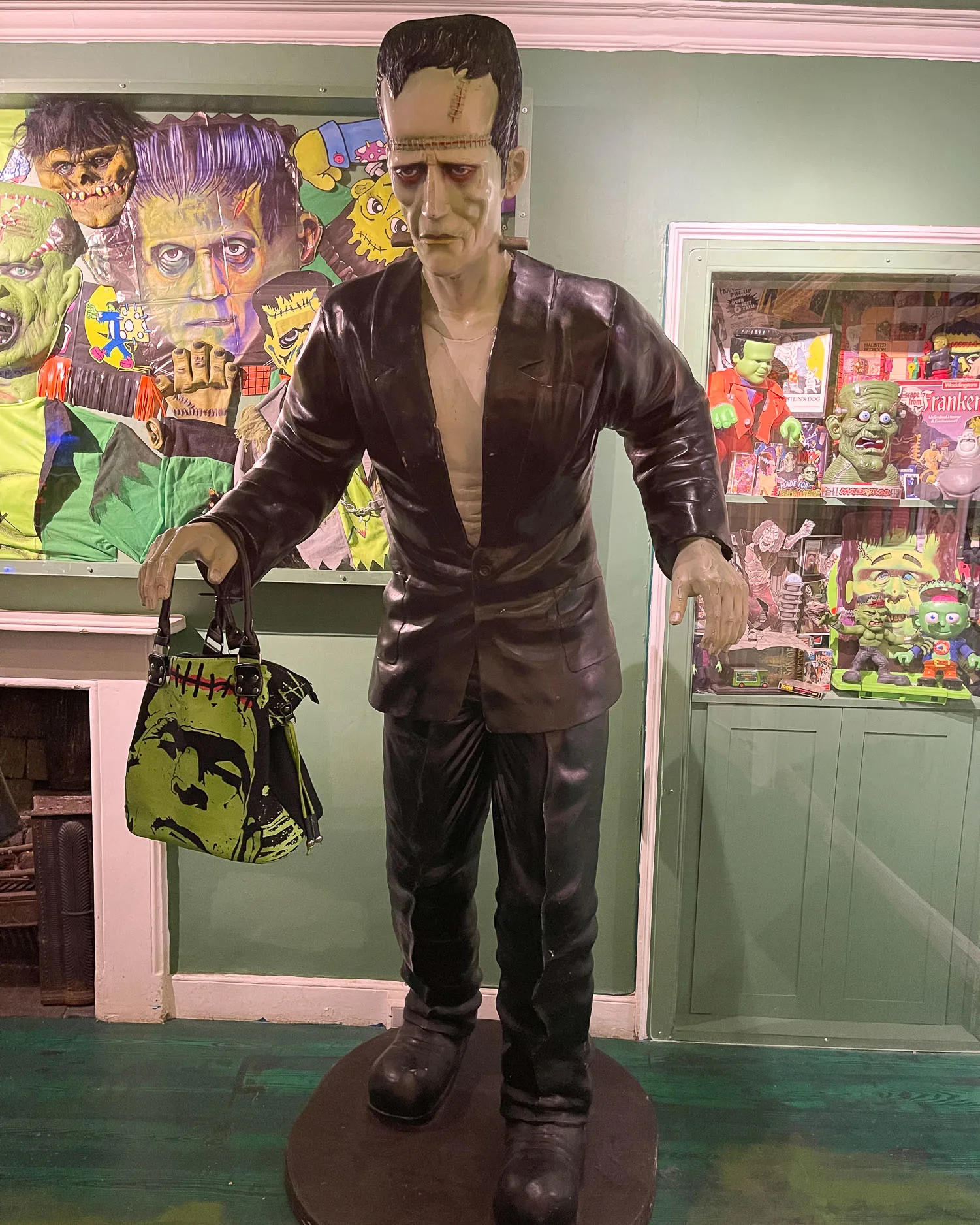
Take care if you visit the basement, where creatures lurk in the darkness to jump out and make you scream. This part of the museum is an optional extra, but if you scare easily (like me!), just stick to the more traditional museum information and exhibits.
Escape rooms are available in the basement and attic, that can be hired separately for groups of up to 7 people.
Read more in my article on 18 Exciting museums in Bath to visit
Open: Daily all year round. Opening hours: 11am – 5pm (longer opening Saturday and holidays)
Ticket Price: Standard adult ticket from £15.50. Buy your entrance ticket in advance here.
Website: Houseoffrankenstein.com Address: 37 Gay Street, Bath, BA1 2NT
17. Visit the smaller quirky museums
While the bigger museums in Bath get plenty of attention, it’s worth checking out some of the smaller quirky museums if you have time. Here are some of my favourite small museums in Bath that cast a spotlight on some less known aspects of life in Bath.
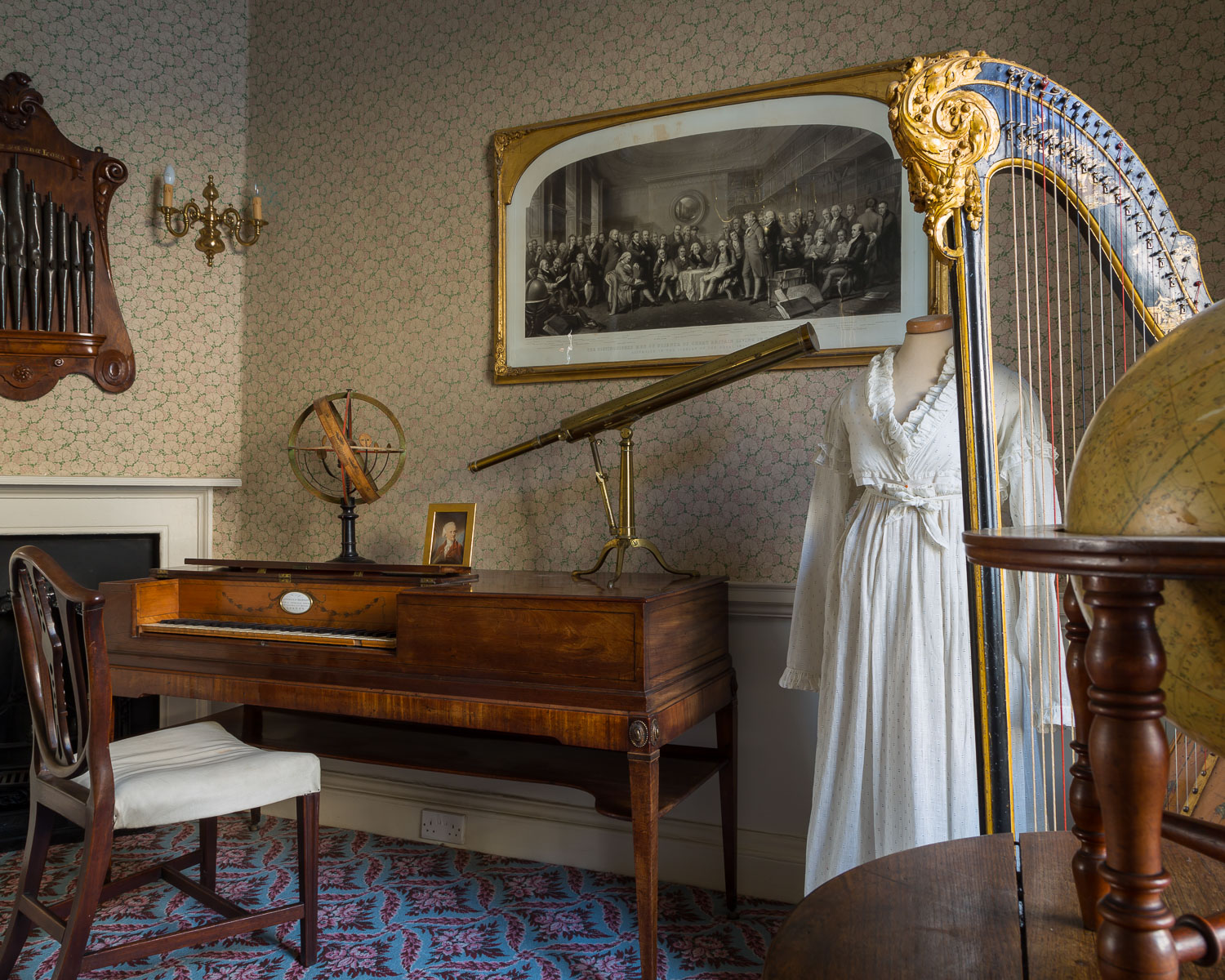
Herschel Museum of Astronomy
This Georgian house on a quiet street in Bath, was the home of brother and sister, William and Caroline Herschel. They both had a passion for astronomy, and it was here in 1781 that they discovered the previously unknown planet of Uranus.
The Herschel Museum is furnished as it would have been when the Herschels lived there, with a music room and basement workshop where William made astronomical instruments. Telescopes and globes from the period are on display, and the exhibition space tells the story of the Herschels and their discoveries.
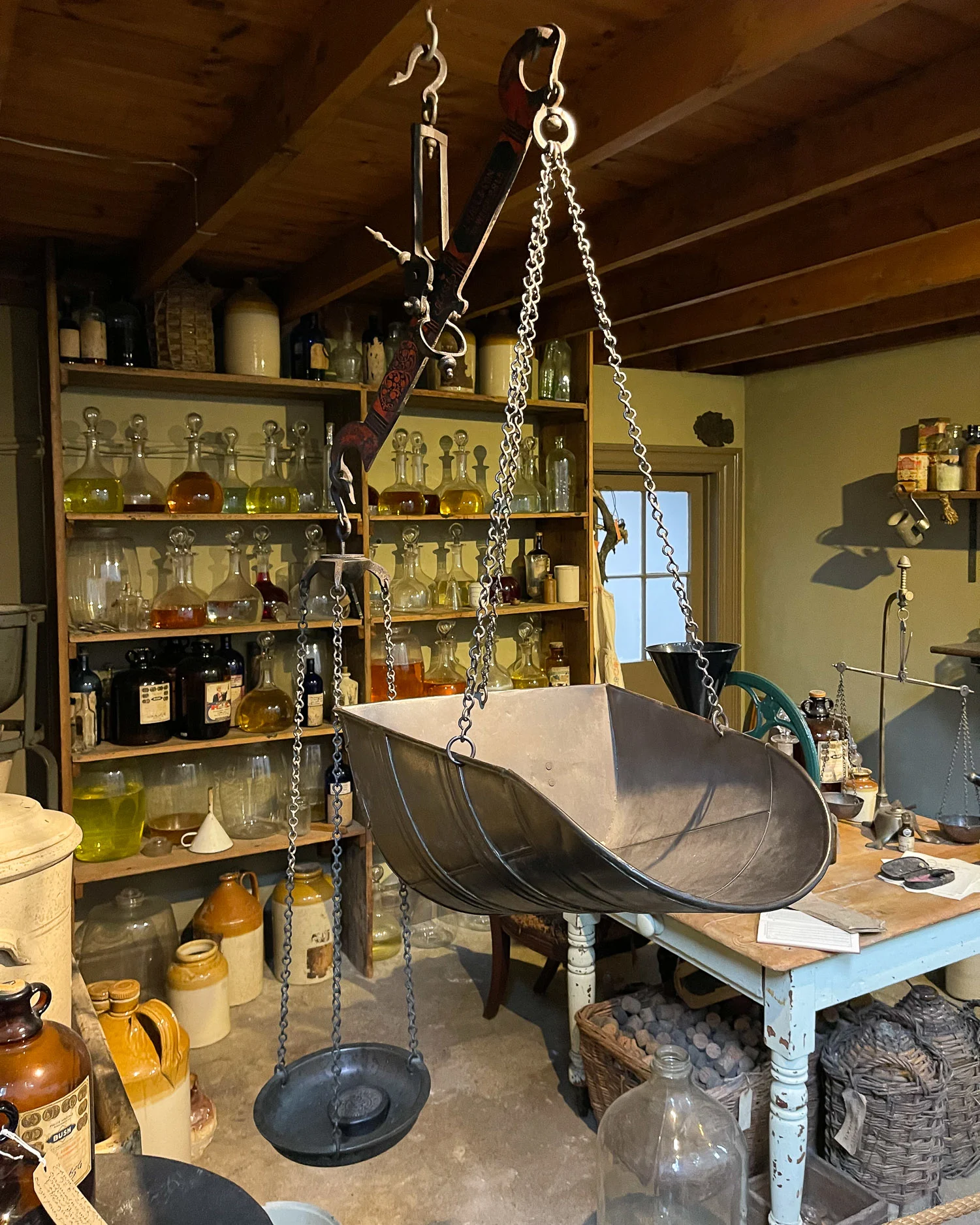
Museum of Bath at Work
While many of Bath’s museum celebrate the lives of high society and wealthy collectors, the Museum of Bath at Work offers up the everyday lives of the average man or woman. Here are the packed shelves of the grocer’s shop, tools crammed into a workshops for making and mending, or the typesettings of a printing press from the pre-digital age.
At the core of the museum’s collection is the Bowler engineering and soft drinks factory, with the entire contents of the old factory reconstructed here. There are numerous other displays about Bath’s trade and industry up to the present day.
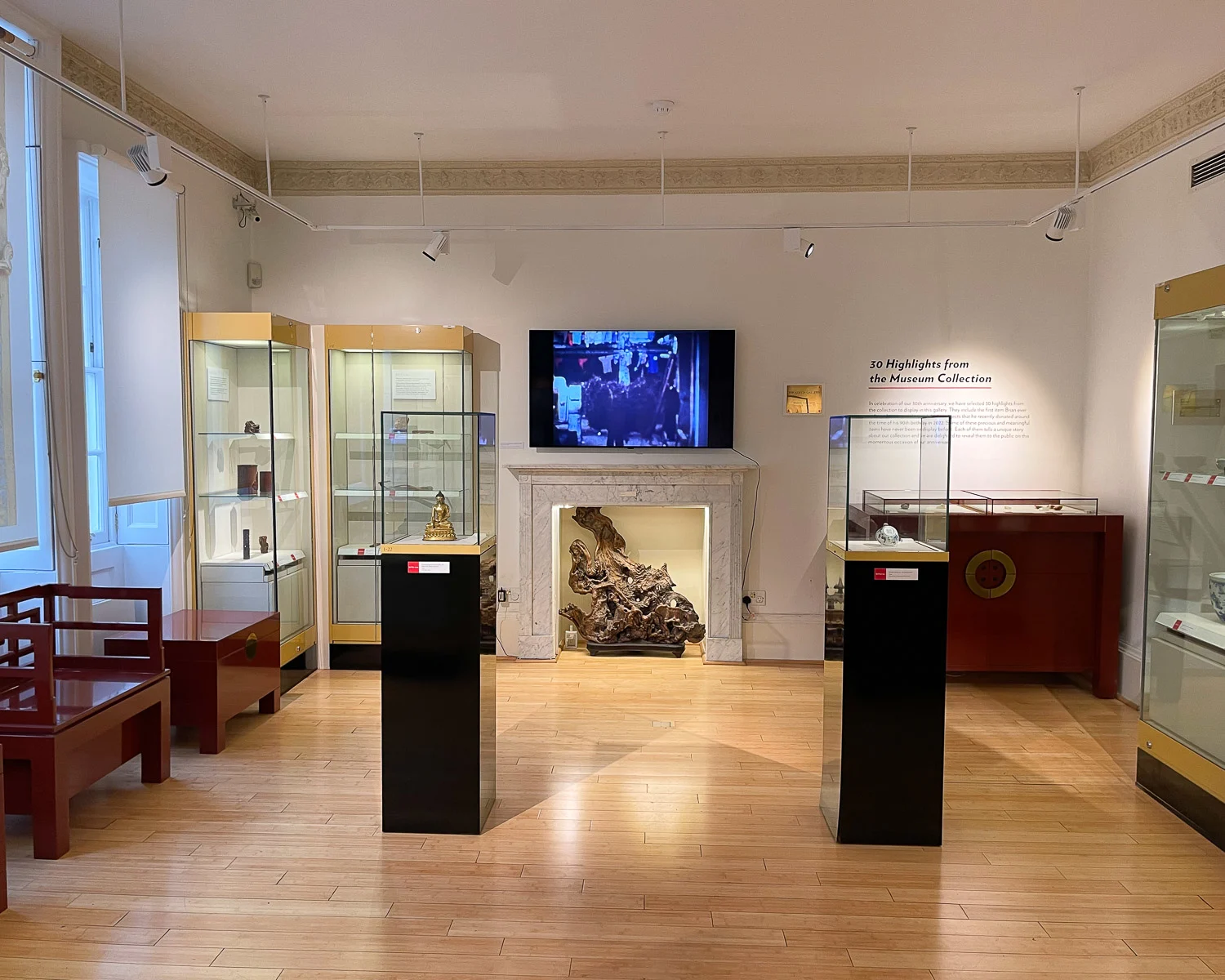
Museum of East Asian Art
Close to Bath’s Royal Crescent is the Georgian townhouse containing the privately owned Museum of East Asian Art. Its collection consists of 2,000 objects from East and South East Asia, covering jade, bronzes, ceramics and small collectables.
Many objects are from the personal collection of Brian McElney OBE, who was born and resided in Hong Kong for many years. There are many small and exquisite items in the permanent collection, while the ground floor has changing exhibitions that are connected to or inspired by items from the collection.
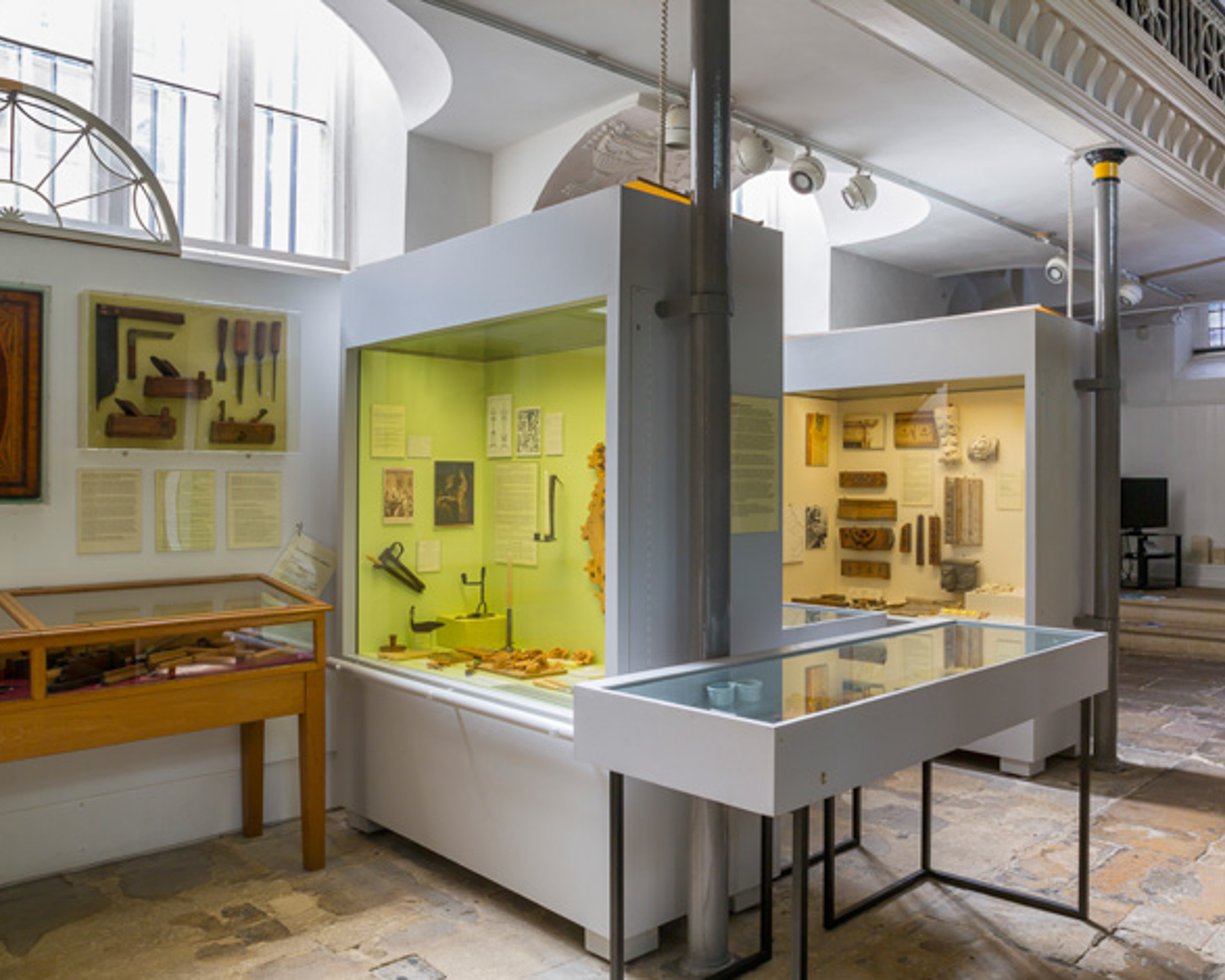
Museum of Bath Architecture
This museum celebrates the rich architectural history of Bath, as it was transformed from a small medieval town, to a fashionable spa in Georgian times. The museum is housed in a old chapel, built in the Gothic revival style in 1765 for the Countess of Hastings, who was an ardent Methodist.
Following a restoration, the Museum of Bath Architecture now houses a collection of maps, models, building fragments and architectural drawings. They show how 18th century architects and craftsmen turned Bath into an elegant location for Georgian high society. A scale model of Bath, gives a bird’s eye view of how the city developed.
Read more in my article on 18 Exciting museums in Bath to visit
18. Bath Skyline Walk
The Bath Skyline Walk is a 6 mile 3-4 hour circular walk on Bathwick Hill, which gives some lovely views over the city of Bath. This free walking trail is maintained by the National Trust, and you can download a walking map and route description from their website.
The start of the trail at the foot of Bathwick Hill, is around 20 minutes walk from Bath Abbey. Halfway through the walk, you can take a short detour to the American Museum, which has beautiful gardens and a cafe.
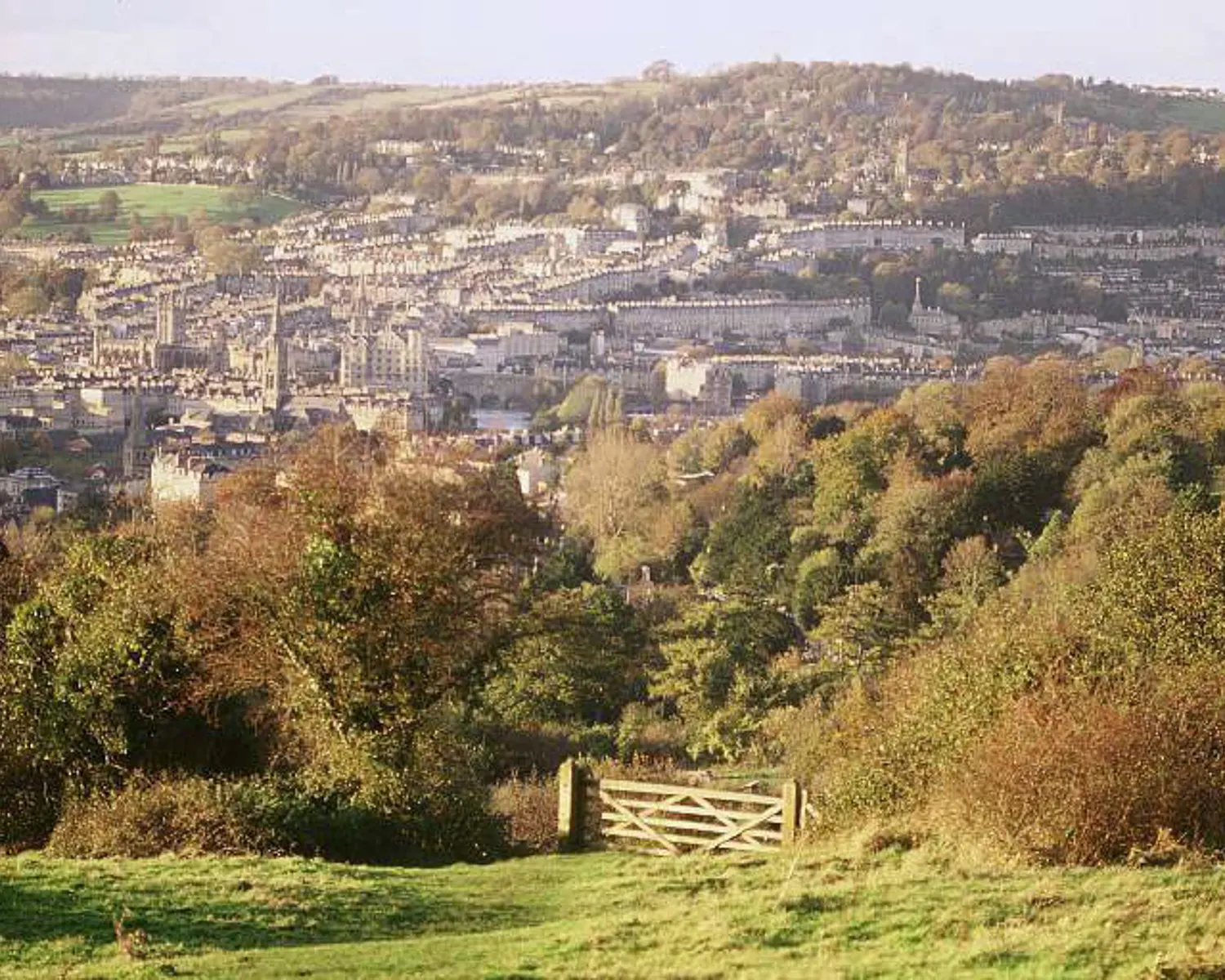
There’s also a shorter circular “Walk to the view” over the city of Bath which will take around 1.5 hours if you start at Bath Abbey.
This 3 mile version of the walk takes you over Pulteney Bridge, past the Holburne Museum and Sydney Gardens and along the canal, before you climb the Bathwick Hill to the viewpoint and return via the Parade Gardens.
Read about more walks from Bath: Walking on the Cotswold Way from Bath to Wotton-under-edge
19. Prior Park Landscape Gardens
Set on the hill above Bath is Prior Park Landscape Garden, a beautiful 18th century Landscape Garden, with lake and famous Palladian bridge. The mansion to which the garden belongs is a school (Prior Park College) and not open to the public, although you can get a view of it from the gardens.
Prior Park Landscape Garden sits in a steep wooded valley above Bath, offering magnificent views over the city. Both the mansion and gardens were built in 1734 by a wealthy local businessman Ralph Allen, in the style made popular by famous landscape gardener “Capability Brown”.
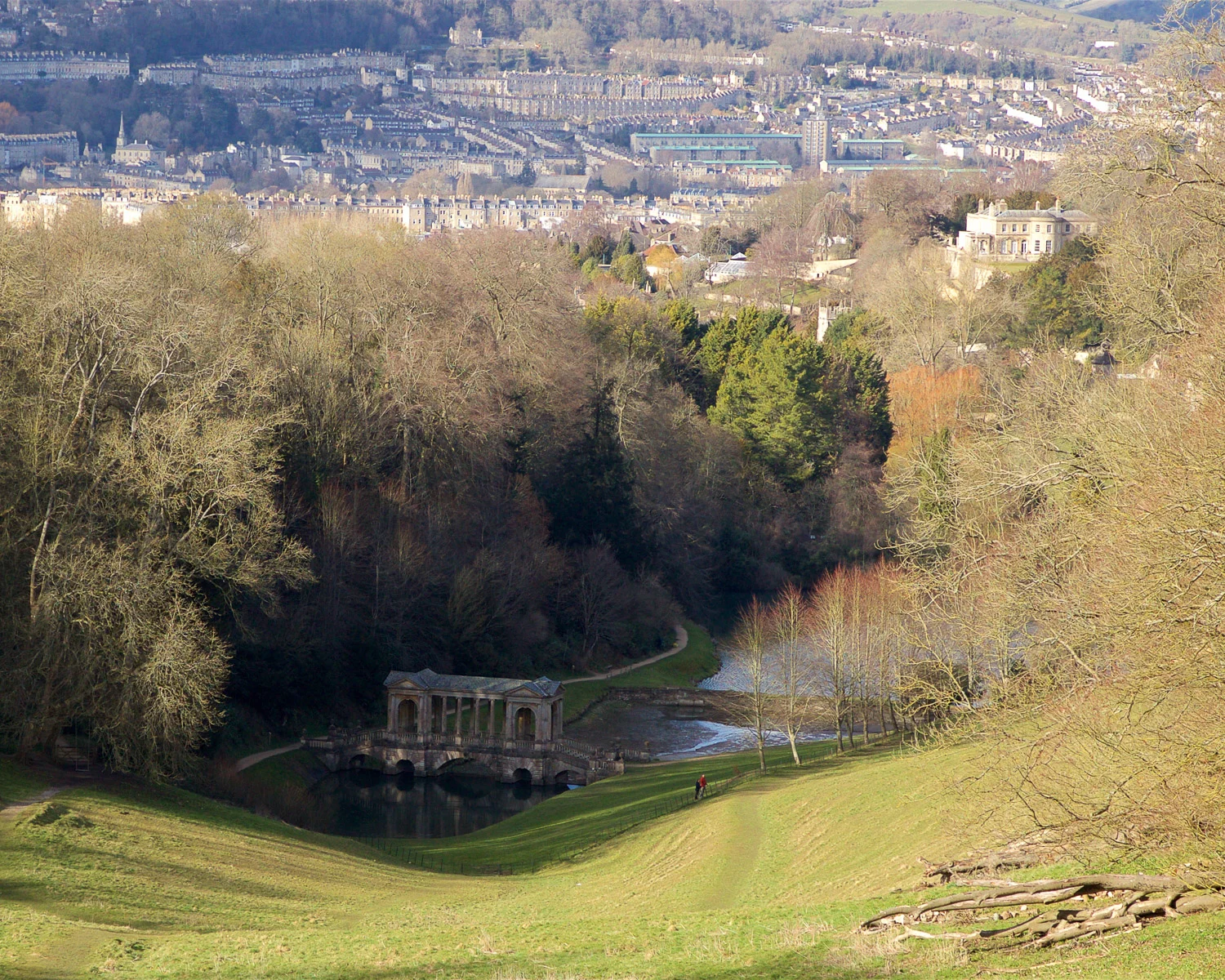
Don’t expect colourful flower borders in this garden, which is all about the hillside paths, woodland walks, cascades and vistas over the lakes and towards Bath. The garden epitomises the English landscape style which was popular in the 18th century, creating an idealised version of natural parkland.
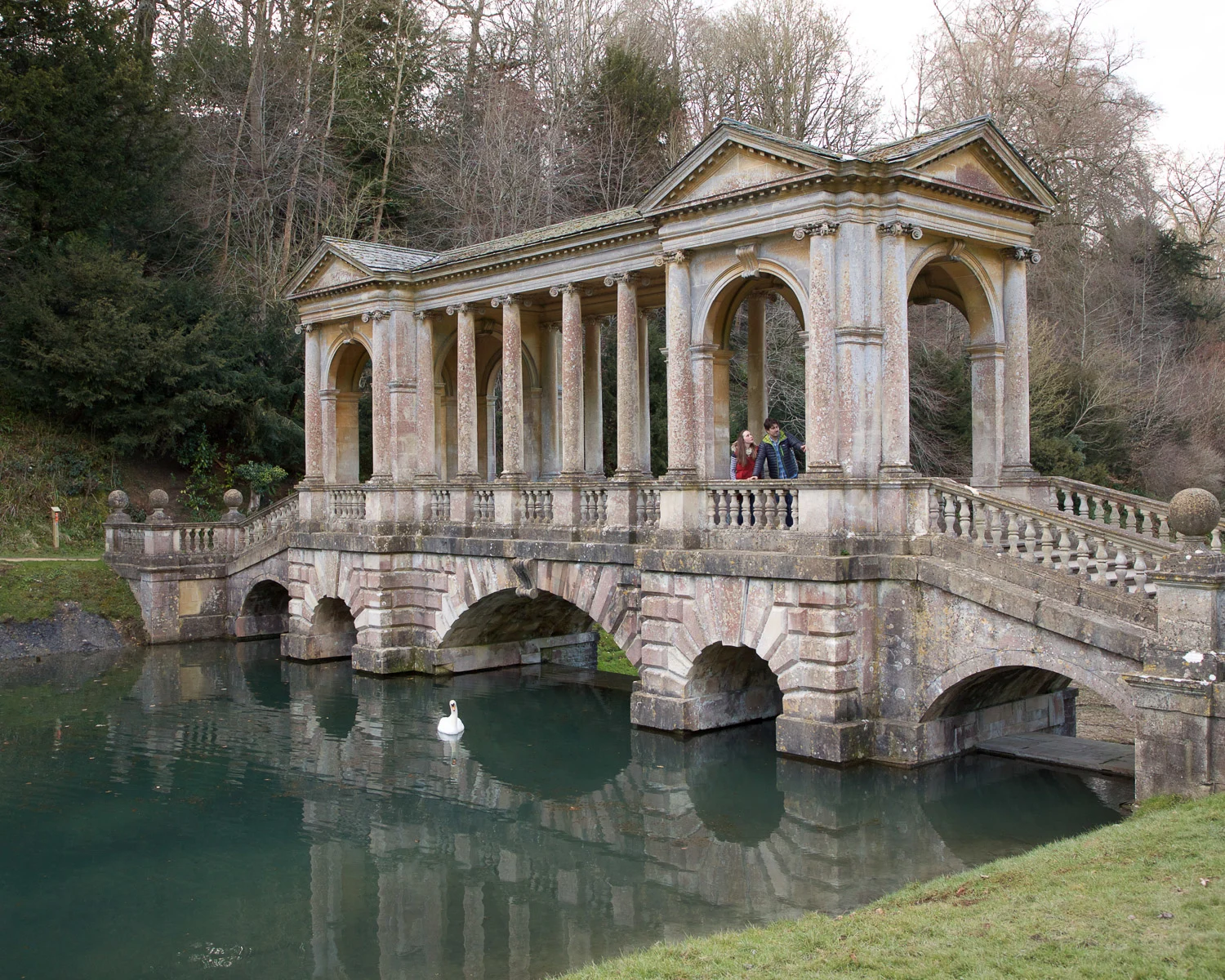
How to get to Prior Park
There is no on site parking at Prior Park, so it is best reached by No 2 bus from the city centre, or by walking a mile uphill from the station. The hop on hop off bus Skyline Route also stops at Prior Park.
If you’re taking the Bath Skyline Walk, it passes close by Prior Park which can be visited with a short detour.
Open: All year round at weekend, daily from Easter to end October. Opening hours: 10am – 5pm
Ticket Price: Standard adult ticket from £10 (free for National Trust Members).
Website: National Trust Prior Park Landscape Garden Address: Ralph Allen Drive, Bath, BA2 5AH
20. American Museum & Gardens
Located in a beautiful Georgian manor house just outside Bath, the museum features American decorative arts and temporary exhibitions with links to American culture. The permanent collections tell the stories of America, through quilts, folk art and furnishings, spanning 2000 years of American history.
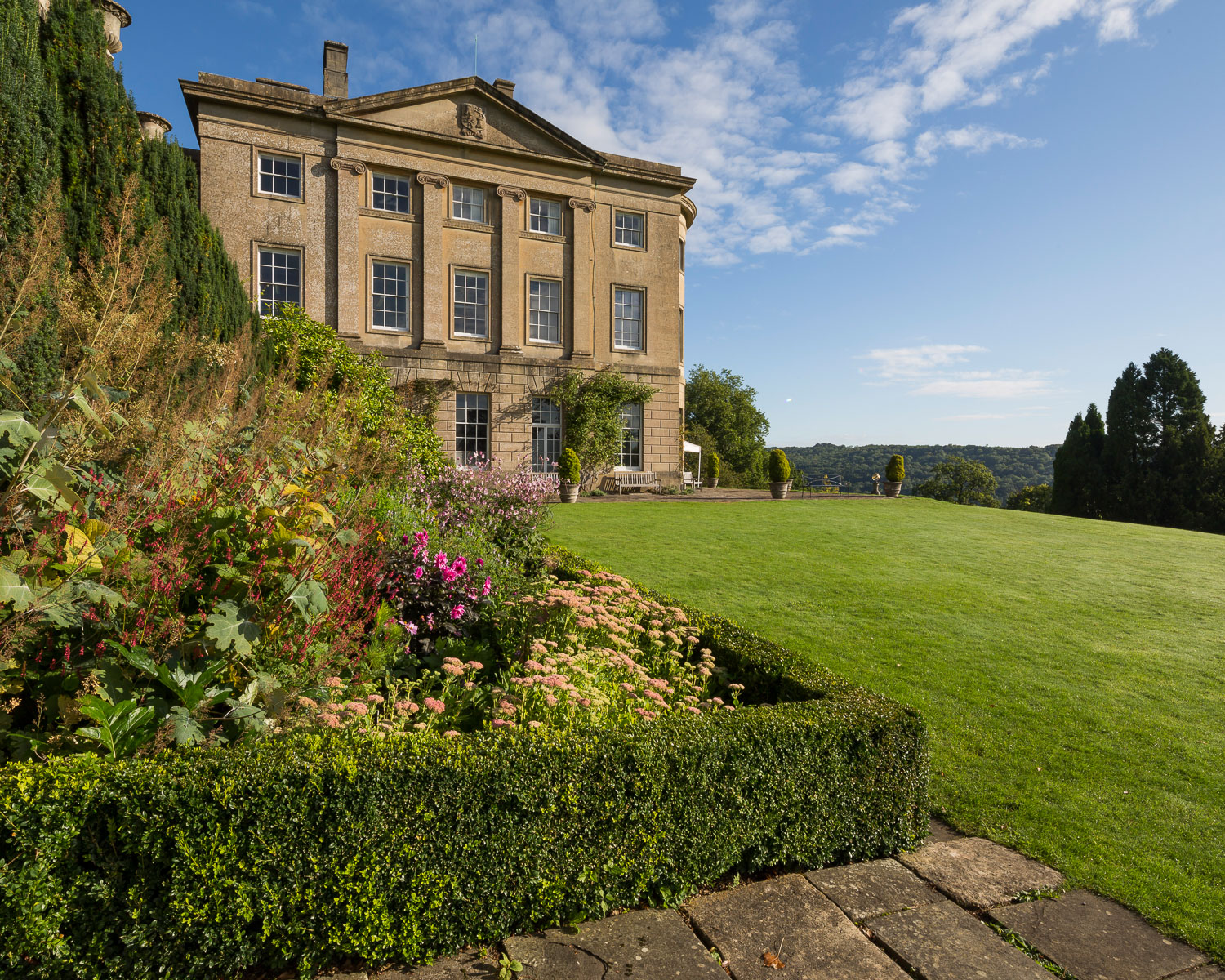
This Grade II listed house is surrounded by 125 acres of beautifully maintained gardens, with an arboretum, wilderness trails and children’s garden.
For coffee or lunch overlooking the gardens, stop by the American Garden deli with its outdoor terrace, serving American inspired food from produce grown in the gardens or sourced from local suppliers.
How to get to the American Museum & Gardens
The American Museum & Gardens can be reached on the U1 or U2 bus from Bath’s bus and railway stations to the University of Bath campus, then walking 15 minutes to the Museum.
It’s also a short detour from the Bath Skyline walk, if you wish to combine your visit with the walking trail. If travelling by car, there is free onsite visitor parking.
Open: From mid March – end December Tuesday – Sunday Opening hours: 10am – 5pm
Ticket Price: Standard adult ticket from £16.50
Website: Americanmuseum.org Address: Claverton Manor, Bath, BA2 7BD
21. Bath Christmas Market
The Bath Christmas Market is one of the largest and prettiest in the UK, with over 200 market stalls set in the squares and cobbled streets around Bath Abbey.
From end of November to mid December each year, the city is taken over by local artisans, festive foods, twinkling lights and Christmas music.
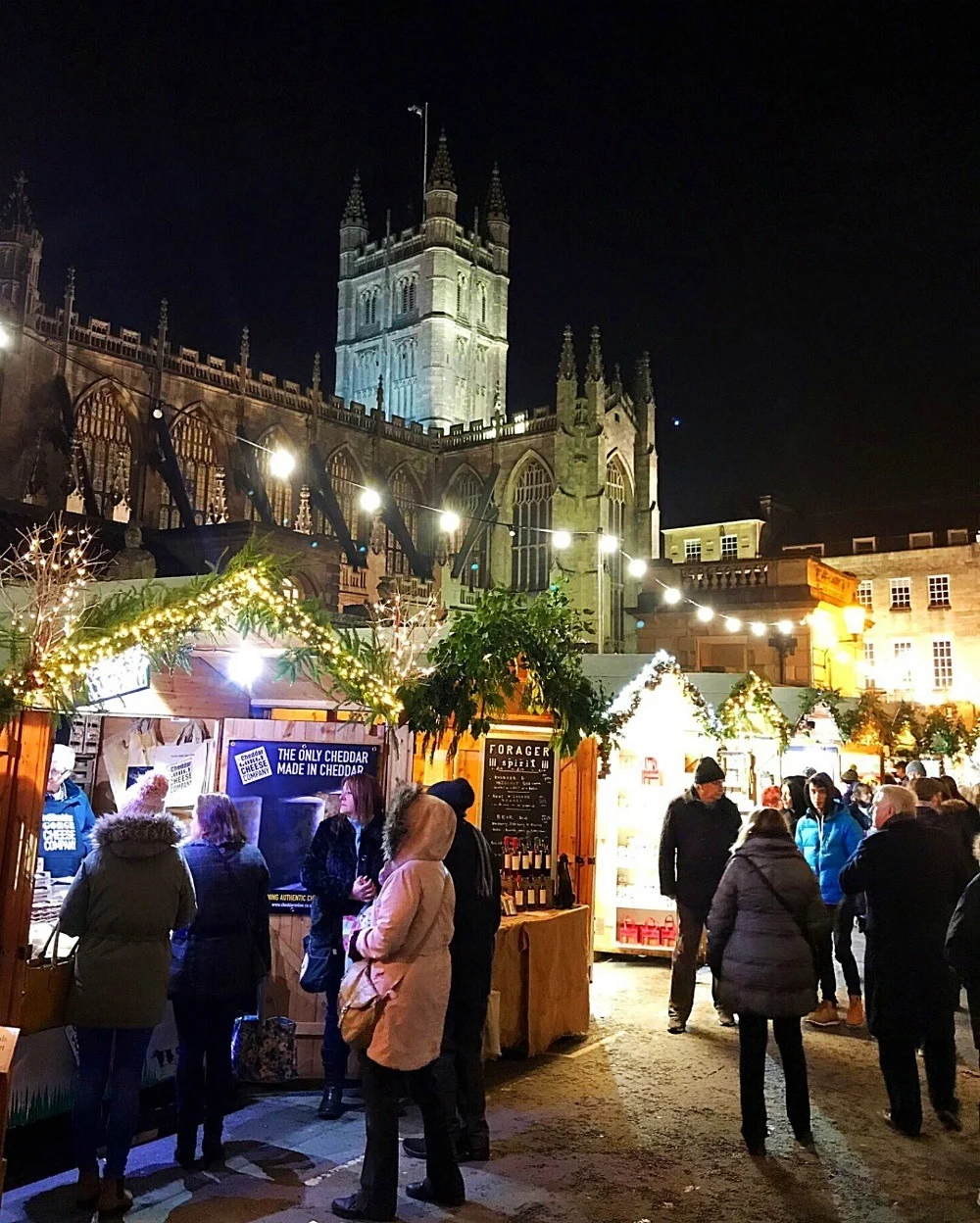
The heart of the market is the square beside Bath Abbey, where you’ll find stalls from local makers selling handmade gifts and foodie treats. In front of the Abbey stands an enormous Christmas tree, where street musicians perform to get you in the Christmas spirit.
The market extends into nearby Abbey Green, surrounded by old Georgian houses and a little tucked away in the oldest quarter of Bath. In the cobbled square, the stalls make a circle around the central plane tree, which is lit up with gently changing colours. You may catch one of the choirs singing carols in the square, creating a festive atmosphere.
Check the Bath Christmas Market website for details of stalls and entertainment during the Christmas market period.
Read more in my article: Christmas in Bath – Christmas markets and more!
Free things to do in Bath
If you’re on a budget and want to know what you can do for free in Bath, here are a few suggestions, some of which are also mentioned above.
Bath World Heritage Centre – This visitor centre about Bath’s Heritage attractions is free to visit. You can pick up a leaflet or download the app, to make a self guided tour.
Art Galleries – The Victoria Art Gallery‘s upstairs space (currently closed for renovations) housing the permanent collection is free to visit, although there is a charge for special exhibitions.
Free Museum entry – The Holburne Museum has free entry to their main collections after 3pm every Wednesday. The Sally Lunn Tea Rooms have a nominal 30p charge to visit the small basement museum, although free for seniors, children and anyone taking refreshments at the tea shop.
Free walking tours – The Mayor of Bath’s Honorary Guides give a free daily tours of Bath. No need to book, you can just turn up. Unlike most “free” tours, no tips are sought, so these tours are genuinely free, delivered by passionate volunteers.
Self guided audio tours of Bath – Also try the free audio walking tours available on the Bath World Heritage App and the free self guided Jane Austen walking tour offered by Visit Bath
Parks and gardens – there are many parks, gardens and green spaces in Bath, notably Victoria Park, Sydney Gardens and Henrietta Park.
Walk the Bath skyline – try the “Walk to the view” covering some of Bath’s sights as well as the views from Bathwick Hill, or the longer Skyline walk passing the American Museum and Prior Park.
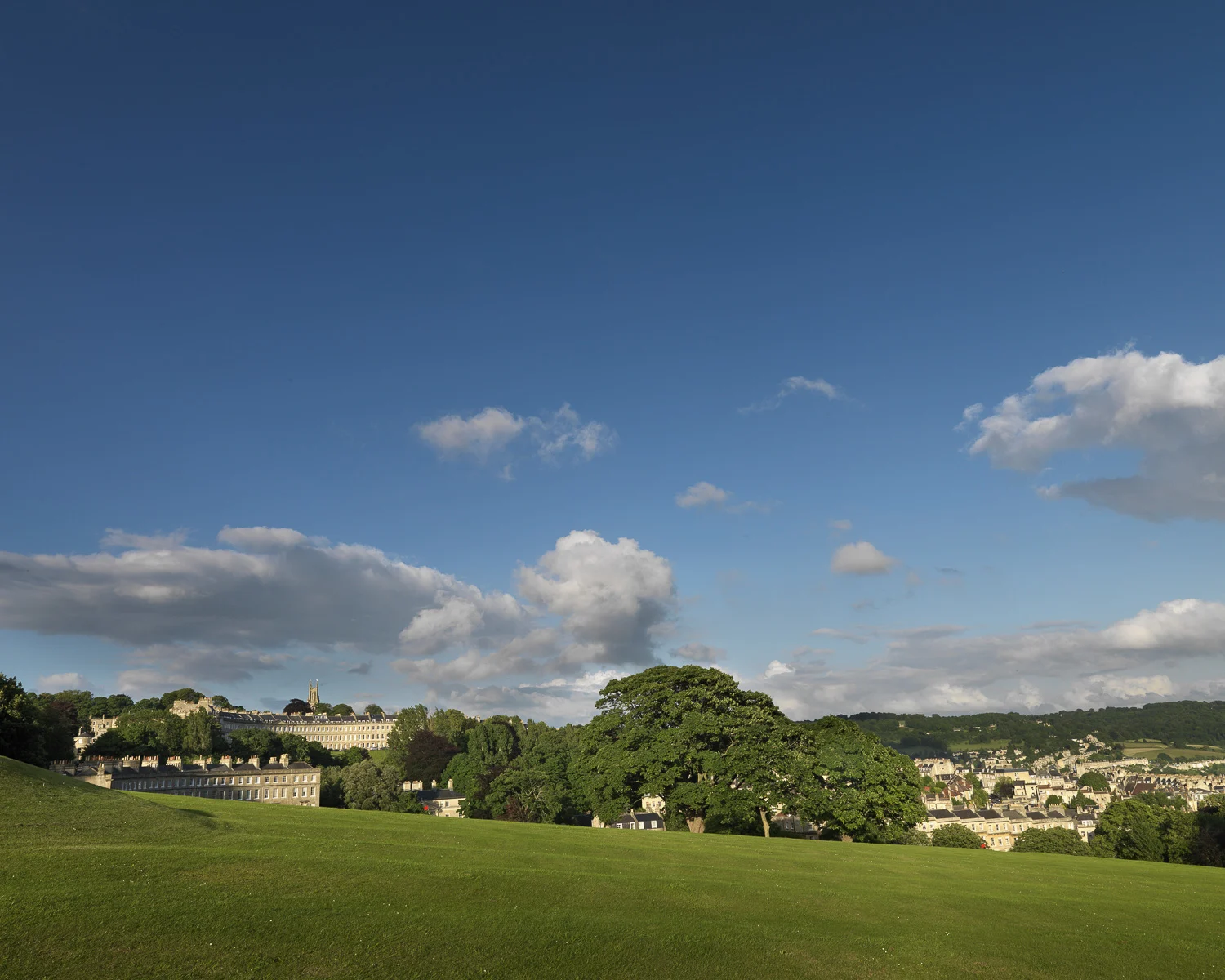
Take a day trip from Bath
There are many more places to visit near Bath, that can be reached in under an hour and often easy to get to by train.
Bristol
One of my favourites as I live there! Larger and more lively than Bath, there’s so much to see in Bristol, from the buzzing Harbourside to the village atmosphere and suspension bridge in Clifton. Regular direct trains take you there from Bath in around 20 minutes.
Read my article: 25 fun things to do in Bristol with your friends
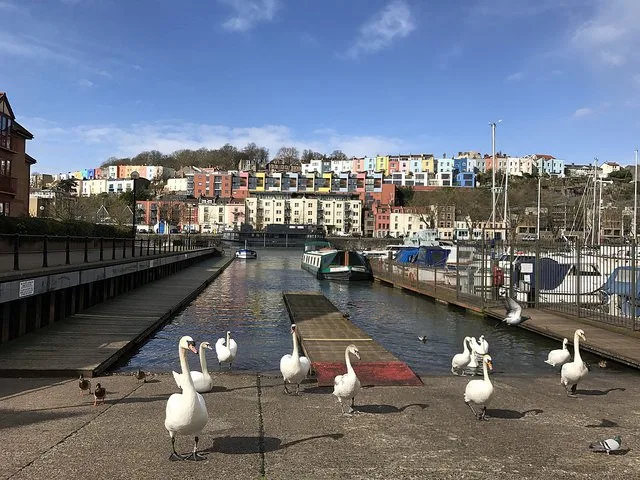
Bradford-on-Avon
Closest of the things to do near Bath is the pretty small town of Bradford-on-Avon, with its Medieval stone bridge crossing the River Avon. Regular direct trains take you there from Bath in around 15 minutes.
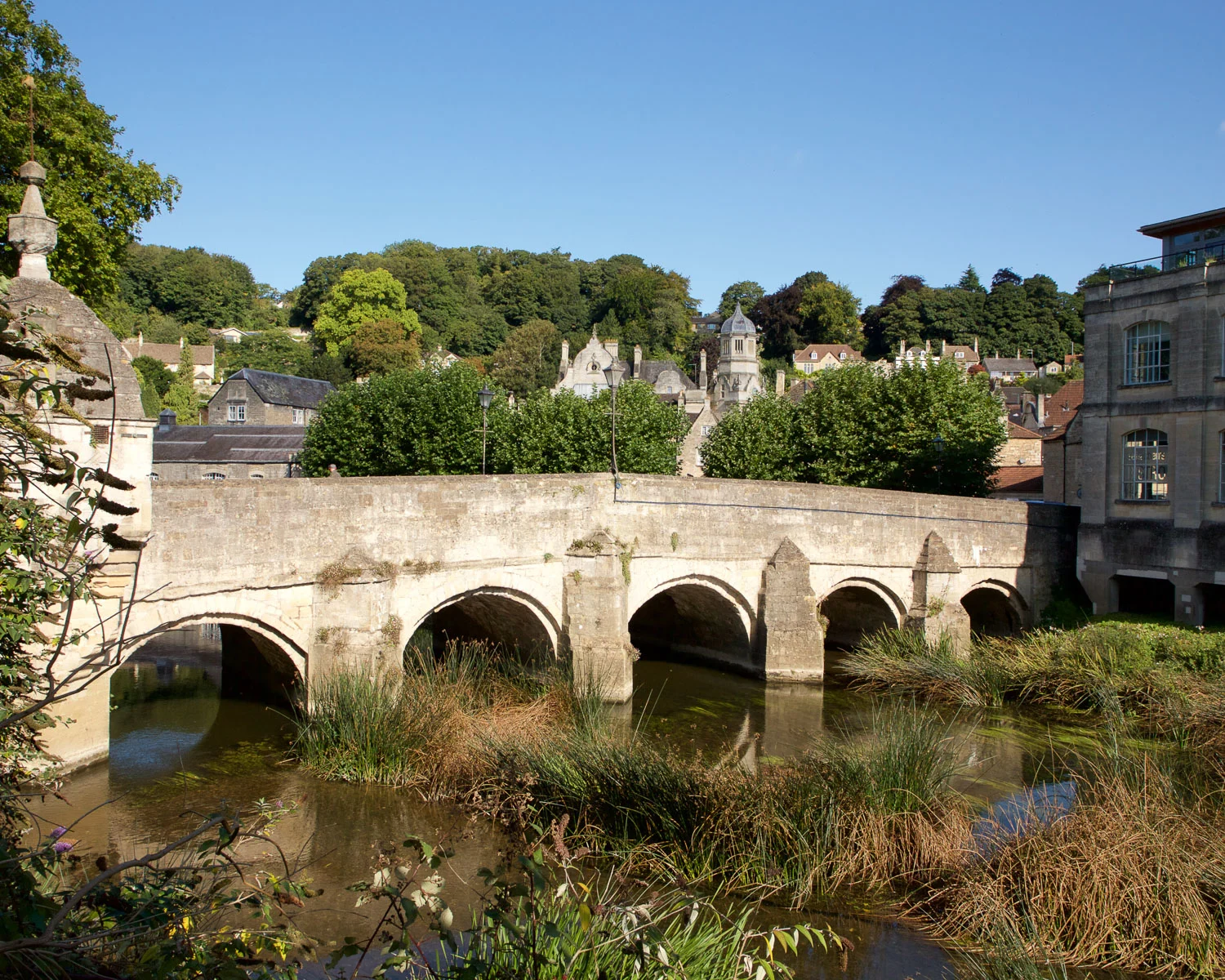
Lacock
The picturesque Medieval village and Augustinian abbey are managed by the National Trust, featuring in many films from Downton Abbey to Harry Potter. Lacock is around 45 minutes from Bath by car, or you can get there by bus with a change at Chippenham. For an easy day out, take this day tour to Lacock that also incudes Stonehenge and Castle Combe.
Cheddar Gorge
Cheddar village is set in a steep sided gorge and is the home to the famous Cheddar cheese. Visit the Cheddar caves and take an easy cliff top walk around the edge of the gorge. Cheddar is around an hour’s drive from Bath
Ilford Manor Gardens
These romantic 19th century gardens are close to Bradford-upon-Avon, and can be reached on the No 54 bus from Bath.
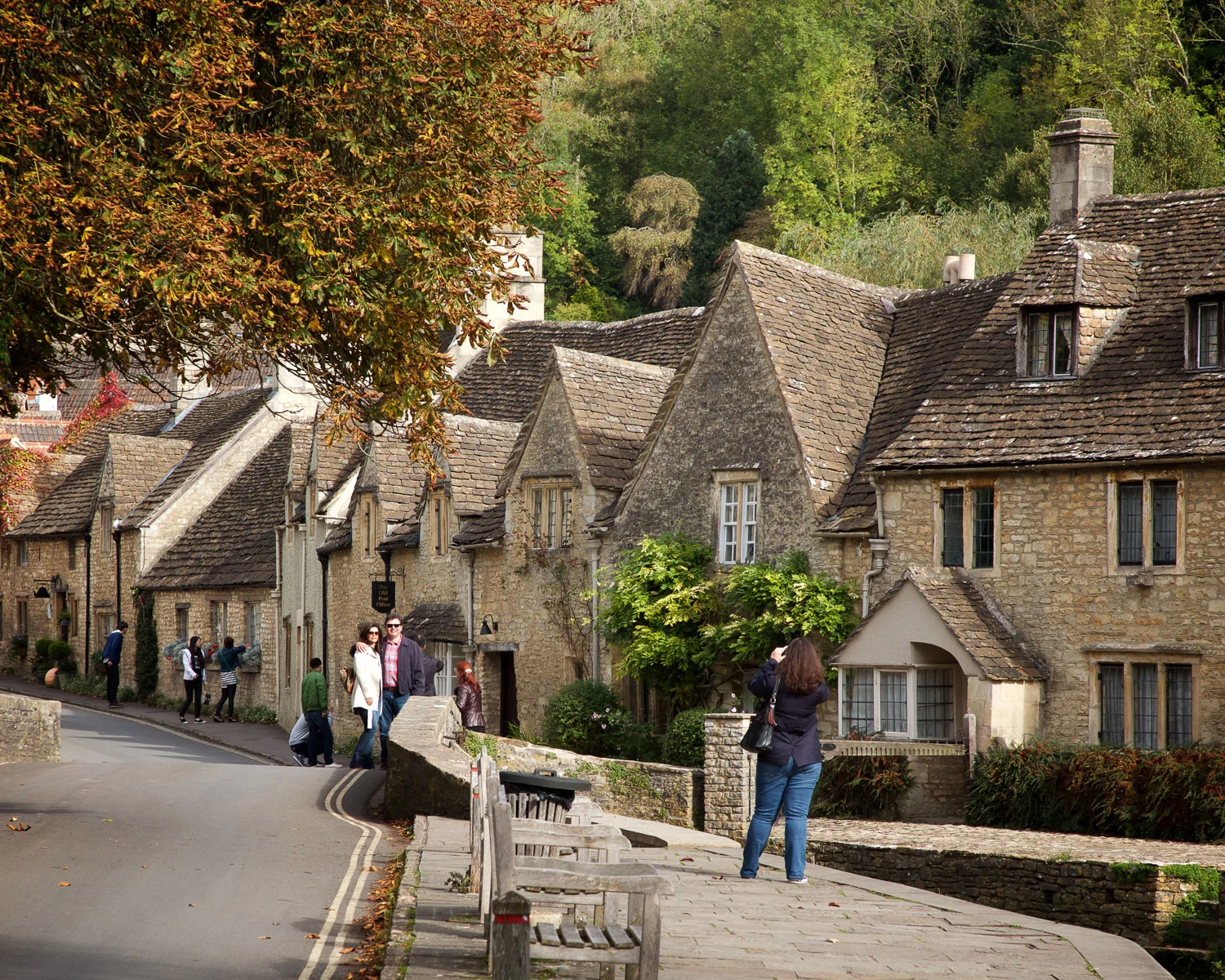
Castle Combe
This honey stone Cotswold Village is often used as a film location. Nearby is Castle Combe race circuit, a car racing track set on an old airfield. Castle Combe is 45 minutes by car from Bath, or visit on this day tour that also includes Stonehenge and Lacock.
Stonehenge
The ancient stone circle was created 4000 years ago, with a visitor centre to tell you about its history and legends. It’s around 1 hour by car or take this day tour to Stonehenge from Bath.
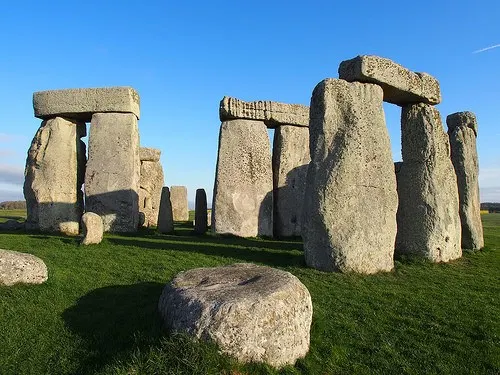
Recommended hotels in Bath
Here are some of our recommended hotels in Bath, with something for all budgets. I’ve ordered them from the affordable but stylish to the spoil-yourself luxurious.
Read more in my separate article: Where to stay in Bath: Best neighbourhoods and hotels

The Z Hotel in Bath is a modern budget hotel with compact rooms but central location

The Griffin Inn in Bath features asffordable bedrooms above a comfortable and stylish Georgian pub

Hotel Indigo in Bath is a boutique style mid range hotel close to the sights

The Queensberry Hotel is a luxury boutique hotel in a Georgian townhouse with award winning restaurant

No 15 by GuestHouse in Bath is a luxury boutique hotel with spa perfect for romantic getaways

The Royal Crescent Hotel & Spa is Bath’s ultimate 5 star luxury stay in the heart of the Georgian Royal Crescent
How to get to Bath
By Train
Bath is easy to reach by train, and this is probably faster than either coach or car. Bath Spa is on the mainline from London Paddington to Bristol Temple Mead. You can also access Bath from many other UK locations by changing at Swindon or Bristol. The train from London to Bath takes around 1hr 20 mins, making it easily feasible as a day trip.
We personally use and recommend using the Trainline website, as an easy way to book trains around the UK.
By Coach
There is good access to Bath by coach from Bristol, London, Cardiff and many other major cities. Check out coach providers National Express and Flixbus for routes and timetables.
By Car
The central part of Bath has restricted car access and limited parking. It is better to leave your car at one of the three main Park & Ride car parks at Lansdown (if coming from the M4 and north), Newbridge (if coming from Bristol and the west) or Odd Down (if coming from the south). You park for free but pay for the return bus ride into town.
If you prefer to park closer to the Bath city centre, there is a large car park at Charlotte Street Car Park which is close to Victoria Park and the Royal Crescent, as well as a few smaller car parks around the city perimeter.
If you need to rent a car, compare the best deals on Rentalcars – we recommend always checking the ratings and reviews before you book.
By Air
The closest airport to Bath is Bristol Airport, which is around 30km away and takes about 45 minutes by car or 1 hour by bus. You can take the frequent Airport Flyer bus from the airport to Bristol Temple Mead Station and from there take one of the regular trains between Bristol and Bath. Direct buses also operate between Bristol Airport and Bath city centre.
The alternative airports for Bath are Exeter, Cardiff or London Heathrow.
Read Next
For more about Bath read my article on the 18 Best Museums in Bath
Read more articles about Bath
Where to stay in Bath: Best neighbourhoods and hotels
The Roman Baths in Bath: what to see when you visit
How to find a fabulous spa break in Bath
Christmas in Bath: Christmas markets, what’s on and more!
Pin it!
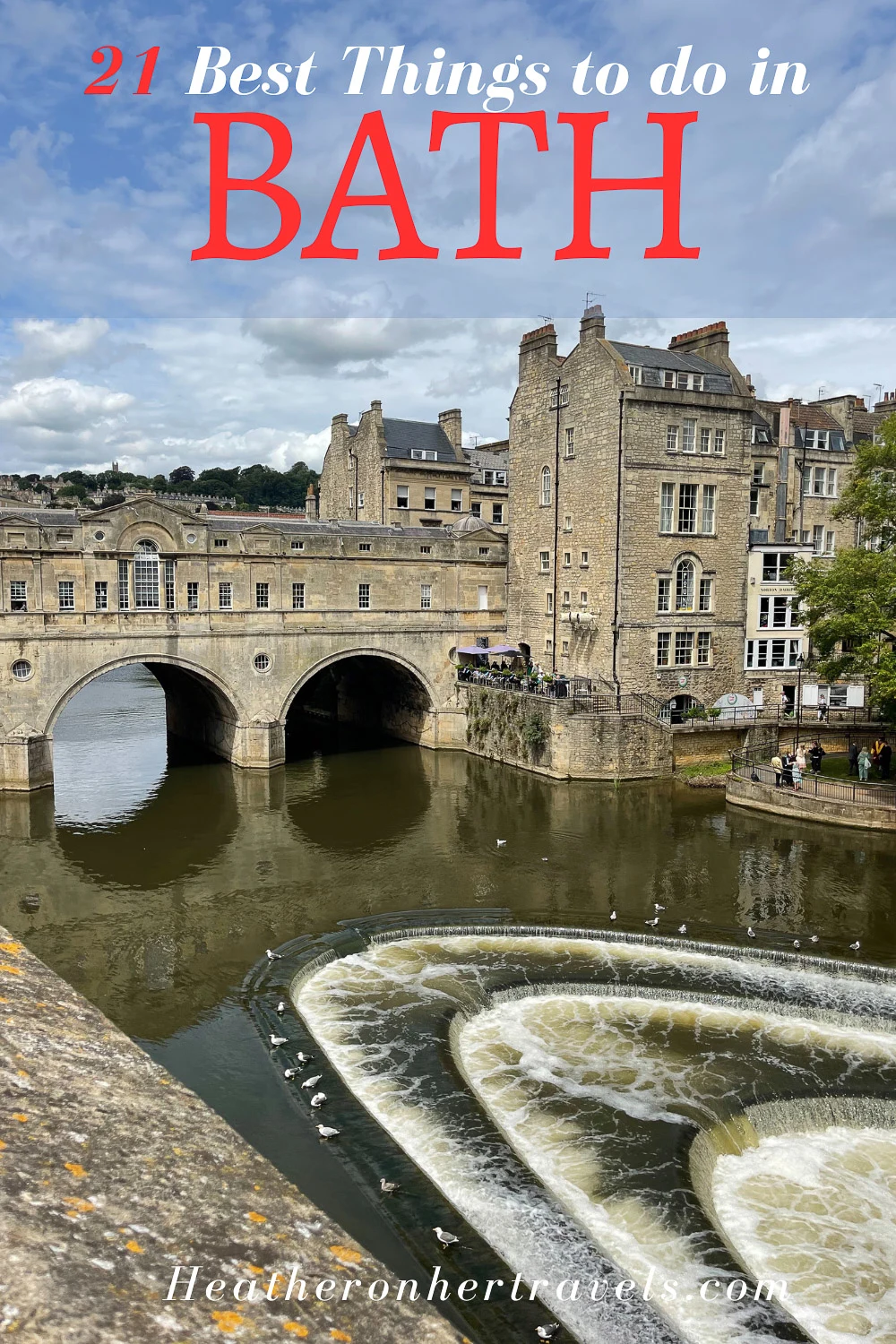
Plan your trip
For more information on what to do in Bath, check out the Visit Bath official tourism website
Some of the experiences in Bath were hosted* by Visit Bath
* More info on my policies page
This article is originally published at Heatheronhertravels.com

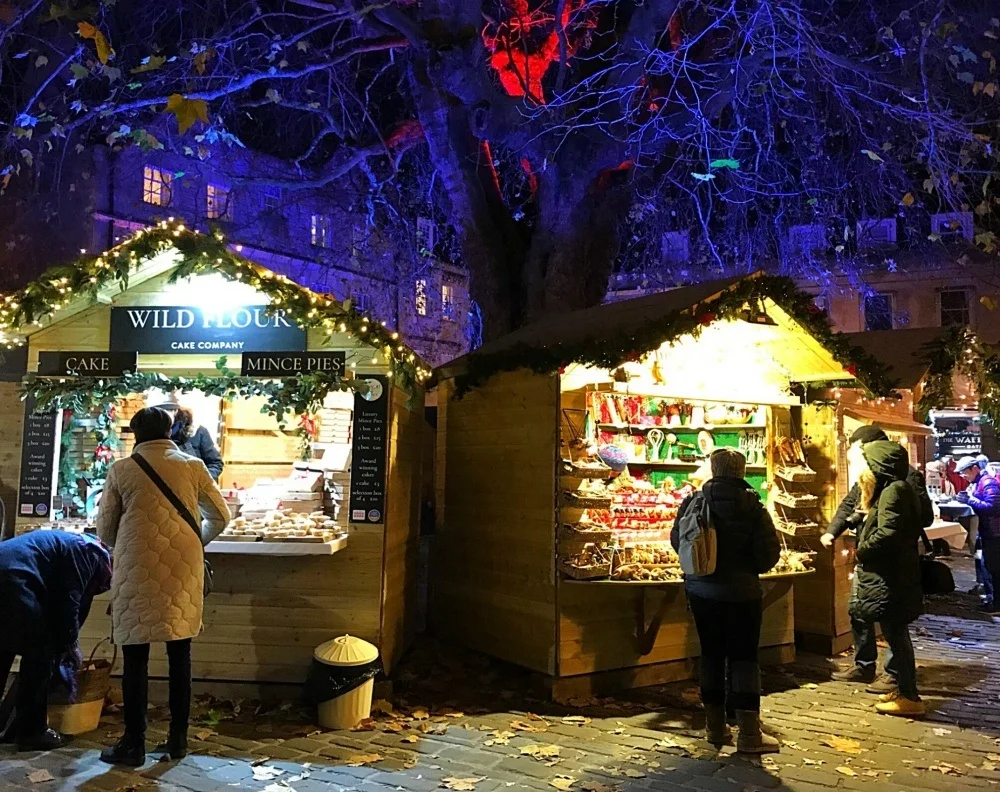
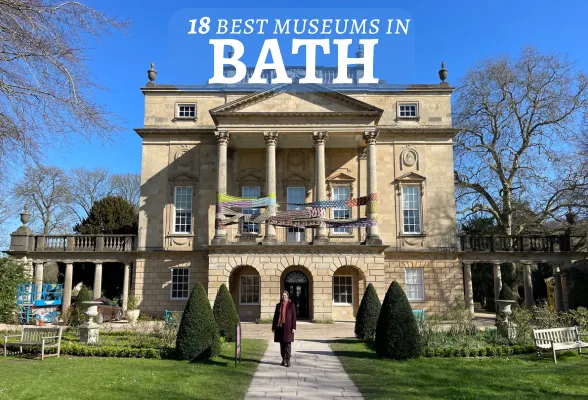


Hels
Wednesday 1st of May 2024
The Royal Crescent is my dream of a perfect terrace of Georgian townhouses (1770s), symmetrical, sweeping, gracious on the outside and facing a lovely park. But they must have cost a fortune at the time, and my family never had any money. So the Queensberry Hotel is the closest I got to seeing an interior.
Heather Cowper
Thursday 2nd of May 2024
@Hels Bath is quite unique in having so much Georgian architecture, with hotels that allow us to glimpse behind the facade and live the dream for a day or two.